#and how she felt about it going in and about the proces of filming itself
Text
Total Eclipse (1995) — A Movie Review by linklethehistorian (Post 3/4)
(Continuation of review placed under the cut for length and spoilers; proceed at your own risk.)
The Bad
Casting & Acting
I honestly can’t think of anything much ‘bad’ to say in this section that isn’t completely nitpicking; as I mentioned in the previous section, I actually think that on the whole, the cast was very well chosen and the skill level of the main actors is stellar. Even in regards to more minor and background characters, I can still only find a few of their performances to be subpar at absolute worst, and I don’t think that’s really anything worth talking about.
I guess if you asked me to go over the entire ensemble with a fine-toothed comb and find something I thought was genuinely off about one of them in any way, I would have to say that, based on the only existing glimpses we have at Mathilde Maute’s true visage through surviving photos, I think Romane Bohringer is far too conventionally attractive by the modern standard to really make for a convincing close physical approximation of the woman she is portraying, but that is truly me splitting straws because she’s too good of an actor to find any major flaws in her performance and I can’t come up with a problem among any of the others, either.
There is one moment I can bring to mind in scene 39 — during which Rimbaud and Verlaine are on a ship headed towards England — that I feel a single line of DiCaprio’s acting felt extraordinarily weak (particularly the moment in which he says “Oh…my God”), but I’m unsure if this is actually the actor’s fault, or that of the director’s for not trying to get another take and just going with that particular cut anyway.
Writing & Script
Alright, well…this section is probably going to be a bit of a difficult and messy one to tackle, unfortunately; you see, the problem I find as I finally sit down to write this section is that much of what really ought to be discussed in this subsection also happens to belong to another — given that a great deal of this film’s issues lie with things intrinsically tied to its notable lack of historical accuracy.
After a great deal of painstaking debating and procrastination by writing out literally every other subsection within “The Bad” except these two, though, I have finally come to what I believe is a reasonable solution: I will use this subsection to talk only about those issues which are the more broad and/or narrative and technical ones, and which are not intrinsically tied to the authenticity of the events and natures being portrayed, and I will use the “Overall Historical Accuracy” subsection to discuss those issues which are inherently bound to how genuine the ‘facts’ and characterizations within Total Eclipse tend to be.
So, with that settled, I guess let’s get started with my first topic of interest for this area: the script’s occasional inconsistency with its own chosen narrative.
Numerous times within this movie, the writing will initially state a certain ‘fact’ that it seems it would earnestly like its audience to believe, only to sooner or later completely contradict itself through another statement or action — and no, I am not talking about the times where it is intentionally using some form of disconnect between a character’s words and their actions to point out their hypocrisy; that definitely is something that is done throughout Total Eclipse and done very well, but those instances are always very clear in their purpose and in no way similar to the obvious slip-ups and oversights to which I refer here.
For instance, in the very first scene ever shown to us, there is a voiceover from Paul Verlaine quoting a certain part of A Season in Hell’s ‘The Infernal Spouse’ — a poem which, I remind you, was widely believed to be written from the perspective of Paul about Rimbaud — in order to tell us of the alleged reasoning behind his fascination with the young poet that we see on screen; even as we see the teen take a huge, obnoxious bite of an apple as he stares out a window, and then eventually strangely decides to leap mid-trip from the train he had boarded into a river far below, Verlaine assures us through his monologue of all of Arthur’s best and most redeemable qualities: his gentleness, his grace, his kindness and innocence — something that we essentially never get to actually see, whether in this scene itself, or the entire movie as a whole.
Yep, that’s right; if you thought that this line of dialogue would have any value whatsoever to the rest of the contents of this cinematic ‘masterpiece’, or even come into play at any point at all, you’d be wrong, because there is absolutely no part of Total Eclipse where we see this side of Rimbaud ever — or are even given any reason to believe that it exists, for that matter. (Unless, of course, you intend to count the two few-second long, dialogue-less moments in which he silently drops a few coins into the hand of a man on crutches in an alleyway, emotionlessly, to which the man barely reacts (in the third scene), or the time in which he briefly embraces and kisses Paul when they reach the ocean (in the thirty-first scene), but I would personally consider that to be something of a stretch.)
Indeed, if this movie was attempting to try out the inversion of the saying ‘show, don’t tell’, and prove to its viewers in doing so that such tactics really can work effectively in storytelling, then the results of that experiment backfired spectacularly in everyone’s faces, and only served to prove precisely why moves like that are generally considered a terrible choice in the first place.
…And if it wasn’t meaning to do anything of the sort, then I would strongly suggest to the creator(s) of the script that from now on they either learn to refrain from choosing quotes that directly conflict with their preferred narrative, or actually include some form of meaningful content that backs up the statement within the material they decided to use.
As for other examples of general writing and plot inconsistencies besides this, we can most certainly take a look at one particular line in scene 40, where Arthur says to Paul that he had chosen him as a partner in his creative endeavors for a reason, for although Rimbaud himself always knew what he wanted to say, Verlaine knew how to say it — and as such, he was able to learn a lot from him during their time together.
This line in and of itself would be all well and good, if it didn’t directly contradict another line of dialogue from much earlier in the film (scene 5, to be exact), where it is established firmly into this movie’s interpretation of Rimbaud’s character that he does not believe that poets can learn from each other unless they are bad poets, and that he does not think himself to be a bad poet.
If, as a matter of fact, this somehow is meant to be an attempt at pointing out some form of hypocrisy in the younger poet like they have done with his elder lover countless times before, then it is, quite frankly, a piss-poor one; after all, unlike in all of the other cases surrounding Paul, where the blunt teenager lost no time in calling out his lies and stating things for what they really were, Rimbaud is strangely never confronted about or even looked at a teeny bit differently by his partner for this conflicting statement at all — and this has nothing to do with their natures simply being different, as the Parisian author is much more than willing to accuse him of other things later on with far less proof, so the only truly logical conclusion one can come to about this scene is that the writers merely forgot they had ever established differently in the first place, and never checked back thoroughly enough to find out.
Likewise, in what feels like potentially a similar — yet also somehow nearly opposite — moment of incompetence, some of Verlaine’s dialogue in one of the final scenes of the movie (scene 62, specifically) references Arthur being at fault for Paul’s arrest, which, although very historically accurate, is neither established nor even remotely implied by this film at any point throughout it; as a matter of fact, given that the actual event that lead to Verlaine’s apprehension by the police was entirely omitted by Total Eclipse (more on this later) and replaced with someone barging into their hotel room shortly after Paul shot Rimbaud’s hand, anyone not already familiar with their true life story would be made to believe quite the opposite.
As such, the only way that this statement can possibly not be taken as a complete contradiction to the plot is if you choose to ignore all of the context surrounding it and twist the meaning to something less literal — such as that the older poet is saying it is his paramour’s fault that he ended up in jail because the boy tried to leave in the first place, thus “forcing” Verlaine into shooting him, or because he for some reason sees Arthur as the sole one to blame for the fact they were ever romantically involved to begin with, and their involvement was what indirectly lead to the arrest. Granted, although these may be absurd claims for anyone to try to make in his position, I suppose it really wouldn’t be beyond someone like Paul to do it anyway, but I do think that working this hard to wave off what is very clearly a major inconsistency in the writing and intended flow of the story is a little bit more pardoning than the writers deserve to be given.
Sadly, this apparent indecision with the tale’s direction and failure to clean up the loose ends of the abandoned plot elements is something that does not end with this one fumble alone, either, as throughout scenes 29, 42, 43, 44, 45, 46, 47, 48, 58, and 62, we are constantly presented with what appears to be many different leftover scraps of potential paths they considered taking in regards to the reason why Arthur eventually loses his ability and will to write; the most logical and close to historical accuracy of these — that the teen very simply became more and more jaded, disillusioned, frustrated and depressed throughout the course of his and Paul’s stressful, on-and-off again relationship and gave up completely in the aftermath of the end of it — is unfortunately the one which, although almost seeming to be set up now and again, is pushed down the most in favor of the more abstract and absurd “explanations” that are hinted at, such as Rimbaud constantly forseeing the near-end of his own life in Africa in the far future and having it start to consume him after he sees the boat to said continent while in London, and the most boring of all excuses, that it was something inexplicable that “just happened” for no particular rhyme or reason despite any of these other surrounding factors giving us every reason to believe that there was, in fact, a cause behind his fading inspiration and change of behavior.
Perhaps my ‘favorite’ scene of all in regards to this is the ridiculous one in which, shortly after having stated that he considered putting his affair partner in a position where he would literally be sent to jail just so that he himself could possibly eventually re-unite with Mathilde, Verlaine, in a moment of utter obliviousness to his own bullshit, comments that Arthur is no longer acting the same way that he used to, and asks him what’s wrong, and the script then chooses in spite of the obvious and most likely answer to have the young poet respond that it’s “the writing” that has changed him. Yeah — try and make sense of that one.
The ultimate reason for Rimbaud’s death, too, almost seems to have been something they considered at one point changing in some manner, as I find it odd that they thought it relevant to show and emphasize him getting an injury on his knee while exploring in Africa, coincidentally in the exact same place where he later developed the tumor that would take his life — unless, of course, they somehow mean to imply that the wound lead to it forming, which is, to my admittedly limited understanding of medical knowledge, a pretty farfetched claim, to be honest.
Barring that bizarre logic, I can only really assume that perhaps they may have originally considered having him simply die of some sort of infection, for whatever reason, before they eventually changed their minds and decided to be more historically accurate — or, who knows, maybe they never had any other sorts of plans at all, and rather than being a leftover bit they decided to keep from an earlier version of the script, the injury was just some unrelated sub-plot they intended to have all along; whatever the case, though, I personally think that it was a terrible decision to include it, as it just makes the entire situation a whole lot more confusing, considering the extremely convenient placing of the wound.
Something else that I find rather annoying and disappointing about this film is the way in which it handles Arthur’s brilliance as a creative; yes, as I’m sure you’ve already guessed from some of what I’ve said in previous sections and subsections, if for any reason you approached this film with the hope that it would not lean into the horridly overused “geniuses are all extremely quirky and raving mad” cliché, rest assured that you will be severely disappointed in every way imaginable.
From spending three scenes making sounds like and mimicking dogs and goats, to unzipping and pissing on someone from atop a table with a sword-cane in his hand, there are many wild, out-of-left-field, historically unbacked ‘antics’ which happen throughout Total Eclipse for seemingly no other reason than to paint the teen as a thousand times more insane and over-the-top than he truly was.
Unfortunately, this tendency towards theatrics over truth most often results in not only the dehumanization of Rimbaud (which I will discuss further in the Historical Accuracy section), but also just some very weird, awkward, inhuman, and/or incomprehensible moments as a whole.
I sincerely appreciated the attempt at showing genuine, heartfelt frustration from him in scene 32, after he wakes up to find Paul sneaking out of their shared bed to reunite with his wife, for example, but the way that they have him quickly kind of punch his own hand once in anger somehow honestly feels to me less like a sincere display of strong emotion and more an almost cartoonish moment where one would expect a villain to be saying, “Blast! Foiled again!”
Many of the attempts at quoting his poetry as directly as possible within the character dialogue, too, although perhaps noble in intention, falls to this same fatal issue of creating some very robotic, unnatural-feeling exchanges.
Scene six, for instance, where Arthur and his much older companion debate the general topic and existence of love, quickly becomes very inhuman, as the youth monologues the entirety of his famous “Love…no such thing” quote, pausing to allow Verlaine to speak his rebuttal partway through, but then completely and utterly ignoring what he says to finish the rest in a way that feels very awkward and out of place for any real human interaction — never to address his words for the whole remainder of the scene.
Now, I don’t dislike the inclusion of this quote or the overall concept behind this scene by any means, but it — like many other ‘reference’ scenes and lines throughout the film — would be much better off if the dialogue was instead written in such a manner that the characters were more paraphrasing the things they were giving a strong nod to than directly quoting them nearly word for word, thus leaving a lot more room for the special homages they wished to pay to actually fit and flow with the rest of the conversations around them naturally and comfortably.
Trying to overambitiously cram as many tiny bits and pieces of Arthur’s actual works and sayings into the film even where it does not make sense or is clearly being forced purely for the sake of it — such as distastefully making said poet deliriously ramble off random quotes from the Infernal Spouse on his deathbed, or having him go through an entire cringeworthy interaction with a random dog statue in Mathilde’s family’s home just so he can later say the “dogs are all liberals” line to her father — is just plain embarrassing to watch more than it is pleasing as an Easter Egg within the dialogue.
Perhaps my least favorite example of this is the way that after stabbing Paul’s hand in scene 27, the script then has Arthur state in a dull, cold, monotone voice that “the only unbearable thing is that nothing is unbearable”, which, although one of my favorite Rimbaud quotes, here just seems to come out of nowhere, and appears to have absolutely no real significance to the rest of the scene, besides that the writers apparently thought it would sound ‘cool’ and ‘edgy’ (and although I will grant them that it does sound edgy, I would sooner consider it terribly cringe-inducing than I would ever call it ‘cool’).
And speaking of their poetry, I sure would like to know what the creators’ obsession was with the Infernal Spouse; I mean, don’t get me wrong, it’s actually one of my most beloved Rimbaud pieces that exist, but I think that quoting it — what? — three or four times throughout the movie when so many others don’t get even a single homage (there are really only four or five referenced pieces that I counted in total) does seem a bit like overkill. I do have a theory on why that might be the case, but…well, we’ll get to that later.
It should also probably be noted that, although I am by no means an expert on Verlaine’s poetry (I know a good deal about his life story, even if not quite as much as I do Rimbaud’s, but I have primarily only ever read Rimbaud’s works thus far), I could not spot even one single reference to any of his works in the same vein as is done for his lover — though again, I could be mistaken.
While not necessarily related to much of the above, or even anything else I will be talking about here — besides perhaps just fitting into the ‘strange’ and ‘unnatural’ interaction theme in general — I also would simply like to say that I find it incredibly awkward that despite Verlaine and Rimbaud’s romantic and intimate involvement throughout pretty much this entire film, only Arthur is ever seen calling Paul by his first name, and never the other way around; in fact, Verlaine never even calls him by his last name at any point, either — an extremely strange writing choice for a film that centers itself around their affair and typically tries to present Paul as the more clingy, familiar, lovey-dovey and sentimental partner, but I suppose at this point we’ve already established that the lead creators of Total Eclipse rather suck at making anything that feels remotely sane or natural.
Even the cuts between scenes and the arrangement of them — all historical inaccuracies completely aside for the time being — often feel very whiplash-inducing, and while some of that is likely the editors to blame (as I explain in greater detail in a later subsection), the fault cannot be placed solely upon their shoulders, for the writers are very clearly a large part of the problem on this front, too.
The editors can certainly make things even worse, yes, through inconsistency and an overall poor exercise of their skills in the precise placement and style of cuts used, as well as sound-mixing and other audio and visual matters, but the authors of a script are ultimately the ones who most typically decide and control how a scene ends and which one comes next, as well as what takes place within it.
As I later state in the Filming & Editing section, there are many moments in this which are extremely hard to follow thanks to the placement of the scenes every bit as much as the editing later done to them; massive leaps in time are made on multiple occasions from one scene to the next, and all with little explanation other than the rare helping of a poorly placed title card of the year and location and, if you’re extremely lucky, a few throwaway, poorly explained lines indicating a vague idea of what had happened in between the two scenes to lead the characters to where they are now — usually not, though.
And some of these larger jumps in time aren’t just extremely hard to keep up with or unclarified in their events, they’re sometimes also emotionally jarring due to the complete, instantaneous mood change that happens between scenes — perhaps the most bizarre and unintentionally, morbidly hilarious of these being the time when the movie cuts from Arthur violently stabbing Paul in the hand in a bar and coldly watching him scream in pain to them being in the middle of having very intense sex in Arthur’s room and then fairly peacefully cuddling up in bed; that was definitely a very…interesting decision to make for the script, to put it politely. Truly, it was a…choice — perhaps even one of the choices ever made.
Additionally, there are many other scenes here that just probably shouldn’t have been included to begin with — not even necessarily because there is any deeply offensive content in any of them, but rather, purely because they don’t seem to serve any logical purpose other than taking up space as a bunch of mindless filler that mostly isn’t even that much fun to watch.
A lot of them are really just quite short, pointless, and (at least in terms of what constitutes the baseline for ‘normal’ content in this film, which isn’t always saying very much) mundane in nature, and leave you feeling as if you’ve walked away with absolutely nothing particularly gained from seeing them, but even the two main examples I can think of that seemed like maybe they were at least trying to establish something vaguely important just…fell completely flat on their faces and left me feeling extremely confused, which is why they ended up in this ‘meaningless’ category from the start.
One of these is scene 41, in which Paul and Arthur have a brief discussion about their greatest fears; one would think, given most of the focus of this scene being placed solely on this part of the conversation, that this little exchange was meant to be something profound and deeply important to their characters, but the reality sadly ends up being much more shallow and befuddling. I mean, perhaps in the eyes of the writer, this was meant to be some grand reveal that deepened both of their characterizations greatly, but the audio is so soft and poor-quality here when it comes to Thewlis’ lines that Verlaine’s answer to his lover’s question is difficult to truly make out, and the only thing that one can seem to make of it (which I discussed earlier in the “Writing & Script” subsection of the previous section) is completely absurd and impossible to take seriously, and as for Rimbaud’s revealed fear — “That other people will see me as I see them” — setting aside the apparent contradiction with the fact that Arthur has never really expressed much care of how others perceive him, although it at first does seem like an interesting statement with a lot of potential for depth if expanded upon and explored, it is unfortunately very quickly thrown away for a subject change the moment it is said, and then never brought up again.
It is almost as if the script considered for a moment that it might like to explore its characters and add a deeper layer of humanity to them, but then realized that it would require too much care and effort and just decided to toss out some surface level, throwaway lines that people can interpret however they want and leave it at that.
The deeply overdramatic scene 47 is the only other one out of this bunch that I found to maybe have been intended to have some deeper purpose beyond just showing that he had developed writer’s block, given the enigmatic nature of the scene and the apparent ties to that whole strange “foresight into one’s own death” subplot for Arthur, but at the end of the day, I just find it too confusing to make a lot of sense of the rest of the strange elements within it; what exactly is that spillage that suddenly appears out of nowhere to ruin the page he is working on — is it ink? If it is, I don’t know where it came from, and it’s awfully red for that to be the case. Is it blood? That doesn’t really make sense; he doesn’t seem to be visibly injured in the scene. Are they suggesting he’s hallucinating? Is it supposed to be in some way tied to his vision of Africa and the end of his life? Is it meant to be his blood? He didn’t die from anything relating to blood loss, really — although I guess some bone cancers are technically tied to blood. I don’t know. I really just found the whole thing extremely confusing and honestly unnecessary to have as some sort of barely addressed supernatural sub-plot in general.
Maybe the feelings about that last scene is just me, though; maybe some people enjoyed it. All I know is I think it detracts and distracts from the real issues that were actually going on in his life at this point in time.
And lastly for this subsection, while we’re on the subject of things that are way out of touch with reality even within the rest of its own narrative, I’m not at all fond of the way that this movie’s ending was written. Don’t get me wrong — having Arthur’s spirit (which presents itself at the same age as when he and Verlaine were having their affair) visit Paul every night after his death and even come and kiss his hand in broad daylight at the bar after Isabelle leaves is an extremely romantic and happy ending, all things considered, but that is exactly why it is terrible; part of the more intricate details of this I will be saving to discuss in the Overall Historical Accuracy subsection, but even with that and all of the lies thrown into this film to make things look more romantic and forgivable aside for now, the bottom line is that this story should by no means have a happy ending. It absolutely should not end with the implication that because Paul did one decent thing to preserve Arthur’s legacy, then that suddenly erases years of terrible, horridly selfish actions towards both him and Mathilde and means that now he deserves to be loved and respected by — and even find everlasting happiness with — the teenager that he literally tried to murder.
There are a lot of things I would love to say right now in regards to this completely wild and vomit-inducing decision, but since I’m setting all of that aside for the Historical Accuracy subsection, for now I will just have it suffice to say that I think it is absolutely batshit insane.
Costumes & Scenery
Much like with what I stated in the “Casting & Acting” subsection, I don’t really have a lot to say in this category that isn’t praise; the only thing I can truly think of at the moment that I took any issue with in regards to any of this was very simply that I saw no moment throughout any part of this two hour film in which Rimbaud wears his signature bowtie — you know, the unique style he literally invented?
Yeah, it’s a minor thing, but I’m still kind of peeved about it, to be honest; surely, it wouldn’t have been that hard to achieve.
Music & Sound Effects
My sole complaint here is something that only genuinely happens twice: there’s this particular sharp, brief swell in the music that happens both in the library while Arthur is struggling to write in scene 43 and later when Paul purchases a gun and is loading it at a table along the streets of London in scene 53, which almost mimics what one would expect to hear in a horror film, and thus induces the same expectation of an upcoming jumpscare or something truly horrifying about to happen.
You could perhaps try to make the argument that this is at least fitting for the latter moment, given that Verlaine is about to return to the hotel and shoot his partner, but the prior usage of it in an otherwise relatively uneventful scene and the lack of clearly established pre-meditation (since they imply the drunken Parisian only intended it for himself originally), coupled together with the scene change and the rather long conversation between the loading of the weapon and the actual shooting, just makes it all feel very overdone, deeply anti-climactic, and just plain awkward, cringeworthy, and out of place.
Other than that, everything is honestly fine in this department.
Editing & Filming
I really don’t want to be unnecessarily harsh on the camera crew involved in this endeavor, as I don’t know how many of the decisions for what to do with the different scenes were actually theirs to make, if any at all; yes, there were a few moments here or there where I thought things could have been done a little bit better than they were, and a handful of times when I thought the recently acquired film maybe should have been rewatched enough to realize that the actors should have been directed to speak a little bit louder, but on the whole I don’t really want to place blame on people who were clearly doing their best to capture what they were told to capture, quite possibly the way they were told to capture it.
As far as I’m concerned, however, the same excuse cannot really be made for the editors and those who were tasked with overseeing the editing process — and this, apart from the writing and the historical accuracy, is unfortunately where Total Eclipse tends to fail the most.
As I mentioned very briefly before, there are some instances in the supposedly ‘finished’ product where the editors seem to have decided to give up halfway and awkwardly transition or just outright cut to the next scene when the main characters are clearly still mid-dialogue. Not only that, but the scene changes in general — comprised of a very strange mix of ordinary scene cuts, unexpectedly abrupt jump cuts, and extremely awkward fade transitions — are often deeply confusing to follow, if not entirely jarring to experience; thanks in part to the writing just as much as the editing, scenes often feel very incomplete and/or short enough to leave the viewer either wondering what their point was or give them a sense of whiplash as the location or emotions of characters change vastly and without much explanation from one moment to the next, and even the occasional — and devastatingly sparse, for a movie that features a lot of travel across many cities and countries — title card to tell one where and when a scene takes place sometimes only seems to appear when one is already halfway through a scene, rendering its usefulness in clearing up any shock or confusion almost moot.
Even for someone as intimately knowledgeable about the true events this film is based on as myself, Total Eclipse at times proved to be extremely hard to follow and keep up with just what exactly was going on — and although this is partly due to the many historical inaccuracies involved and the creative liberties taken within the script, the editing crew and their overseers absolutely did not help by any measure with the bizarre choices they made when putting all of the material they had together into a complete movie.
All in all, I genuinely believe I could have gotten a better job done with the editing just from spending an hour playing around in the iMovie app, with no professional degrees to my name, than the actual editors were able to manage in God knows how long.
‘Mature’ Content
Listen, I know this movie is apparently categorized as an “erotic historic drama”, and I’m not saying there’s anything inherently wrong with that; in fact, I’ve already stated before that I genuinely do think that a few of the more sexually charged scenes legitimately contribute something of value to the film, in terms of establishing character motivation and personality, and sometimes even historical accuracy (we know that Rimbaud did, in fact, briefly streak one time as depicted in scene 15, more or less).
…Even so, do the main three characters — especially Rimbaud and Verlaine — really have to be in some state of undress as often as they are?
Seriously, the amount of times the characters are either half-naked or just completely nude in this film is venturing way out of the realm of just uncensored honesty or even an attempt to be ‘sexy’ and into just plain absurdity; there are many times where Leonardo DiCaprio and David Thewlis are very clearly just shirtless purely for the sake of being shirtless — even in scenarios and conditions which, quite frankly, would not lend themselves well to one having such few layers of clothing on their body, given the supposed location and time of year in which these scenes are taking place.
There are also a few times in which the characters are in completely compromising positions or situations for reasons which are completely inexplicable, other than that the film creators were obviously just trying to find any reason or opportunity under the sun for which to disrobe someone; for example, there is one particularly telling instance in scene 52, where Arthur arrives at a hotel in Brussels to reunite with Paul, and is guided to his room by a staff member who, upon knocking for him, is told to “come in” by Verlaine, yet when the door is opened, said older Parisian poet is standing almost right in front of the hotel room’s door, stark naked, pouring water over his head as if to take a bath — making absolutely zero efforts to cover himself for what very well could just have been the staff alone coming to talk to him about something.
The entire rest of the scene also takes place with the elder man making no efforts to even grab a towel after getting out of the bath, and then getting into a physical brawl to the point of wrestling in the buff with a fully clothed Rimbaud along the floor even in an entirely non-sexual context, because of course it does.
Perhaps it is absurd, from your point of view, to complain about these sorts of things in a film that places itself under such a category as “erotic” anything, and if that’s the case, then sure, that’s a completely fair way of looking at it; still, at least for me, pointless nudity and sex scenes that add nothing to the plot even from an emotional perspective — especially in a film that is supposed to be telling a real life tale about people who actually existed in this world — equals an automatic detraction of points from the movie in question, as a truly good film would not have to resort to such cheap tactics to keep a viewer interested and entertained.
I suppose some watchers might find it refreshing that it is actually the male characters who are primarily getting treated this way this time around, as it is typically the female ones to whom this is done in most cinema, but as for myself, I personally find it just as ridiculous, awkward, and unnecessary regardless — whether it calls itself an erotic drama or otherwise.
Overall Historical Accuracy
Alright, before we get into the very biggest issue with the movie’s script and all of the little historical inaccuracies that are connected to it, I first want to take the time to address just a few small ones scattered here and there throughout the film that are entirely disconnected from the main subject we’ll be talking about afterwards.
Unlike the more major problems we’re saving for a little bit later, most of these things I’m going to be mentioning don’t have any extreme plot-altering powers, in terms of the bigger picture that viewers are going to take away with them when the credits roll; they’re merely factual fallacies and omissions that, although minor in impact, I still thought were kind of unhelpful for anyone who might be tuning in to Total Eclipse with the hope of actually learning something.
You’d think with a movie so incredibly bold and confident about having its facts straight that it doesn’t even just claim to be “based on a true story” as most do, but actually outright states over text before the film opens that “what follows is [Verlaine and Rimbaud’s] story directly taken from their letters and poetry”, the actual contents of the film, then, would have to be something phenomenally well-researched and extremely close to the real events — even if a little bit of extra dramatization might be sprinkled here or there; that’s really not the case, though.
Despite the much braver and frankly somewhat lawsuit-inviting statement, the vast majority of even the most basic points about their lives and the time the two poets spent together are greatly misrepresented by the writers — let alone the finer and more intricate details of it all.
Even the facts surrounding Rimbaud’s death towards the end of the movie are…murky at best, in the way that they are presented there; I have already explained some of this — mostly in regards to the potential for audience confusion, thanks to an unusual decision to write in an injury to Arthur’s knee, in the exact same spot as the tumor that will later develop and take his life — in the “Writing and Script” section, but there is far more to it than just what was spoken of back then.
Yes, while we are admittedly told that Rimbaud developed ‘a tumor’ in his knee, that his leg was amputated, and that regardless of the operation, he became even sicker and eventually died, what the film fails to mention in any capacity is that this so-called ‘tumor’ was actually bone cancer (presumed osteosarcoma), and that the reason the amputation did not save his life is that neither he nor anyone else was even aware it was cancer until after the surgery was over; in the beginning, he had honestly assumed it to be nothing more than arthritis, and this is why he didn’t think to seek any help until it had become rather unlivable — then, once he did, he was misdiagnosed by two separate doctors before he was finally operated on under the assumption it was actually tubercular synovitis. By the time that any truth in the matter had actually come to light, the damage had already been done, and no amount of amputating or rest would have saved him.
I’ll make mention here, as well, that I’ve seen another person once bring forth a complaint that Arthur never had a point in which he returned home to the family farm in Roche between the amputation and his death, but I cannot personally find anything which definitively supports this claim within any of my own resources that I’ve acquired over the years; as far as I can see, the order of those events in particular as they are presented in the film actually seem quite accurate to reality, so take that information as you will. If you, yourself, wish to do further research to see if it is indeed the case, then feel free; either way, I thought it was at least worth a single note.
Another, topically similar head-scratcher for me which I cannot recall being factually supported in anything I’ve ever read thus far is this purported ‘tumor’ that Verlaine claims to have in his own knee in Total Eclipse, when he is told of how Arthur died; either I am just forgetting something and have not looked thoroughly enough into things (which I grant is entirely possible, seeing as that Paul is someone I have researched admittedly a tiny bit less than Rimbaud), or this is a completely made-up issue they added purely to mirror the last physical condition of his lover for some reason.
Some other befuddling omissions and inaccuracies include entirely failing to ever make even so much as a passing reference to the fact that Verlaine actually took up teaching professionally during the time that he and Arthur lived in London — choosing instead to have him sit around and bemoan the dwindling of their personal funds as he continues to rely solely upon the money he had claim to through his fractured marriage with Mathilde — and making Paul claim to Arthur that he converted to Catholicism after the divorce with his wife was finalized, rather than in prison as was genuinely the case (and which, perplexingly, was sort of previously established in an earlier line of dialogue to begin with).
I would also like to have seen Mathilde’s father express a bit more sweetness and protectiveness over his daughter, for, although his character is mostly serviceable enough in this movie for the part he holds, it was a well-known fact that Mathilde’s parents were both very loving, and especially that her dad was a good man who was greatly concerned with her personal happiness, wishes, and well-being, in a time where that was admittedly rather exceptional and extraordinarily uncommon on its own.
And while we’re speaking of parents, while, again, I don’t want to dive into another massive history lesson here, I would like to say that I don’t think Rimbaud’s mother is portrayed accurately here at all, compared to how she was said to be in real life — both by Arthur himself and by basically anyone who had ever even briefly met her; by all historical record, Marie Rimbaud was a cold, humorless, unsympathetic person whose husband (supposedly described to be her exact opposite) could not even stand to be in the home with her for more than a few days per year — if that — after their first few months of marriage, and permanently left her after six years, never to see her or their children again.
To her children — and especially Arthur, whom had an extra burden placed upon him when, as a young child, he had already been labeled a genius by his teachers — Marie was callous, cold, strict, controlling, and (especially physically) abusive, sometimes even forcing them to go for days without food as punishment if they did not perform well enough in school.
She did not, by any means, approve of Arthur’s career of choice and absolutely did not feel even as mildly sympathetic to him and his plights or feelings as this film seems to want you to believe; in fact, given that on his deathbed she actively chose to forcefully pull his sister away from visiting him at one point, and even went so far as to go against his final wishes for his burial, I hesitate to think that she would’ve cared to follow him out and watch him leave the family farm on his final days, either.
Anyone who had ever met her — including some of Arthur’s teachers and interviewers later on in her own life — tended to fear her and either considered her a terrifying, violent, or just plain unenjoyable individual, if not all of the above.
Now, I believe that just about covers all I have to say in relation to the smaller things, so, without further ado, let’s sit down and have a nice little chat about the real trouble with Total Eclipse and its very poorly written plot.
Considering how little I know them, I truly don’t want to assume the worst when it comes to Agnieszka Holland and Christopher Hampton’s intentions for the script — and, by extension, the film that was built upon it; nevertheless, there are some things in this film that it is just very hard to give them the full benefit of the doubt on, when they so boastfully proclaim that they have been perfectly faithful to the true story and that everything that happens in their adaptation of it is taken directly from Rimbaud and Verlaine’s poetry and letters, yet so much of it is either completely made-up nonsense with absolutely no basis or majorly re-arranges events in a way that it completely changes the narrative with which an uninformed audience is going to walk away.
(And granted, the original screenplay that this movie was made from was written in the late 1960s, so information then was likely not as widely available as it is today, and thus, it does leave a little bit more slack for any of Hampton’s personal failures at that time (although some are still very inexcusable basic facts that definitely would have been out there within reach), but the same cannot truly be said for the movie itself — as, even if some details perhaps still weren’t available in the same way that they are today, at least the vast majority were out there in some capacity, and they had more than enough money and means to hire actual historical experts to do research and seek the truth out for them.)
I can’t — and thus won’t, as I don’t want to place words in their mouths or make any unsavory assumptions on this matter that may be untrue — begin to guess what possessed the creators to make Verlaine the true protagonist and narrator of this story, but regardless of what their reasons may have been, I can say with the utmost confidence that it is almost certainly what caused all of the greatest downfalls of this film, plot and accuracy-wise.
You see, the big challenge that always comes with telling a story from one particular character’s point of view is two-fold: 1) that that character you chose is always going to be biased in the way they tell their tale and how they view other characters, and 2) that, at least typically speaking, once you make your character the narrator and the main protagonist, it becomes tempting to want to paint them in a better or more forgivable, sympathetic light so that the audience will be at least a little more likely to root for them.
Now, this isn’t necessarily a problem when it comes to fiction, because in fiction, the writer is free to present a story from whatever perspective they want and make their characters — however either ‘good’ or ‘bad’ they may actually be based on their actions — as likable as they desire, and that is perfectly fine, as at the end of the day it is no one but the author’s invented story to tell; however, when it is a story about real people and their actual lives, the situation becomes a bit hairier.
Not only is it very difficult to tell a factual story from a factual person’s point of view and represent their thoughts fairly and accurately, unless their feelings on the matter are exceedingly well documented, but it will also inevitably do some form of disservice to someone else involved in that tale every time.
There is a famous saying that there are two sides to every story, but I disagree; there are not just two sides to every story, but at least three — even if there are only two people involved; after all, there is the perspective of Person A, the perspective of Person B, and then also the perspective of anyone else who might be on the outside of the situation looking in — the person who probably has neither of the biases that the involved parties have, but whom, at the same time, might also be lacking in some key information that the other two both possess, depending on the circumstances.
Naturally, when telling a true story, the ultimate goal is usually to be able to present a little bit of all three — that is to say, to show things largely from the unbiased outside position, but also use the information we have been given of both sides’ thoughts and motivations, if available, as well, to establish and represent those feelings and ideas and do justice to them as much as we can.
Total Eclipse does not care about any of this, though; rather, it seems to be under the impression that simply because Verlaine was the longer-living of the two men and he did the one simple courtesy of preserving and publishing whatever poetry his late former paramour had left in his care, this means that it is acceptable to tell the story of their relationship entirely from his perspective and that no harm could possibly be done in doing so.
However, that is a logical fallacy, and a very harmful one, at that, to the actual victims of the real life happenings that went on during those years — especially if you intend to make Paul look at all like the ‘good guy’ within the dynamics of either of his relationships, or even only ‘equally as guilty’ as Rimbaud.
Of course, I won’t say that presenting Verlaine in such lights from his own point of view would be in any way an inaccurate depiction of his thoughts, because from everything we do know about him, this was his point of view; based on many of his actions and letters and other recorded bits of information, he did appear to have a massive victim complex in every situation that he himself had caused, constantly jumping back and forth from blaming either his wife or his extramarital partner for all of his bad behavior — often dependant on whomever he happened to be with and/or wanted to appease at the time — throughout the affair.
Even further supporting this already clear observation is Rimbaud’s famous The Infernal Spouse, from his work A Season in Hell, which, as stated before, is widely believed to be written from the perspective of Paul about Arthur himself; in it, the speaker (whom would be Paul) ultimately paints himself as the poor, helpless, ‘once-respectable’ victim of a demon who came to him in the guise of a youth (whom would be Arthur) and seduced him, making his life a living hell where the speaker has “no choice” but to continue down the terrible path of ruin.
If I didn’t know any better, I would almost assume that this movie was, for whatever reason, written not just to be told from the Parisian poet’s perspective, but specifically and solely through the lens of this one particular poem, if the narrative of said work was taken entirely at face value — yet, this is clearly not true, as even that piece (including some excerpts from it I discussed before, which were used within this very movie) leaves more room for charity towards Rimbaud and his overall portrayal than this film does.
Whereas The Infernal Spouse still speaks at times to his kindness, charity, grace, and goodness — among other not strictly negative human qualities present within him — in spite of itself, Total Eclipse’s version of Rimbaud is, as I’ve said in prior sections, a jaded, sadistic, rude and relatively heartless edgelord who may or may not be a complete sociopath, not to mention the ultimate source of all conflict in everyone’s lives.
Meanwhile, Verlaine is presented as, yes, a violent drunk who abuses his wife and child during his moments of insobriety, but one who is genuinely remorseful after every action and who, no matter how thoroughly unlikable his actions may make him at present for most of the film, is heavily implied to have only become a drunkard thanks to Rimbaud’s influence and presence in his life, and ever before that — and any time the teen was out of his life at all, for that matter — was a good, kind, and loving person who merely didn’t know how to exist without someone by his side and just couldn’t help falling in love with multiple people.
Oh, but those might seem rather broad-sweeping and loaded claims without getting into any details, so let’s go through the film bit by bit and talk about all the big and little changes and omissions that make it turn out that way, hm?
Aside from the dichotomy already mentioned twice earlier of the quoting of an excerpt from The Infernal Spouse in the opening scene — which speaks of some redeeming qualities in Rimbaud that we will never even truly get to see throughout this entire film — the first major mistake made within the script is the decision to include so much of the second scene so early on within the movie.
Now, of course, I’m not talking about from a narrative perspective; naturally, it does make sense that if one is telling a story from the point of view of Paul, then starting the movie out with a glimpse into the time after Rimbaud’s death when he meets with the young poet’s sister not only is a great way to attempt to generate intrigue right away, but also provides an excellent way to transition back into the past by having Verlaine begin to reminisce on the things they had once done together, but in regards to trying to present an unbiased story that will allow the audience to form their own conclusions at the end based on actual facts, I do feel it is a little bit manipulative — whether intentionally so or not.
After all, if from the moment we are first introduced to this older Parisian poet, we instantly see him establish himself as this selfless hero of a man who helped Rimbaud along in his ambitions as a poet even to the complete detriment of his own once-greater notoriety and career, it will from that moment forward already be seeded in our minds that we are intended to see him as such and remember it above all else, despite any of what we might see in the scenes that will follow; it makes it much harder to be unbiased towards him when the film is immediately waving it in our collective faces how much he sacrificed and suffered for the man that now isn’t even around to enjoy his own success.
Skipping past all the pre-established discussion surrounding the writers’ decision to add in all of the unfounded, extremely awkward, and cringeworthy animal imitating and how that is a poor portrayal of Rimbaud’s genius, we next arrive at the dinner scene between Arthur, Paul, Mathilde, and her mother.
There are quite a few strange and, as far as I could tell, unbacked claims that are made here — not least of all the statement from the teenage poet himself that his mother was “quite happy” that he had joined Verlaine in Paris to do writing work with him, when as far as we are aware, she was actually quite opposed to her son’s job of choice; I suppose the intended implication, then, was that she was just happy to get rid of him in any way she could so long as she didn’t have to pay for it, because he was nothing but trouble — and while that may not necessarily be inaccurate to her actual personality or thoughts towards Arthur in real life, regardless of whether it is or isn’t, it is still a bit confusing within the context of the movie, as this attitude is not really well expressed in any scene where she appears.
On the flip side, when the boy’s father is mentioned, he dryly makes a response saying that his father’s primary occupation is drinking and that they (the Rimbaud family) haven’t seen him in ten years; the latter part of this is absolutely true, as Captain Frederic Rimbaud left after the last of the children was born, and it does somewhat make sense to show Rimbaud having a relative disinterest in getting back in touch with him given that we know neither the children nor the father himself ever seemed to care much about reconnecting, but the claim about him being a drunkard is, to my knowledge, mostly unfounded, and I find it particularly unusual that they go so far out of their way to include this comment and have Arthur show a cold disdain and strong sense of negativity behind his words when talking about drinking — as though it were a bad thing in his eyes — when he is henceforth after this scene portrayed as someone who himself enjoys drinking and is not only happy to start a relationship with a man whom, after meeting him, remains almost perpetually drunk, but even later tries to talk said man out of quitting.
And lastly, the claims that Arthur lied about his age to Paul in his letters by saying that he was 21 is, to my knowledge, completely speculative and entirely invented by this film; granted, given that the vast majority of all correspondence between Paul and Arthur prior to their first meeting — save for one or two paraphrased lines of one letter that Verlaine claims to remember existing — was lost forever to history, there’s nothing to say that it didn’t happen, but there’s also no real reason that I know of to believe that it did.
So, why, then, was the decision made to add this line? Well, I think it may have been for the sake of audience comfort, in a way — just as was the choice to reinforce that Mathilde was 18 (stated in scene 14) when Arthur arrived at their home, and the creative decision to have Rimbaud be the one to make the first physical move on Paul (shown in scene 21) when in reality that sort of thing is completely undocumented and therefore anything shown of it will always be speculative; if we’re assured that Verlaine is married to an eighteen-year-old woman and it’s never stated when they married, if he thinks Arthur is an adult man when he invites him into his home, and if even after knowing better, Rimbaud — the sixteen-year-old — is at least the first one to make a physical move on the adult, well, it’s probably a little bit less creepy in the eyes of the audience, right? Especially if their ages are really only brought up once or twice — or, in the case of Verlaine, not at all (he was 27 historically when Arthur came to live with him) — and then never mentioned again for the rest of the two-hour film.
I know that there will be people who will likely want to use the “it was a different time” argument here to push away the disturbing factor in all of this, but not only do I believe that this argument is absurd — as if you truly believe something is wrong according to your personal moral compass, that should not change based solely upon what may or may not have been considered “acceptable” at the time — the simple fact of the matter is that things weren’t as ‘different’ back then as you might think, anyway; the age of majority was actually much higher back in the late nineteenth century (hence even Total Eclipse itself having Paul call Mathilde, his wife, “still just a child” and Arthur reply “so am I” in scene six), and most people did not marry until both parties were fairly late into, or at best halfway through, their 20s.
Any way you want to slice it, Paul Verlaine’s only dating history throughout his adult life (a 16 year old girl at 25, a 16 year old boy at 27, and purportedly a 17 year old boy at 32) was disturbing according to most people’s moral compasses, even from the perspective of someone from back then. It is a matter of historical record that when the poet’s mother started pushing in fear for her own life and desperation to have him gone (more on this later) for the at-the-time 24-year-old Paul to find someone to marry and her first suggestion happened to be that of a 14-year-old Mathilde, the courtship that eventually ensued when Mathilde was 16 and the proposal for marriage 8 days later heavily concerned the girl’s father, and he did all that he could to prevent it, as she was much too young for such a thing; it was only because Verlaine was friends with the girl’s brother that he eventually managed to worm his way into the rest of the family’s confidence and approval, and perpetually forced the father’s hand through continuous pressure from them and Verlaine’s mother that he eventually caved and gave consent to both a relationship and then later a marriage under the belief that this was what his daughter wanted, who she loved, and who would make her happiest — which, based on Verlaine’s wishes, would have occurred fairly soon after had several events not taken place to postpone it.
As for Verlaine, just as I stated earlier, there are very few times when he is shown to have been cruel to anyone outside of a very clearly drunken state — and in those two moments that he is, it is still rather ambiguous whether or not he has perhaps had a little bit to drink beforehand; we can, of course, assume that he has not by the very coherent way that he is speaking and his much steadier and more refined mannerisms, but at least as far as scene 10 goes — in which, after Mathilde suggests possibly finding somewhere else for Rimbaud to stay, her now rather angry husband goes on a rant about unfairness and how if it wasn’t for the war and everything he’d been through because of it, they wouldn’t even be living in her parents house to begin with, then throws a book across a room — the situation is made a little hazy by the fact that we saw the two poets drinking in a bar not too many scenes prior. Without anything to indicate whether or not these scenes take place during the same day, I find it rather impossible to say for certain.
Regarding the other scene, well…we’ll talk about it when we get there, but I do find it ironic that despite him having been historically recorded as drunk at that time, it is the only one in the film besides scene 10 where he is probably written not to be.
Immediately after scene 10, we once more jump back into the absolute absurdity of his teenage affair partner’s portrayal; instead of being honest that Arthur had only ever been brought into the home on a temporary stay while Mathilde’s father was out on a hunting trip and that by this point in the genuine reality, at least by all accounts of anything that I could find, he had already been moved out of the house and into a small apartment paid for by Paul and their other literary friends, Total Eclipse chooses to make it so that Mathilde’s father comes home in the middle of the boy’s stay without warning and there is a confrontation in which Rimbaud is quite rude to the man, until he is unceremoniously thrown out of the house — at which point Verlaine chases after him in the rain and hurriedly finds him a place to stay.
Of course, I am not saying the youth was actually a perfect house guest, or that he didn’t cause any amount of trouble ever or garner some form of disdain from his hosts in the house de Fleurville — far from it; certainly, Mathilde and her mother took a strong disliking to Arthur which only grew the longer he stayed there — not just because they deemed him unrefined and more trouble than they cared to handle, but also out of jealousy of the fact that Verlaine would spend almost all day every day at his side out in the city — and thus, hoping to be rid of him and make Paul dedicate less time to him, they arranged for Mr. Theodore Maute de Fleurville to come home sooner, so that Paul would feel obligated to put him up elsewhere before he arrived.
The point I am trying to make, though, is that things did not happen in the way, order, or even entirely for the exact reasons that this movie presents it — for, by all known sources that I could uncover, Arthur was never meant to stay there permanently, he stayed a bit longer than was properly communicated through the scenes we were shown and a lot happened that was not discussed regarding him and his now-mentor (some of which we will be talking about later), it was absolutely not by random chance or without warning that Mathilde’s father arrived home, and Rimbaud and Mr. Maute de Fleurville never even really met at all.
Scene 16 itself is actually fairly true to historical fact, minus the exchanging of Mathilde’s then actually-visiting brother for her parents as the ones who noticed the ruckus upstairs and came to her rescue during the abuse, but it is missing a lot of context and clues as to the passage of time due to the rushing of — and changes made to — the main plot.
In reality, this fight had occurred quite a while after Arthur had been moved to his new apartment, and while she had never looked kindly or understandingly upon the teen’s poverty, the harsh comment she made which sent Verlaine over the edge was likely more fueled by resentment and jealousy than anything else — as, despite her expectation and hope that removing the boy from the household would lead to her husband spending less time with him and more time with her, it had actually just backfired into the older man deciding that he would rather start spending nights over with him and often not even come home at all for days or weeks at a time.
In regards to what the argument was about, they also fail to leave in the context that although Rimbaud did feel the need to steal books back in his hometown in order to be able to read them because he could not afford differently, he also did try as a general rule to return them after he was done, and it was only if he felt there was no way to do so without getting caught in certain situations that he would choose to sell them instead for money — thereby making him look infinitely worse than he actually was in this situation.
They also have Arthur explain to Paul in Scene 17 that after a somewhat dubious but not altogether unlikely life event, he had “decided to be a genius”, but this is something of a misquoting, as the actual letter to a friend that they are referencing through this scene did not say he desired to be a ‘genius’ — which he had already been dubbed for better or worse since childhood by his teachers, as we will discuss later — but rather, a ‘seer’.
Some might say that these two words could be more or less synonymous with each other, but I disagree; being a visionary is not necessarily the same as being a genius or vice versa, and furthermore, Rimbaud himself has described in his own words what he believes it means to be a true ‘genius’ (essentially being able to recover a child-like sense of wonder and heart at will), and it does not match up at all with the context of any of what this movie purports — nor even with the standard definition of those who had given it to him in the first place, so using it here just feels strange and deeply out of place within his actual philosophy, and seemingly only exists to sound overly conceited.
Scene 19 is just…completely off the rails with its insanity.
Yes, I will grant that Rimbaud did eventually drunkenly injure someone from Verlaine’s literary circle with a sword-cane, and that will be something I will discuss when the time actually comes, but that event that is, for some reason, shown here did not happen until many months into his stay in Paris, and it most certainly did not happen in the same absurdist, heavily over-dramatized fashion in which it was presented here — nor did he ever unzip and take a piss on Theodore de Banville(?), from atop a table, or anyone anywhere for that matter.
Something I desperately need everyone to understand and which Total Eclipse did Rimbaud a huge disservice in never showing is that, despite what this scene’s dishonest placement on the timeline would imply, and like I had alluded to previously, the aforementioned writer group was, for the longest time and especially still at the juncture in question, actually fairly fond of him on the whole, and that was why they had worked with Paul when Mathilde’s father was returning home to find Arthur a place to live there in Paris.
Outside of the obvious growing resentment from Mathilde and her mother, the time during which this scene is incorrectly claimed to have taken place was genuinely a time of relative peace and happiness — at least, as far as Rimbaud’s happiness, reputation, and overall well-being was concerned; every day, Verlaine was helping him move up in the literary world, writing poems with him, and proudly walking around Paris with the boy lovingly clinging on his arm, taking him to theatres and showing him all sorts of grand places that the city had to offer, even as their obviously romantic and sexual relationship became a thing that started to be mockingly reported about in the papers.
Because, at the time, he was — to the best of anyone’s knowledge — still saving all of his rage and abuse for his young wife, he and his paramour were thus able to enjoy this sort of honeymoon phase whilst his infatuation with Arthur was still pretty new.
Now, scene 21’s creative liberties aside, realistically speaking, we honestly don’t know when or how their relationship there turned physical; like I’ve said, any attempt to nail down a specific time for that would really just be engaging in rampant speculation, but for the sake of determining historical accuracy, I think it’s pretty fair to say that it’s probably more realistic if one assumes it was roughly around the time that the boy moved into his own apartment, given that was when Verlaine actively started staying the night with him instead of with his spouse. Thus, no, I really don’t think the timing here is anywhere close to accurate.
Scene 22 is…something that also needs addressing.
Please don’t get me wrong here; it is 100% a historical fact that while Arthur may have been overall very emotionally well-off during this time period in his affair, Mathilde, on the other hand, suffered greatly at the hands of her husband. During this very painful stretch of her marriage to Verlaine, she was often forced to endure a never-ending back and forth of being neglected some days and then emotionally, physically, and yes, most presumably sexually abused the others; it was a living hell for her, and I am certainly in no way attempting to take away from that or make excuses for her abuser.
That being said, the day that their son, Georges Verlaine, was born into the world, this was absolutely not the case ��� and although I appreciate their willingness to so explicitly show the dark side of their relationship, lying about this one time when things actually seemed to be improving, even if ever so briefly, really only serves to prevent the audience from being able to understand why it is that she remained so devoted to him for so long, caught up in this shitty situation.
Exactly as I said back in the “Writing & Script” subsection of “The Good”, the vast majority of abusive relationships — the one between Mathilde and Paul absolutely included — do not exist entirely devoid of ‘good’ or ‘happy’ moments; as a matter of fact, a good deal of them actually start out as quite wonderful and unsuspecting, but this is just precisely what can make them all the more dangerous — as once the honeymoon phase wears off (and/or the abuser realizes they have their significant other hooked and can relax) and things take a darker turn, these good moments that existed in the past and sometimes still might happen now and again in the present can often keep the victim from leaving, trapped by the vague hope that if they only give their abuser enough chances for improvement, things will be happy once more.
I will not be discussing the ins and outs of their situation in detail for a little while yet (though we will get to that eventually), but trust me when I say that there was no doubt Mathilde’s situation was exactly this sort of problem.
Because Paul reacted well to the birth of their child when he returned home late that one particular night, acting joyful and proud and kissing his wife and son, Mathilde’s heart was set enough at ease that she started thinking things would improve and he would naturally want to be around more to spend time with the family he had created; she was, of course, wrong in her belief, for the sweetness died not too long after this brief respite, and the cycle of absence and abuse, followed by tearful apologies, became the normal thing for their daily lives once more.
As a matter of fact, things escalated even from what they already were before — so much so that it reached a point where he would begin to threaten his wife and son’s lives on several occasions, attempting to kill them in various ways and repeatedly having to be dragged out or stopped by the threat of violence from other people in their lives.
…And yet, despite all of this being entirely true, he was nevertheless forgiven by her almost every single time, even after multiple transgressions. Why? Well, exactly because there were those few good moments she remembered sharing not even so long ago, and because each and every time he hurt her, he would literally get down on his hands and knees and cry, blaming it all on his drinking and begging for forgiveness in such sad and pathetic ways that she — so desperately clinging onto the happiness she believed they’d had before and wanting to believe that what he said was true — could not help being moved to pardon him and give him “just one more chance”.
The above outlook being her historically documented attitude and thought process throughout it all is why it is so crucial to establish that there were some rare good moments between him and Mathilde, even in the midst of all the horrible treatment she endured, as it presents her own personal experiences as a victim of abuse fairly and accurately and allows others who perhaps have not gone through such things to more easily relate and understand why she — and for that matter, so many other victims like her throughout the world — often ends up caught in this terrible, seemingly unending cycle of mistreatment; to fail to present this in any better way than “he suddenly started beating her and was never, ever kind to her at all anymore for months or years, but she still stayed because…reasons” even when all of the information is right there in front of you, is to do a deep injustice to all victims of abuse of any era who may have a similar story to Mathilde — not simply her alone.
As I have said before, when it comes to situations like this, it is almost never anywhere near that black and white.
And speaking of times in which this movie attempts to oversimplify very complex matters and issues with no concern for the consequences, what this next scene and a ridiculously good many after it attempt to set up is yet another perfect example of that.
Total Eclipse would like you to believe that immediately after the baby is born and Verlaine allegedly mistreats his wife yet again on that very same night, Rimbaud is quickly sent back home to Charleville to return to his family due to Mathilde “making trouble” over the poets spending too much time together; it then appears to proclaim to us that some time later, after being terribly bored with life on the farm, Arthur just up and decides seemingly out of nowhere to return to Paris, and it is only after this self-re-insertion of the teenager into his mentor’s life that Paul becomes abusive to his spouse once more.
Unfortunately, absolutely none of this is the truth, and before I can explain to you just how much injustice this narrative does to the people involved in it, I need to first explain to you what actually happened.
In reality, as I might have alluded to prior when talking of the suffering Mathilde and her child endured continuously after that brief respite of the day of Georges’ birth, it was actually a few months before things finally came to a head between the couple, and even then it was only truly because Verlaine’s actions on that day became so traumatizingly extreme — ripping his son from Mathilde’s arms and throwing him against the wall, and then proceeding to pin his wife to the floor and strangle her until her father found them and intervened — that she could no longer bear to hide it from her family anymore out of fear for herself and, above all, her little one.
After this, the couple ended up splitting for a little while — with Paul already having hurried off to his own mother’s house to seek refuge from his own actions for a time, and Mathilde leaving with her father and child for Périgueux for six weeks of rest, under her doctor’s orders.
From day two onward, the drunkard poet would, of course, make several attempts to reach out to his estranged wife and try to make amends, but to little to no avail, as, even after he managed to convince her mother to forward his letters to her, he was still forbidden any knowledge of her current location and although Mathilde did admit to still loving him, her one condition for taking him back was that he first had to get rid of Rimbaud — whom, seeking someone other than her husband to blame, she blindly pinned all of her suffering and Verlaine’s horrible actions on.
And you might think, “Okay, but this has to be the point when Arthur actually gets sent home, right? That’s not really that big of an omission, is it?” But no, you’d be wrong about that, too — immensely wrong, on both accounts.
See, Paul thought that if he refused and waited it out long enough, Mathilde would just have to come around about the whole thing and forget about her ultimatums in favor of being with him again.
In the meantime, he had Rimbaud to still focus all of his attention on — both positive, and now also likely negative, given that not only did Verlaine just no longer have anyone else to store up and take out his cruelty and abuse on, but it was also only after this point in time that there was a noticeable and historically documented decline in his teenage affair partner’s general physical and mental health.
Suddenly gone was that honeymoon period I had spoken of before, where life was nothing but sunshine and roses and rainbows for the relationship between the two poets and the rapport they shared with their writing circle, as Rimbaud would soon begin to show up drunk and in disarray among their mutual author and poet friends more and more, and — although he had always been less refined in his behavior and fairly brash and frank about his disagreements on things — started to act out more amongst them, as well. In the end, this unexpected descent of Arthur’s into someone they could no longer bring themselves to respect as they once had, coupled with Paul’s increasingly brazen behavior surrounding their relationship, began to drive a wedge between them and the rest of the group, which reached its final straw when Arthur, thoroughly wasted and frustrated over (if I remember correctly) a debate about poetry and morality, got into a fight one night with another man, injuring him with his sword-cane and ensuring the total downfall of his reputation.
It was in response to both this particular event causing potential disgrace for Paul and pressure from Mathilde’s father — who was now contacting a lawyer and threatening his son-in-law with separation of property and a full investigation into his abusive behavior if he did not comply — that the older poet finally decided all that time later to send Arthur home and supposedly try to make amends with his wife.
And yes, Mathilde did (regrettably) take him back after Arthur was gone, and yes, he did genuinely make an effort to be better and live a stable life working a stable job — but only for all of a few days, and then he immediately went right back to drinking and abusing and kidnapping and threatening death upon his wife and child many times over, until he eventually just disappeared one day without a trace, unable to be found, and went off to Brussels, where he wrote to Arthur to essentially tell him that he was done with his wife and that they could run away together, and sent for him to join him — and join him the boy did.
…So, now that we’ve been over what really occurred in the space of time supposedly covered by scenes 22 through 32, let’s talk about all of the reasons why Total Eclipse’s interpretation of those events is a major problem (besides the obvious aforementioned portrayal of Mathilde’s personal motivations and reasonings for staying with Paul).
Starting off with the small stuff, and definitely on a more positive note, I don’t really have a lot of bad things to say about scenes 23 and 24, where we see Arthur return back home to the farm and spend time amongst his family; the most major complaint I have about this section is that the youth’s mother seems, although somewhat strict, noticeably more pleasant and lenient than how she was described to be in real life, and far more willing to take Arthur’s side and be understanding in her own way when the teen explains why he was forced to come home, but this topic is something I will go into greater detail about much later down the line, as it is something of a repeating theme within this movie.
Other than that, circling back to that aforementioned discussion between the boy and his mother, the script has him state that Mathilde was the one who was making trouble and threatening consequences if he was not sent away, but this is not exactly true, for although the poor woman did state that condition to her reunion with Paul in her desperation to hopefully fix her tragic marriage, it was actually her father who escalated things into any sort of serious threat; this change doesn’t really have that big of an impact on anything, admittedly, but it does knock a minor point off for historical accuracy.
The montage in scenes 30 and 31, where the two are traveling together, obviously did not happen at all — or at least, definitely not in the way that they were presented — given that there actually was no time prior to Brussels in which they had reunited, but as I will get around to talking about later, it does sort of serve to fill a space of happiness and relative stability that did occur after that reunion and before the time that Paul sneaks off to see Mathilde again, so it’s not really anything directly in the contents of that set of scenes that is a problem, but rather, what the narrative that they had met prior to Brussels implies as a whole.
…Which brings us to the major (and final) elephant in the room about all of these changes to, and rearrangements of, events for this section of the movie: the constant, continued push — even against all logic and proven, historically documented reality — towards the aforementioned idea that Verlaine was a relatively good man prior to Rimbaud’s arrival at their home, and that it was only while said teenager was present in his life that he ever showed any signs of abusive tendencies or other negative behavior.
Now, you can chalk nearly everything else up to lazy writing, poor fact-checking, blind negligence and lack of information all you want, but you cannot possibly convince me that there is not at least a little bit of deliberate deception in the fact that the event which was originally the actual temporary breaking point for Verlaine and his wife, ended up being removed from its rightful place before Rimbaud’s departure for the farm and instead adapted in its own right into scene 22 — just after Arthur’s supposed return.
You cannot convince me that it is a mere coincidence and accident that in this same breath, the script manages not only to somewhat tone-down the abuse that Paul dishes out to his family — at least in regards to the fact that, in real life, Paul threw the actual baby against the wall and not just shoved the bed that Georges was for some reason shown to be sleeping in — but also makes Mathilde react to this event by saying, “[Rimbaud]’s back, isn’t he?”, after Paul apologizes and breaks down, as if until this point everything had been peaceful and there was no other possible explanation for her husband to be acting this way.
Likewise, it is surely no mere mishap that the movie completely fails to mention that it was the older poet who sent for his young illicit partner to rejoin him and not just some whim of a bored Arthur, nor can it be easily seen as just a mistake that it insists that there was ever a point where the two poets were still in Paris and Verlaine was still with his wife after his and Arthur’s reunion at all, despite that no such thing ever genuinely happened to begin with; literally the only purpose that any of this serves within the film is simply to perpetuate this myth of Rimbaud being this absolute demon’s spawn who, although brilliant in his ideas, was the source of everyone’s problems and misery. In scene 27, they even go so sickeningly far as to portray Rimbaud — who, in many of his real life writings, actually sympathized and empathized greatly with battered, oppressed, and controlled women — as someone who laughed uncontrollably with amusement when Verlaine made jokes about his actual, horribly violent acts of abuse towards his wife.
Even if you really want to somehow give them the benefit of the doubt and say that maybe they are just doing this for the sake of creating added melodrama and shock value and didn’t realize at all the picture that it was painting, it doesn’t change the fact that this narrative which is supposedly about real, living, breathing people who existed in the world once is made horribly untruthful and demonizing as a result, and thereby spreads way too much misinformation to anyone who doesn’t know any better but to take it at face value.
No matter how much Total Eclipse purports otherwise, Rimbaud was not the reason why Paul became the way he did — not him being a drunkard, not him being indecisive, and not him being abusive, or even homicidal; he was already all of that long before they ever met. Without delving too much into giving out another long history lesson, what you need to understand is that Paul had had a drinking problem before he even met Mathilde, and despite both of his parents being frankly very good people as far as we are able to know, he disliked his mother and had even tried to murder her on several occasions; yes, he temporarily put up a facade for the sake of wooing Mathilde and avoided drinking for a brief period in their marriage as well, but he had already broken character and begun to verbally and physically abuse her before Arthur was ever involved in their lives. Mathilde blaming the boy for their troubles (which she genuinely did and continued to claim even long after their marriage was over) was simply her way of coping with the terrible situation she had found herself in and giving herself a way to believe that the person she thought she had known during those good times was real and could be made to come back if someone else was only removed from his life. Paul played into this fairytale because it benefited him to do so when he was trying to get back into her good graces, just as he would play into Mathilde being the source of their grief when he was trying to earn Arthur’s favor.
Though unfortunate, Mathilde, for her part, cannot be totally blamed for trying to cope with her trauma in this way, but Paul absolutely can be blamed for using it as a scapegoat for his problems — and so can Total Eclipse for taking that false scenario and going to such absurd lengths to make it seem as though it was true. I wish I could say that this was the last time that the movie did something like this, but…well, we’ll get to that when we get to it; for now, let’s step away from this topic for awhile and move on to the next scene.
To be honest, aside from one minor thing I’ve already said in a previous section, I wouldn’t really say that there is anything wrong with scene 32 or 33 in any way. It is a fact that at some point after their reunion, while they were still in Brussels, Paul did arrange behind Arthur’s back for his wife to meet him at a hotel, and he did sneak out to see her as is depicted; I just wish once more that they had been honest about the timeline of things prior to this moment, and that it was made clear that for at least a short while after the two writers re-connected, things were actually very peaceful and happy again between them — to the point where Paul was (probably unadvisedly) openly waving his relationship with Rimbaud in front of the faces of Belgium authorities for fun, and as far as we know there had been no indication of any fights between the two, which makes him turning back to Mathilde an even better example of just how undecided and unpromptedly unfaithful of a person he was to both of his lovers. Scenes 30 and 31, as I said, do sort of fill that quota of peaceful times I suppose, but…not exactly in an honest way.
As for the next part, where Paul reunites with Mathilde and makes love with her before promising to leave with her for New Caledonia and abandon Arthur, there’s not a whole lot of negative things for me to criticize about it, as it’s pretty accurate to reality, overall, other than one small nitpick about the fact they have Paul deny that his paramour had ever been involved with the Commune, but I understand that at the time the movie was made, this was a much bigger point of contention than it is nowadays with the surfacing of new proof and information, so I can’t really hold the writers at fault for this.
What I can hold them at fault for, though, is the very unusual decision in the next scene to not only have Arthur run into Mathilde as she is leaving the hotel — which never happened, as she was long gone from the area before he arrived looking for Paul — but also to taunt her and then attempt to kiss her out of nowhere, against her will, despite the fact that a) Rimbaud had never shown any signs of being attracted to her and most importantly, b) this behavior would once again go against everything we know about how he genuinely viewed women and the way that they should be treated (with absolute freedom and respect, equal to that of any man).
Here, again, we also see yet another repeat of the insinuation that he is entirely at fault for everything that has happened, as Mathilde asks him bluntly, “Why are you doing this to us?”, making it clear to the audience even further that we should feel that both she and Paul are equally victims in this scenario, rather than that her abusive, cheating husband is ultimately the one to blame for being a two-timing asshole who can’t decide which person he wants to sleep with and treat like shit more. Granted, as has been established prior, this isn’t necessarily inaccurate to how the poor woman viewed matters, but with the movie never distinguishing her thoughts from the reality of the situation, this line really does not do anyone’s portrayal other than hers any legitimate favors.
Other than these few glaring issues, the rest of the scene is fairly accurate to how things went down in real life; I especially appreciated the partial, sarcastic reading aloud from Arthur of one of the genuine letters from Paul to Mathilde during this point in time, and the argument had between them following this was, on the whole, quite well-characterized and raw in emotion.
There is one particular bit of dialogue — where Paul asks, “You don’t care about my happiness, do you?” and Arthur answers “No, and neither should you” — I will say, that I can’t exactly make heads or tails of if they’re trying to portray the teen as heartless and manipulative, or just genuinely fed up and trying to insinuate that Paul should start thinking of others more than himself for once in his life, but given that I’m trying to be as generous as possible in my interpretations of these scenes whenever I can, we will just go under the assumption that it is the latter.
Ah, but then we reach the scene where Verlaine is leaving with his wife on the train; you know, this movie sometimes makes it very hard for me to be generous towards their intentions with things, and this is yet another one of those times, because…look, Arthur Rimbaud did not follow them to the next train station and then convince Paul to join him and go back; he wasn’t even there. Yes, Verlaine did ditch his spouse and her mother at the last minute as they were switching trains, but that was entirely his own decision, and as a matter of fact, based on the letters he sent to Mathilde shortly thereafter, insulting and berating her for trying to ‘trick’ him into leaving ‘his friend’, he wasn’t even certain that Rimbaud would take him back at the time — he just intended to try, so no, the younger poet had absolutely no part in that decision, much less was present at the station and mocked his partner’s wife from the other train as they left like how the film attempts to portray it. The entire thing is utter nonsense and a complete and total exaggeration of reality.
Moving on all the way to scenes 42 through 47, which supposedly depicts a good deal of their time living in London, the very first thing that I would like to address is this…insanely ‘creative’ liberty that was taken when they decided to create whatever absurd, borderline supernatural sub-plot they had going on to seemingly ‘explain’ Rimbaud losing his ability to write.
I don’t know who exactly on the writing team decided that it was an excellent idea to have him start dreaming of the moments in Africa not too long preceding his death, and to have these visions and senses of déjà vu when he sees what is presumably a boat to Africa consume him and his entire being to the point where his creativity nearly completely dies, but as I have said in a previous section, there is, to my knowledge, absolutely no basis to this, and it really only serves to take away from the importance of the things that were actually going on in his life at this point in time.
Indeed, things between the two lovers in general — and especially for Arthur — did eventually take a turn for the worse, but it was not because of some hallucinations of a future event plaguing the younger writer’s mind and destroying his sanity; it was actually due to far more ‘ordinary’ and sadly very predictable reasons.
As I think pretty much anyone could guess by now based on Verlaine’s previously set and established pattern of behavior whenever he has to be even remotely committed to one of his partners for any length of time, the older poet didn’t really take all that long after they settled in London to start trying to reach out to and make amends with his wife again, attempting all sorts of approaches in winning her back — including some utterly absurd ones like offering to share Arthur with her. And, it was in failing to receive a response from her time and time again that he became increasingly more frustrated, angry, restless, and reliant on drinking to comfort himself, leading to the same old cycle of violent outbursts, tearful apologies and pleading for forgiveness, and even threats of desertion or suicide aimed towards his current partner.
Just as with the time when he had been temporarily estranged from Mathilde due to his abuse and had only Rimbaud at his side to focus all of his moods on, this constant strain of fights and overall tension between the two men and obvious discontent on Paul’s part with not being able to reconnect with his spouse resulted in that same visible decline in the boy’s behavior and mood all over again, and unsurprisingly it became almost a perfect repeat of the past: friends, acquaintances, and colleagues who were once respectful of the two distanced themselves from them, and rumors flew about their unsubtle connection, leading only to further isolation and stigma — and when the going got rough, well…I think you can take a guess what happened: after a particularly brief quarrel one day, Verlaine essentially decided he’d had enough of the problem he’d gotten himself into and then jumped ship in the hope that he would be able to come crawling to Mathilde and ply her into taking him back with tears and threats of suicide if she didn’t.
But…let’s not get ahead of ourselves talking about the abandonment of Rimbaud in London and the accuracy of that matter just yet; we still need to finish addressing the topic that we’re already on.
See, the truth is, there are actually a few brief moments and lines of dialogue in this movie where we genuinely come close to almost addressing any of the above as having happened and been the cause of the deterioration of their relationship and life together, but the point I had been trying to make before is that pretty much every time this truly starts to seem like it is being set up and established even in some small minuscule way, it gets slapped away with some manner of absurd swerve into either a complete denial or omission of the facts, or this weird and unnecessary subplot about precognition.
The fact that Paul was repeatedly trying to reconnect with Mathilde on a romantic level, even while things really weren’t going all that terribly or unhappily for them in London, is never truly established; it is almost hinted at in Scene 42 by having the older poet seem unhappy about the possibility of a separation, and his willingness to submit both himself and his affair partner for a damning medical examination that could land them both in jail and the indifference he shows towards his partner’s fears and feelings about that does speak to an extent about his own selfishness and indecision in what he wants, but this subject is quickly dropped and swept to the side by the younger of the two suddenly spotting the ship which assumedly leads to Africa — at which the story shifts its narrative to focus on the apparent effects of that.
When the perfect opportunity comes up to address that they had actually been living a fairly steady — even if poor — life in London for some time before things went to shit and that Paul had been working a teaching job of his own to support them both, they instead heavily imply that all they were living off of was I guess previous funds from while he was with his wife, and this was the only apparent reason why he had been trying to reconnect with her or her family, which is greatly untrue and horribly misleading, at best.
And likewise, while we are given the constant impression that there is conflict and unrest between the two poets and their relationship, and there is one single, verbal line about Verlaine supposedly still being a drunkard, we are not ever shown any visual or verbal evidence of his drunkenness from the man himself — much less receive any display of the actual, sincerely violent altercations that occurred as a result of it; rather, we are simply shown one very clearly playful and obviously unserious little slapping fight in scene 40, which is quite obviously supposed to be viewed as ‘cute’ or ‘touching’ within its proper context, and then just the one serious argument in scene 48 that plays out just before Paul leaves to go back to his spouse.
There is a singular moment in scene 45 where Total Eclipse nearly appears to attempt an addressing of the underlying issues between the more seasoned author and his partner, by having the older man ask, “I don’t know what — what is it? You seem different.”, but instead of using this opportunity to do so and go into the actually most logical and truthful reason why his lover might have a more exasperated and less enabling attitude of his entitled and indecisive behavior (especially given that there is already a scene in this where Paul expressed that he was willing to send Rimbaud to jail for his own selfish desires), as has been said before, the script instead returns to its strange sub-plot and has Arthur respond that it’s the writing that’s changed him. No, not the exhausting back and forth of this on-again-off-again relationship with an indecisive man who can’t decide what he wants in life, not the constant emotional, physical, and mental turmoil — just the writing; that’s definitely all that’s wrong here.
Strangely, though, this almost seems to be contradicted by the later fight scene, as the greater frustration expressed by the youth there revolves primarily not around the writer’s block he is experiencing, but with the fact that he feels Verlaine is only still there with him because his wife won’t take him back and he doesn’t want to be alone, whereas Rimbaud himself is there because he genuinely wants to be. Really, with all of the contradictions and half-baked sub-plots, I don’t think this movie knows what it wants the motivations of its main characters to be, sometimes.
Even when it comes to the semi-final little quarrel between them — the one that was the apparent breaking point to make Paul decide to suddenly leave the country without his protégé and try to return to Mathilde — despite extremely evidently loving and looking for any and all possible excuses to add drama and shock value everywhere else but this section of the film, the writers for some reason decide not to address the fact that the older man made it a point to indulge himself in one final, direct slap to Arthur’s face with a fish he had just bought at the market.
I do find it incredibly odd just how devoid of any remotely violent, extreme, shocking, or even just plain absurd (beyond that one strange future-vision sub-plot) content that entire section of the movie is; it is almost as if the movie is just now intentionally going out of its way to avoid showing anything of the sort, but only in this one specific section, and although I can theorize some semi-logical reasons why this might be the case, I really can’t say for certain what their angle is here. It’s just…bizarre.
Moving onwards to scenes 52 through 54, we finally reach the…well, what I assume should be the climax of this film, considering it supposedly depicts the last days of their relationship and the famous moment when Verlaine fires his pistol on Rimbaud, but I’m not quite sure that’s how the script itself views the event — given that there’s still somehow roughly thirty minutes left in the movie by the time this happens.
Either way, there’s a lot that could be said about historical inaccuracies here — such as the fact that, despite showing the two fighting almost immediately upon their reunion in Brussels in scene 52, the true reason why things remained so tumultuous between them for those last few days they were together is never shared, and even outright lied about; it wasn’t just that Arthur was angry and distraught over having been abandoned in a foreign country with no money to his name, it was that despite sending for the boy to rejoin him out of guilt and thus giving him hope that they would live together again, Paul was still insistent about going back to his long since estranged wife, even after ages of having no contact with her, and very firmly stating that he would sooner choose killing himself than any other option if she should refuse to take him back.
That’s right — that dialogue they make Paul say about not planning to walk out on him again and that they’ll go back to London? Entirely fake. Never happened according to what any of the facts tell us. …And yet, it’s clear that he didn’t want Rimbaud to leave him, either; he wanted both of his partners, even though neither of them were willing to settle for being just an ‘option’ to him at this point — much less one that he would manipulate and abuse whenever he was bored and feeling like going back to the other.
Although the exact words exchanged during the argument were less than entirely accurate, at least that much of scene 54 was true: Verlaine escalated the situation on the final day and turned his gun on his paramour because the young poet was over all of the games and indecision and just wanted to get away from him, and the older man wasn’t going to have that; he would much sooner have seen him dead than watched him walk away.
Before we get into the finer, more inaccurate details of the movie’s interpretation of that event, though, I first want to talk about something else that this scene vaguely references in the dialogue, and why I feel it was a very unfortunate decision to omit any further inclusion of it into the film as a brief scene, or at least allow us to hear a little bit more about it.
At one point, while aiming the gun at the back of Arthur’s head, Paul essentially insists that Arthur must still want to be with him deep down, because of what he had said before in his letter and the fact that his tears were visible on the paper, to which the teen coolly responds, “That was before I thought of pawning your clothes”.
The thing about this line is that, in reality, pawning the clothes was always a feasible option to him from the beginning, in terms of technicality — Arthur knew that, but he specifically chose not to pawn his lover’s clothes because he could not bear to give them up, even if it was a matter of his own survival; it was the only thing that he had remaining of Verlaine, and he refused to let go of it.
To omit this information from the movie once again just sadly lends to the narrative being pushed that Rimbaud was a cold-hearted person who was pretty much only using ‘poor’, desperately lonely Paul for his own gain, and took pleasure in intentionally destroying his life in the process, and the fact that he is shown as taking even the supposedly final threat on his life and all of the emotional intensity going on around him with either amusement and a smile or a stone cold attitude does not help matters in such a case — even if ordinarily it could possibly be taken as disbelief or simply exhaustion and disgust as he’s reaching his wit’s end with his partner’s erratic, extreme and violent behavior.
Now, with all of that said and at last out of our way, let’s get into one of the biggest and strangest inaccuracies of them all: the fact that somehow, despite this being easily one of the biggest — if not the single most — publicized moments of their entire histories, either together or individually, Total Eclipse still manages to get numerous details, and even the bigger picture of the whole incident, wrong.
What Rimbaud was feeling in that moment just before being shot in the hand, yes, is truthfully anyone’s guess; he could have been terrified, or he could’ve been numb from emotional exhaustion, indignant over all he’d been put through, and in total disbelief that his lover would necessarily follow through on his threat, as the movie could easily be interpreted to have shown us — it is mostly hearsay in regards to that event. It is understandable that the film is going to have to fill in some of those gaps in whatever way the writers personally feel best fits the facts; there is leeway wherever there is no blatant contradiction.
…However, there are also many times in this scene and the next several to follow where there is a contradiction, and yet, rather than choosing to use the information that already exists to give a very plain and clear picture of what genuinely happened, they instead trample directly over the facts in favor of their own re-imagining of two people’s actual lives.
One of the less serious examples of this is in having Verlaine say and do nothing but cry on his knees on the floor at the time of firing upon his affair partner, when in reality we are told that in this moment, he had seemed to have taken a much more openly violent and vindictive approach, shouting something akin to “I’ll teach you how to leave!” (roughly translated from the original, “Je t'apprendrai a vouloir partir!”).
Setting aside petty dialogue choices, however, there are also much, much bigger matters — such as the fact that this movie implies that, immediately after the shooting, some random people within the hotel find Verlaine and Rimbaud from the sound of the gunshots, arrest Verlaine for his crime, and then take the teenager off for surgery as the older man is still being tried, but this is in no way anywhere remotely close to the truth.
No charges were initially pressed against Verlaine at all for his actions — not from anyone at the hotel, and not from Arthur, who not only dismissed his injury as being superficial at the time, but also forgave Paul for it under the understanding that he would be leaving him still. The elder poet agreed to this, but insisted — allegedly along with his own mother, whom was there visiting Verlaine at the time — upon walking him to the station personally that night to see him off.
The arrest of Paris’ once-esteemed poet only came to pass when, during the course of that final trip, Verlaine allegedly started acting quite suspicious and concerning; it was at that time that the much younger man noticed that he was still carrying the revolver in his pocket, and, sincerely believing that Paul intended to murder him rather than let him leave, immediately went into a panic and ran to the nearest policeman, frantically begging for Verlaine’s apprehension.
After the removal of the bullet from his hand, the teen would eventually come to have guilt and attempt to withdraw the charges, but by then the investigation — including Mathilde’s request for a thorough physical examination of her husband and an interrogation of the man into the nature of his relationship with Rimbaud — had already run its course, and he was found guilty of both wounding with a firearm and sodomy/pederasty (which was considered an aggravating element), and was sentenced to prison for two years.
I have sat and thought about this particular chunk of information for the longest time, trying to figure out why in the world Total Eclipse — this movie which is so incredibly bent on maximum drama and shock value — would possibly choose to omit all of it when it could so easily use it as fuel to ramp up the angst of this relationship tenfold, and, apart from perhaps some strange sort of budget issue which somehow led them to prioritize much less important scenes over the literal climax of the film, I can only ever come back to one conclusion: plausible deniability.
Yes, Paul Verlaine is very decidedly an asshole even within this film; he is a liar, he is a cheater, he abuses his wife in numerous terrible ways, and he even attempted to kill his affair partner, but as I’ve said countless times before, all of this is always framed within the context of it being an alcohol-fueled, spur-of-the-moment and instantly, deeply regretted action brought on only by Rimbaud’s dark influence on his once-perfect and happy life.
Going out one morning and buying a gun for nondescript reasons while drunk and depressed, completely as-of-yet unaware that his partner is really serious about leaving him, that’s one thing; with the way that even after finding out for certain, he talks of having threatened to his wife that he’d commit suicide if she didn’t take him back, then eventually moves on to stating in random succession he was going to shoot himself, then Arthur, then everybody, it’s presented as a completely unmeditated thing — and it probably was, at the time, as far as anyone can say.
But to present the rest of the situation to us accurately — to have him actually make the conscious, premeditated choice to put the gun in his pocket before meeting up with his own Mom and walking Arthur to the station, that is no longer just some drunken, angry or devastated spur-of-the-moment pulling of a trigger; it’s a planned-out murder that he actively thought about ahead of time and decided to carry out anyway. It — just like making any mention of him having tried to murder other people multiple times before — would completely shatter the facade that he was technically not to blame by reason of having just acted without any forethought due to intoxication.
…And if they’ve established him as any of that, well…then they can’t make this movie out to the bittersweet and tumultuous story of the man who, even after being put through hell and back, still heroically saved and preserved his crazy genius ex-lover’s poems against his prudish family’s wishes and put them out into the world so they could be remembered and appreciated and change the course of the literary world, even at the cost of his own career — and given all of this and especially the very ending of the film, as I said near the beginning of this subsection, that’s clearly the narrative that they want to push here.
As for their final, brief reunion in Black Forest, Germany, after Verlaine served his two-year sentence, yes, that did happen, but once more not anywhere close to the way it was depicted; it was only after trying to make amends one last time with his estranged and soon-to-be ex-wife and failing that he once more met up with his former lover, planning to take his poetry and try to help get it published. By this time, having lost his spark after the end of their relationship and burned out into nothingness, Arthur had given up writing in favor of working a steady job, his creative energy evidently defeated by the world.
When all was said and done, despite supposedly having converted to Catholicism while in prison, the older man ended up nevertheless briefly reigniting their relationship within only a few hours of being in Rimbaud’s presence, only to later pedal backwards and reject him again in the name of his faith, leading to one final argument and spelling the very end of their time together — marking the very last time they would ever see each other.
Strangely, as I’ve mentioned before, this scene does seem to make an apparent one-off reference to the fact that Arthur was the one who got him arrested — which contradicts completely with the film’s plot, but…at this point, I’ve kind of stopped trying to make sense of their contradictory writing.
What bothers me far more is, as I’ve alluded to before and inevitably comes with this “Paul was overall a good person before and after Rimbaud” narrative, how undeservingly and frankly revoltingly romantic they tried to make the ending — and now that we’ve at last reached the very end of this lengthy mess of a subsection and I’ve hopefully convinced you that there’s more than enough evidence to support what I am saying, I can finally speak on that.
At the end of Total Eclipse, the script tries its very hardest to sell us the idea that despite allegedly losing his career and presumably also his wife thanks to his “great and radiant sin” of an affair partner whom he has not seen in nearly two decades, Verlaine regardless remains madly in love only with and faithful to Arthur by choosing to remain in loneliness ever since their parting, whilst Rimbaud himself had eventually moved on, but most of this is just so horribly untrue.
While there is at least some extremely vague room for speculation on if Arthur had ever found another potential partner, it is clear at the very least from his very last letter to Paul near the end of his life that he still held strong feelings for him; meanwhile, it is widely known and understood that within a mere two years of their final in-person parting, and while his divorce with his wife was still being finalized, Paul had already met and gotten with another 17 year old boy who was one of his students — a relationship which he maintained for a full six years before the young man tragically passed away due to an illness, leaving him utterly devastated.
Not only this, but whatever the effects of the rise in popularity of Rimbaud’s revolutionary writing may or may not have speculatively had on Verlaine’s literary career, it is beyond deceptive to frame Paul as having not benefited in any way socially or financially from publishing his ex-partner’s poetry entirely without his knowledge while he was still alive, much less posthumously, without ever involving any of his living relatives in the matter; furthermore, all their speculation aside, we are actually given no genuine reason by any known reputable historical record I could find to suspect that it even was his former lover’s writings that caused his reputation or popularity to ever take a dip to begin with.
Certainly, there was a point in time where he struggled financially to the point of becoming practically homeless and resorting to living in the slums and hospitals and spending most of his time in cafés, but this had absolutely nothing to do with Arthur whatsoever; rather, it was because, after getting out of prison for attempting to strangle and murder his own mother yet again, shortly after the death of his most recent partner, he had ended up jobless and on the streets without her to run to, and rather than trying to clean himself up and start over again, he instead continued to drink his life away, only making scraps of money from the very occasional conference or written text — at least, until the rediscovery of his older works and the outrageousness of his strange behavior eventually led to him regaining an income, as people even began referring to him as the “Prince of Poets”.
By the time that Rimbaud had died, he had already become a very recognized and respected poet again in the eyes of many, despite his perpetual alcoholism, so the fact that the film attempts to paint him as having suffered greatly for his support of the young visionary is nothing short of insidious.
Perhaps almost the worst of all in my eyes, though, is the fact that this film has the absolute gall to even take it so far as to imply that, even after all Arthur had been put through mentally, physically, and emotionally time and time again — just like Mathilde — the one halfway-decent thing that Verlaine, his abuser and attempted murderer, did for him after his death by preserving and making any works not already possessed by the rest of the Rimbaud family known to the world was apparently enough for him to have earned the younger man’s eternal love and respect from the grave, as the writers make him return from the spirit realm to not only appear before Paul in the bar and kiss his hand, but also apparently visit him every night for the rest of the aging poet’s life and live with him in eternal happiness.
Now, don’t misread me here: I’m in no way trying to imply that Arthur was a perfect saint — quite the contrary, actually; throughout the course of their relationship and even for a short time prior in his life in general, he certainly made his fair share of mistakes, a good number of bad or otherwise just plain inadvisable decisions, and partook in a few behaviors that were deeply unhealthy at best and more than a bit toxic at worst, but his and Verlaine’s situations and action are by no means comparable.
Having grown up in a poor, single-parent household with a mother who was extremely cold, strict, controlling and abusive to the point of not only physical violence but also starving her children for days on end — not to mention having additionally been the victim of a gang-rape in his teens, in a situation that furthermore left him scarred as one of the sole, if not the only, survivor amongst a large number of communards — Rimbaud, still only a mere 16 years old when he met Paul, was most certainly not in any sort of state to be capable of comprehending or engaging in any sort of normal, healthy romantic or even platonic relationship with anyone due to the horridly unhealthy evironment he had grown up in.
Verlaine, on the other hand, was in a complete and total position of power over him from the very start, considering that throughout their entire affair, he was the one who possessed all of the money (financial power and control), provided the boy a place to stay and held all of the social status required for Rimbaud to gain any standing in the life path of his choosing (social and workplace power and control, and complete reign over whether or not his lover would have to return to the home he’d worked so hard to escape from in the first place), was older, bigger, and probably much stronger than him — not to mention definitely more prone to physical violence, and homicidal thoughts and actions — (seniority, physical advantage and power) and by entering into a romantic relationship with him after taking him in, was able to establish an emotional hold over him as well, with which he could manipulate and/or blame him over any trouble that arised out of it.
And yes, there’s no overlooking the fact that Arthur was, himself, also partly responsible for the fact that the affair took place — at least insofar as that he also had to make the decision to be with Verlaine, despite knowing all too well that he was married — but the one with whom the blame ultimately lies, above all, was the man who was already married, for actively choosing to cheat on his wife when he could have just practiced self-restraint.
Furthermore, I think it also bears mentioning that, while this was fairly clearly not the case for Verlaine in hindsight and it does not in any way lessen or excuse the suffering that Mathilde endured over the matter, considering that it was quite common in those days for any remotely queer folk to marry into loveless marriages and even raise families with people to whom they were not even physically or romantically attracted purely for the sake of maintaining a good image and/or social and financial status, it is more than entirely plausible that Rimbaud may have interpreted Paul’s interest in him and his self-proclaimed emotional and intellectual incompatibility with his wife as having been a result of such a scenario when they met — thus leading him to think that their extramarital relationship would be freeing him from a lifetime of unhappiness due to societal obligation.
There is no doubting that Mathilde was every bit as much of a victim to her husband and his affair in real life as she was in the film, if not more, but no matter how much Total Eclipse rearranges or omits real life events so that it can imply otherwise, Verlaine was not some hapless victim to a devilish Rimbaud who lured him in and destroyed his once perfectly innocent, happy and respectable life and marriage; Paul Verlaine was, by all accounts of genuine history, a manipulative, indecisive, unhealthily clingy, physically, verbally, and emotionally abusive drunkard with a strong tendency towards homicidal urges and a penchant for only dating teenagers who were always at least a decade younger than his mature adult self — both long before, during, and after Arthur was a part of his life, until basically his dying day.
Rimbaud — who, incidentally, turned out an overall normal, healthy, and respectable, if fairly withdrawn, human being after his relationship with Paul was over and he had gotten away from his mother — apart not being his original partner, was just about as much of a victim in this whole scenario as Mathilde, just with even less of a support system to turn to, given the nature of his relationship with his family (especially his only parent) and the fact that the only vaguely friendly acquaintances he really had while living with Paul were those that were inherently said lover’s friends first. (To say nothing of the fact that even openly talking about the true nature of their relationship would have been utterly forbidden and met with complete hostility or mockery at best, if he had chosen to open up about it to anyone.)
So yes, in light of all of the above, I honestly find it extremely out-of-touch at best and absolutely vile at worst that Total Eclipse) seems to have taken the stance it has in all of this, much less that it would choose to make either of the two victims — whether living or dead — return to him to give him the love, happiness, and devotion he supposedly ‘deserves’ and has ‘earned’ through doing one sort of good and allegedly selfless thing at the end of the film.
Other
Have I mentioned that this movie is nearly two hours long, and that at least more than half of that runtime is spent being completely disingenuine about the events that it openly and explicitly claims at the beginning are all being represented 100% truthfully?
Oh, I have? Okay then, moving on.
After all that I’ve said in this whole section, I honestly don’t think that there’s anything much more to say for this part. I guess one unfortunate but not at all surprising fact is that, adjusting for inflation, this movie cost about £12,778,266.00 to make in today’s money, but only made back £641,059.97 — which is only a little over 4% of the cost.
[Click here for Part 0: Preamble]
[Click here for Part 1: The Good]
[Click here for Part 3: The Takeaway]
#linklethehistorian#my thoughts#thoughts#meta#movie review#Total Eclipse 1995 movie review#total eclipse 1995#arthur rimbaud#paul verlaine#leonardo dicaprio#david thewlis
3 notes
·
View notes
Photo

Lili Reinhart Has Arrived
Lili Reinhart first landed on our radar playing the role of Betty Cooper on the hit CW series, Riverdale. But this year she’s making her big break. And I mean BIG. Starring alongside Jennifer Lopez, Constance Wu, Keke Palmer, Cardi B and Queen Lizzo herself in Hustlers—out this month—Reinhart has officially made it into Hollywood’s upper echelon. That’s no small feat for a 22-year-old from Ohio. But, given the unique pressures faced by young women in Hollywood—the darkest extent of which we are only now hearing about thanks to #TimesUp—it’s especially impressive for Reinhart, who has been refreshingly open about living with anxiety and depression.
What was the most challenging part about playing Annabelle, a stripper?
Just the act of having to dance in a skimpy dress in front of a guy that I didn’t know was out of my comfort zone. And obviously, to have a camera on me watching that as well, it was just kind of a weird experience. But you kind of have to think of it as a performance and remind yourself that you’re not actually giving them any part of yourself, you’re just kind of putting on a show. And that’s what I was telling myself: I’m just acting. I’m putting on a show, this is a performance, I’m not actually giving any of myself away to these people watching me. And Lorene [Scafaria, the director] did everything to make the environment comfortable and everyone was so respectful.
Was it easier to get comfortable with the role because of the mostly-female cast and crew?
I was definitely anxious going into it. As someone with social anxiety and as an introvert, walking into a setting with all these powerful women was frightening, but it was just my anxiety getting the best of me, because honestly all the women were wonderful. When I was on set one day, I was looking through my script, highlighting my parts, and there were certain emotional scenes that I was worried about. I was like, “Oh, God, I have to cry in front of J-Lo?” Which kind of made me nervous. Emotional scenes are easier for me in the Riverdale environment because I’m comfortable with the people I’m working with and surrounded by. But in brand new environment for Hustlers, I didn’t really know what it was going to be like and if people were going to respect [the process] and make the space to get emotional. But it was actually great, and Lorene gave me all the time I needed to get into that space.
Did you have to do any specific kind of physical training for the role?
I actually half joked to Lorene: “Oh, yeah, I’m gonna need to go to the gym pretty hard,” and she was like, “Nope, I want you just as you are, you’re perfect. I don’t want you to stress about your body in this, we’ll make sure you’re incredibly comfortable, whatever you end up wearing.” And that was really refreshing to hear. Because I can imagine that there’s been a lot of people in a lot of situations where they haven’t been met with such a loving answer. It was really nice to walk into that feeling like you could look literally however you looked and it was good enough. But I took two [pole dance] classes just for fun. I did a class with Keke [Palmer], and then I went back for an individual one just because of sheer curiosity and it being a great way of working out, honestly. It’s so difficult and requires a lot of abs. It’s honestly so beautiful, I would watch someone fully clothed on a pole dancing all day long because it’s so hypnotizing. It’s truly and art form, but an art form that allows you to take your clothes off, I guess. I think of it as a dance and truly a skill.
How did having a woman director influence the mood on set?
She would always come talk to me and ask if I was comfortable. She was very reassuring, very kind. Everyone just touched base with each other to make sure we’re all good. Luckily, my part didn’t require nudity or anything super uncomfortable, so I was fine. But I’m sure other actresses felt a little bit more [vulnerable]. But Lorene was really wonderful at making sure we were all comfortable just by touching base and checking in on us.
Do you think having this story told through a female lens makes a difference in how it will be received?
I’m 100% sure that if it was made by a man, the women would all look exactly the same. Or have at least exactly the same bodies. So I don’t think this movie would have worked if it were made by man. It’s a realistic [portrayal of] the way that women look today. It’s not all Victoria’s Secret models. You have every race working at the strip club. You have Trace Lysette, who’s a transgender woman. And you have Lizzo, who’s a body-positive woman. I just think from a female perspective, you have much more of a real portrayal of women and real life.
As you get more attention for your work, do you find it more difficult to deal with public scrutiny of things like your personal life?
People are going to find out what they’re going to find out about me, and that’s fine. I feel like I’ve sort of offered myself up to that, just being in a public sphere. And being in a profession that puts you inherently in the spotlight, there’s only so much you can do about that. I’m still finding out what my boundaries are as far as talking about myself and what I want the world to know. And I think if I went back a couple of years, I would maybe be a little bit more private about certain things that maybe I’ve talked about in the past. But it’s sort of a learn as you go. I guess I’ve come to realize that people are always going to have something to say. And I don’t mind sharing certain things about my life. But I like to keep my relationships private and protect my family. That’s what’s most important.
Has it been difficult to open up about your mental health under that microscope?
You know, I’ve never had a problem talking about my mental health, like, truly, it’s never been a problem for me. But talking about my family and relationships, has been weird because it’s affecting other people. You can talk to me about me and whatever has to do with me, but when it comes my family, and the boyfriend, and the best friends…I just want to protect the people that I love.
How do you balance that public/private divide on social media?
Social media is a great way to fool people into thinking that you’re someone that you’re not. You can create a whole different persona, and be so completely different. And I’ve seen the people present themselves a certain way and when you meet them in person, and you’re like, “Wow, you are nothing like the way you seem.” I want to present myself in the way that when people meet me, they’ll go: “You’re exactly how I thought you would be based off of your social media.”
Source: Flare
#another great interview!!!!#love the peaks behind her proces for the role#and how she felt about it going in and about the proces of filming itself#and then the things she learned#also lorene is the best!! period#love her#also also lili being protective of her family and her boyfriend is adorable#protecting the people she lovees#so sweet#lr#lr flare#lr tiff
31 notes
·
View notes
Text
IOTA Reviews: Rocketear
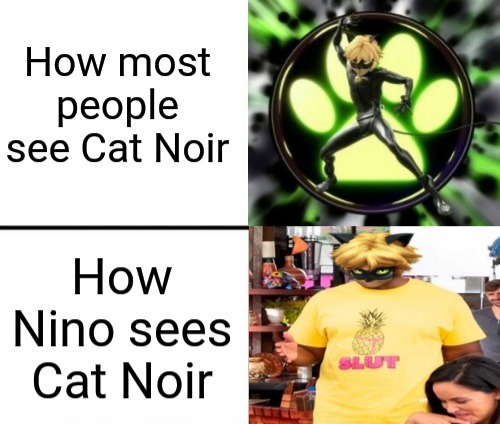
The Rocketeer is a 1991 Disney movie set in 1930's America where a test pilot gets a jetpack and uses it to fight Nazis and— Wait, what? “Rocketear”? Oh, damn it!
Let's get into the eleventh (chronologically the seventeenth) episode of Miraculous Ladybug's fourth season: Rocketear.
We start off with Carapace and Cat Noir struggling to hold back some T-Rexes brought back to life by a scientist Jurassic Park style. Seriously, they reference the movie in the same scene.
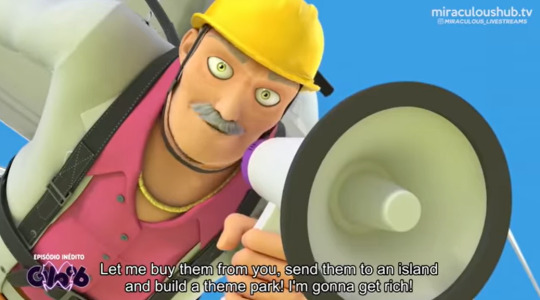
Why wasn't this the plot of the episode again?
After managing to tame the dinosaurs with a whistle of all things, Ladybug notices something's wrong with Nino after he gives the Turtle Miraculous back to her. Apparently, he's wondering why Rena Rouge (who he knows is Alya) wasn't recruited with him today. Ladybug tells him that he was the only help she needed today. In reality, it's because Alya has adjusted to her new role of supporting Ladybug behind the scenes in her new form, Rena Furtive.

And I'm not a fan of the new form. I get the camo, but it doesn't really help her blend in when her suit is bright blue. I think it's based off the arctic fox, but that animal is able to camouflage itself because it's fur matches the snowy environment. I'm sure a bright blue jumpsuit won't stand out when she tries to blend in at all. Also, the fact that Alya can just change her hero form gives even less excuses as to why Ladybug's new form is only when she uses her Lucky Charm.
Alya is struggling to keep this a secret from Nino because they don't have a lot of secrets in their relationship. Marinette says she can kind of get it because she had to keep her identity a secret from her friend and has to keep keeping her identity a secret from everyone else. Basically, she's telling Alya to suck it up because this is what being a superhero is.
So the next time she sees Nino, Alya tells him she's no longer Rena Rouge, but not about Rena Furtive, which troubles her. The very next scene shows Alya showing Marinette pictures she took of her new costume and asking her which version looks better.
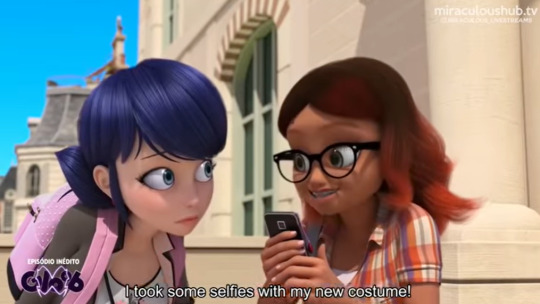
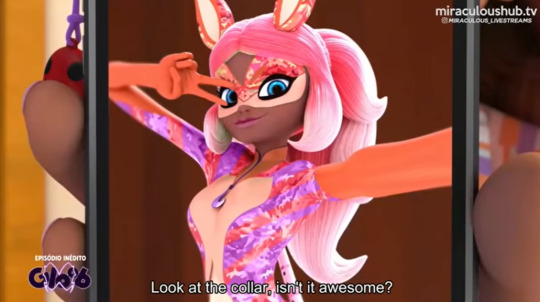
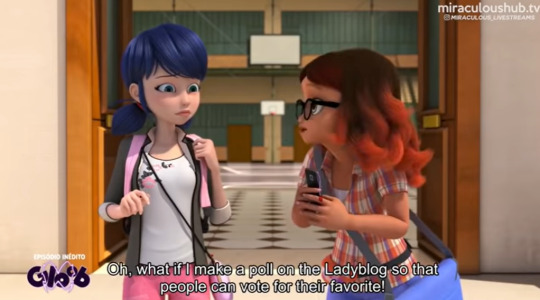
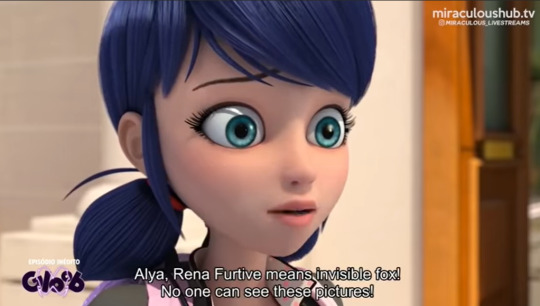
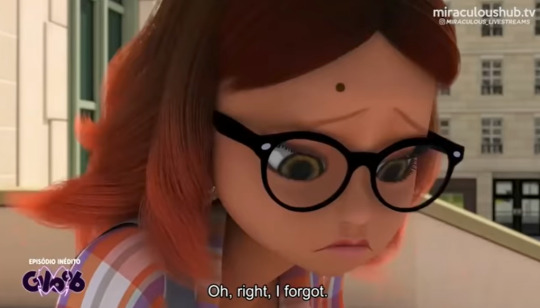
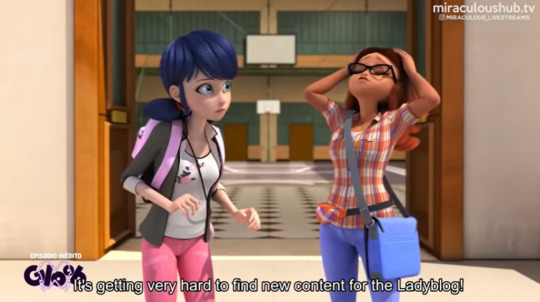
You could always try reviewing Akuma fights. I heard there's one blog that does it when they're not criticizing the famous director Thomas Astruc on social media.
Yeah, in case you can't tell, Alya was only able to rent her brain for a few episodes because she really doesn't seem as understanding about being a superhero as she was in earlier episodes. In episodes like “Optigami” and “Sentibubbler”, we saw Alya use more strategy and show discretion as Rena Rouge, seemingly taking her job more seriously, but then this episode just had to go and piss it all away. I also love how the first time the animators made Alya's skin the same when she's transformed is in a single frame for a joke.
Alya thankfully deletes the picture, but Nino overhears her talking about struggling to find more content for the Ladyblog, and decides to go to the movies with her to help take her mind off things. Nino, in turn, proceeds to give the same reaction to the in-universe Ladybug movie that Astruc gives to the PV.

Apparently, that movie's already getting a sequel and it has a teaser. So was the sequel animated at the same time as the original like Back to the Future Part II and Back to the Future Part III?
Nino gets pissed the next movie in the Ladybug Cinematic Universe will feature Rena Rouge and not Carapace... even though Rena Rouge debuted first. The teaser then shows Rena Rouge falling for Cat Noir (yet another creative liberty taken by the writers or something Astruc's self-insert threw in himself), and takes it like it's the real thing. Dude, the first movie said Ladybug was afraid of cats, and the director yelled at the person it was based on for judging it. He clearly has a hard time distinguishing fiction from reality.
Alya leaves Nino early so she can go on patrol, but Nino sees Cat Noir heading out as well. He then watches a video on the Ladyblog where Alya praises Cat Noir which is totally not Astruc projecting or anything.
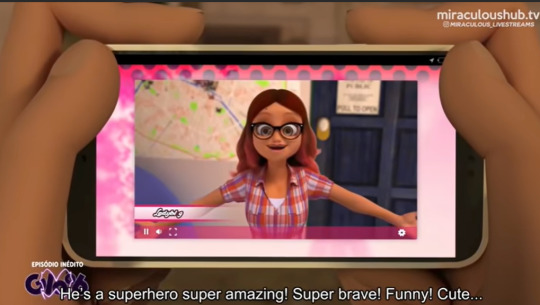

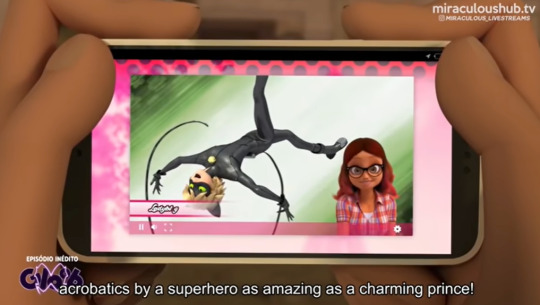
I don't know what your definition of a prince is, Alya, and I honestly don't want to know.
So Nino takes this as evidence that Alya is in love with Cat Noir and decides to tell Adrien, who naturally laughs him off. And just before you think we have an episode where Adrien plays the straight man, Adrien decides to visit Alya because he's afraid he accidentally charmed Alya.
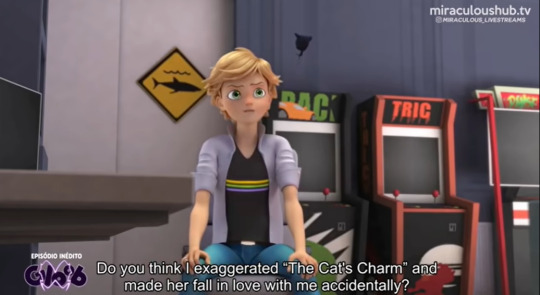
Yes, because Cat Noir is so charming, girls are just fighting over him, aren't they?
We then cut to a black and white film noir monologue by Nino (dressed like a detective with a fake mustache), who decides to spy on Alya. When Cat Noir asks Alya if she is attracted to him, she naturally laughs him off, though Cat Noir is thankfully a good sport about it, even giving her a hug to apologize. Unfortunately, Nino took this the wrong way.
The next day at school, Nino takes Adrien into his “office” (it's really an excuse to reuse the boiler room setpiece), and shows him the picture of the hug. Adrien says that Alya would never fall for Cat Noir because she's always dedicated to finding out the truth and telling her boyfriend everything. What's Nino's retort?
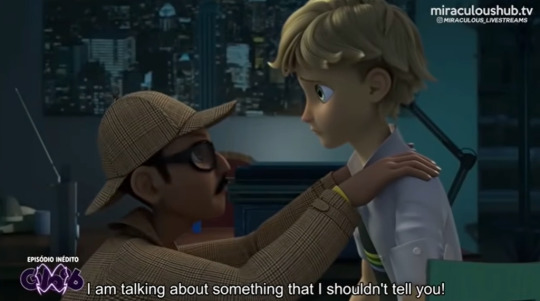


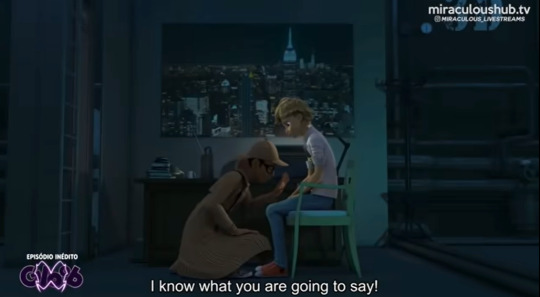
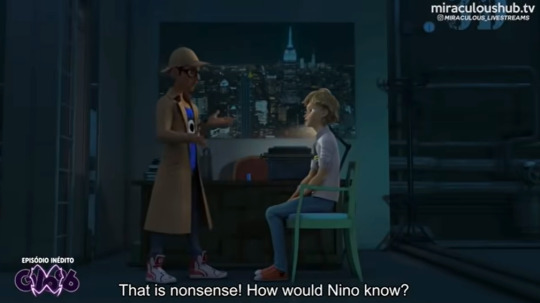
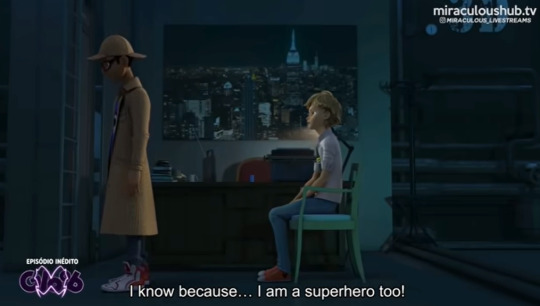

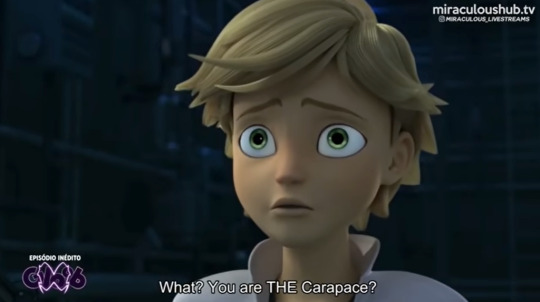
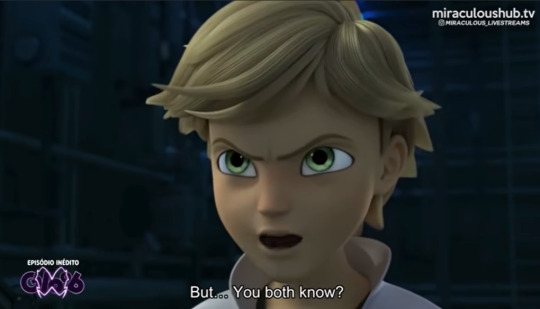

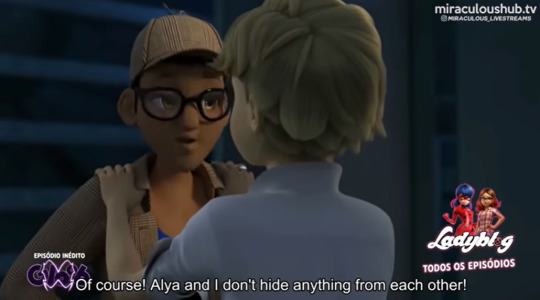


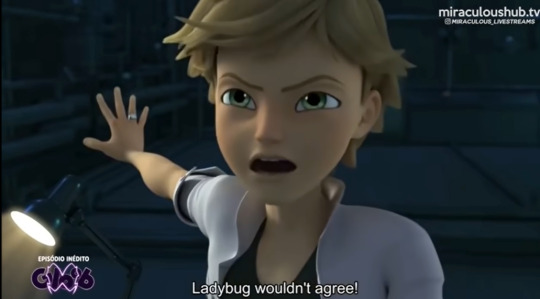
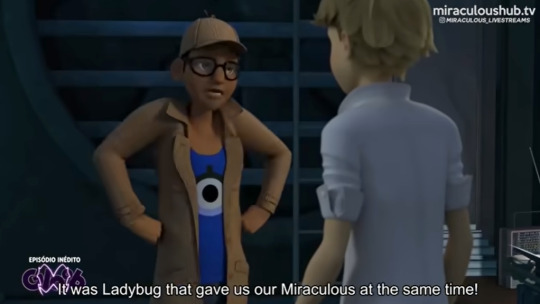

Okay, several problems with this bit. First of all, why would Nino even tell Adrien any of this? What would it accomplish? Why not say all this to Alya while confronting her about her alleged unfaithfulness? Second, Ladybug didn't give Nino and Alya their Miraculous at the same time until it was an absolute emergency. She outright said in “Hero's Day” that she didn't have time to recruit Nino and Alya separately.
Ladybug: I'm sorry for what I'm about to do. I know I'm revealing your secret identities but I don't have time to find a good excuse to give them to you separately. Rena Rouge and Carapace, I need you both!
Nino and Alya kept their identities secret from each other until then, with Alya even keeping the fact she knew who Carapace was a secret as well. Nino didn't find out because “they don't hide anything from each other” (which I plan to talk about later).
Other than that, I actually liked Adrien in this scene. It was really investing to see him try to justify the whole secret identities rule while Nino blatantly said there was an exception. This is the kind of stuff I wanted to see when it came to Adrien doubting Ladybug, not him destroying things in his anger.
While Nino rants about how Cat Noir “stole” Alya from him, Shadowmoth sends an Akuma his way, turning him into Rocketear.
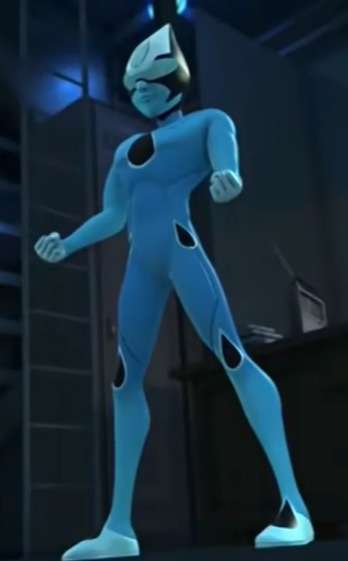
And the design he has is just boring. It's just a blue jumpsuit with some black spots that look like teardrops, a teardrop-shaped head and a visor. I think the reason this season's been relying more on past Akumas and using more Sentimonsters is because DQ is terrible at character designs. I mean, compare this suit with Aigraon from Zyuden Sentai Kyoryuger (his Power Rangers counterpart is Wrench from Dino Charge).

The design does so much more with the teardrop motif, giving him a perpetually miserable face with tear lines going all over his body. Add that to a more diverse color scheme, and you have a much more visually stunning design. And this was created in real life, not rendered on a computer. I'm not sure if this is a budget thing or a laziness thing, but if it's the former, you really need to do better, animators.
The powers are meh, giving Nino the ability to fling explosive tears at enemies. It's a clever idea, and it makes sense he gets a power that parallels Cat Noir's, but I think maybe it would have been more interesting if he couldn't control the tears at all. Like, imagine if he was constantly crying like Blue Diamond, and with every tear he shed, Rocketeer could send it at whoever he felt was causing him misery, mainly Cat Noir, all while serving as a metaphor for people who blame others for their own personal issues. Better yet, make him look like the detective outfit Nino wore for the second act. It would have made him more unpredictable instead of making his tears generic projectile weapons.
Marinette and Alya see the fight and transform into Ladybug and Rena Furtive respectively, the former summoning her Lucky Charm, a projector. Is it just me, or has this been happening with Ladybug a lot recently?
Back to Rocketear, we get a good moment where Cat Noir intentionally lets the Akuma hit him so he can get a chance to resolve things diplomatically. See, this is a moment where Cat Noir's self-sacrificing nature feels heroic and not selfish like when he does it without Ladybug's permission to spite her. Unfortunately, it doesn't really go anywhere as Ladybug shows up and plays the recording Nino took (Alya found his phone earlier), while Rena Furtive uses her Mirage to give the audio to what actually happened that night.
Rena transforms back into Alya and embraces Rocketear, who apologizes to her for his behavior. And then he just... rejects Shadowmoth's power while looking like it wasn't that much effort.


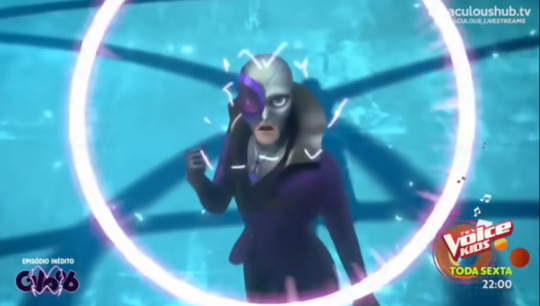
At least when Chloe and Alya did it, we saw them struggling for a little longer. I guess maybe it's because Nino is motivated by his love for Alya, but I think it should have been fleshed out more. So Ladybug purifies the Akuma, gives Nino a Magical Charm, and Cat Noir is still unsure about his feelings for Ladybug at the moment, though they still pound it.
Back in his room, Adrien ponders why Alya and Nino get to know their identities while he and Ladybug can't, but Plagg points out it's because she's the Guardian. It's brief, but I do like seeing Adrien start to doubt Ladybug's judgment, and it looks like it'll foreshadow future episodes. This is a problem I've had since “Hero's Day”, and I'm glad the writers are finally acknowledging this double standard. I just hope they don't end up blaming Marinette for whatever happens later on.
Marinette, of course, apologizes for what happened between Alya and Nino, and I have to say... yeah, no. It's obviously Nino's fault here.
Nino really pushed personal boundaries in this episode, much like Marinette's friends in “Gang of Secrets”. Yes, honesty is a valuable trait, but sometimes, people have secrets they want to keep to themselves. Nino's idea of “not hiding anything from each other” is somewhat controlling, like he's demanding Alya tell him everything whether she wants to or not. The fact that he immediately assumed Alya was cheating on him without giving her freedom to make her own choices doesn't make him look good. Let's be honest, a more realistic outcome would be Alya choosing to break things off with Nino or at least lecture him about how she can do what she wants and keep the secrets she wants. But instead...
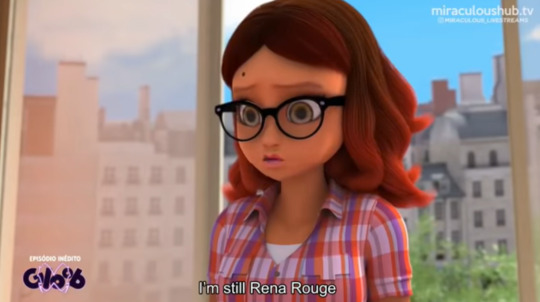

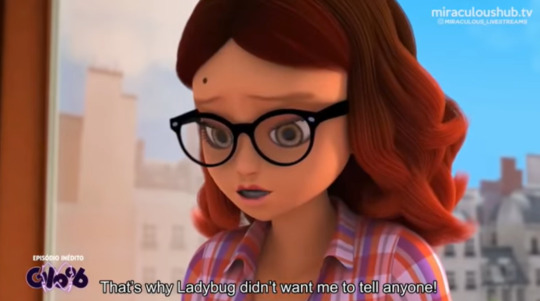
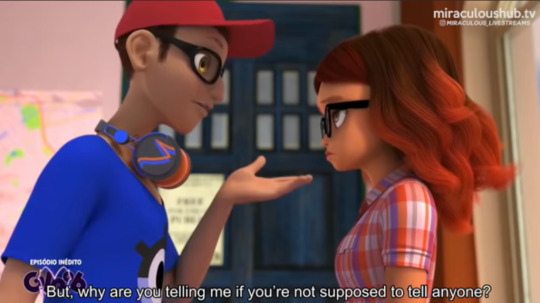
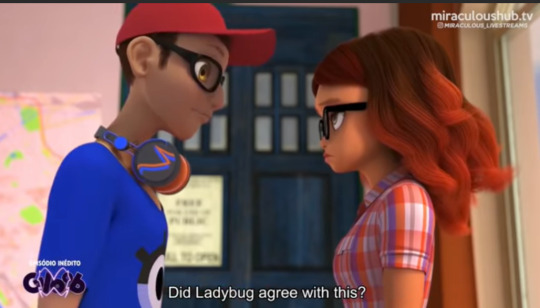

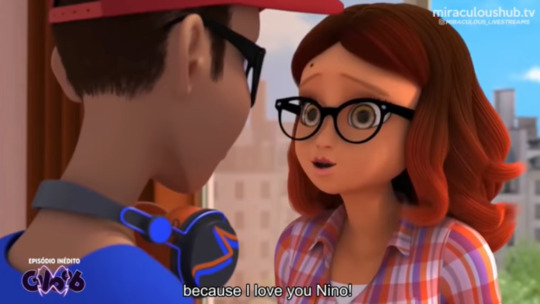
And that's how the episode ends.
Okay, Marinette just said she trusted Alya to make the right decision, but I highly doubt she meant this. Marinette strictly said Alya had to keep Rena Furtive a secret, and now she's telling Nino this despite the risk? The whole reason Marinette and Luka broke up was because Marinette had to keep her secrets from Luka, but now it's okay for Alya to be completely honest? How is this not a double standard?
This episode was just dull, and there’s not even much I can really say about it.. There were a handful of standout moments, and the stuff with Adrien was somewhat compelling, but Nino's behavior was just insufferable and dragged the episode down. The Akuma fight was weak, only lasting about four minutes at most, and while the Lucky Charm was more creative this time, the plot was just frustrating. It's really one of the weaker episodes this season.
Now if you'll excuse me, I'm off to watch the better Rocketeer.
#immaturity of thomas astruc#iota#thomas astruc#thomas astruc salt#miraculous ladybug#miraculous ladybug salt#marinette dupain cheng#ladybug#adrien agreste#cat noir#chat noir#alya cesaire#rena rouge#rena furtive#nino lahiffe#carapace#rocketear#gabriel agreste#hawkmoth#hawk moth#shadowmoth#shadow moth#plagg#bob roth
260 notes
·
View notes
Text
What Makes Hal a Great Villain?
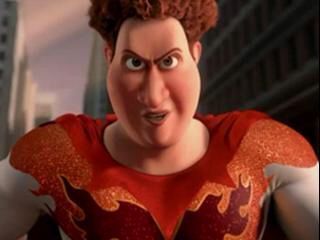
Okay, I’m saying it upfront: this one is going to get a little dark and very real. Potential triggers for harassment, stalking, sexual predation. Nothing graphic or heavy, of course, but if these are especially highly sensitive subjects for you, please proceed with caution.
Also, SPOILER ALERT for anyone who has not yet watched the animated awesomeness that is Megamind. (If you are that person, the DVD is on sale on Amazon, and the movie is available to stream on NowTV. Go watch it. I’ll wait.)
We all know Megamind is an awesome protagonist--multi-layered, relatable, and surprisingly complex-- but, truthfully, his antagonist is just as interesting. In fact, when compared with other animated villains of the early 2000′s, he’s by far the most memorable... and the most terrifying.
Many may question my assessment. I mean, let’s be honest: this guy doesn’t exactly look like the face of evil. But make no mistake: Hal, who later becomes Titan, is an extremely scary person.
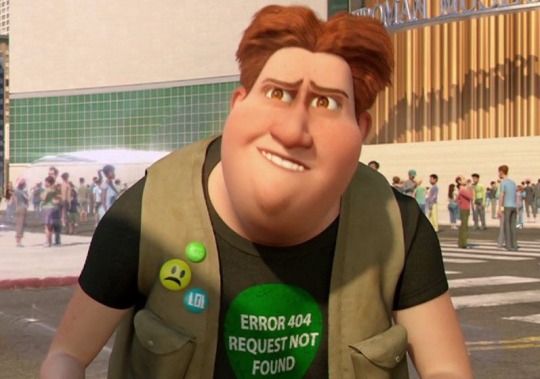
I don’t want to leave readers with the impression that this character is one-sided, however, so before we get started on just what makes this fellow complete nightmare fuel, let’s look briefly at a few of the other reasons that Hal makes a fascinating Bad Guy.
One of my favorite things about Hal’s character arch is that it defies expectations. Superhero comics have a long tradition of Average Nobodies who somehow receive extraordinary powers and go on to save the city. Or the world. Or the universe. You get the idea. Many comic book fans, upon watching Megamind for the first time, probably expected Hal to do the same, but he doesn’t. In fact, he goes rogue, choosing to use his newly-obtained gifts for wanton destruction. Thus the film inverts the established trope.
Like the protagonist he faces, (and is thankfully conquered by,) Hal is complex, and his true nature reveals itself slowly. I’ve heard some people say that they actually felt a bit sorry for him in the first scene he appears, as he awkwardly tries to express his feelings to reporter Roxanne Ritchi. At first he seemed like nothing worse than a socially inept and sexually frustrated nerd. Only as the move progressed, and the aforementioned viewers saw his creepiness more clearly, did they begin to revile him. One of the many clever things about the movie is that the gradual development provides audiences with the experience of slowly getting to know the characters. While Megamind is the somewhat anarchical Goth who worries you a little at first, but whose heart of gold has you loving him once you really understand him, Hal is that guy you really, really regret talking to at a party. You know, the one who quickly starts sending your internal Creep-o-Meter off the scale and persistently follows you around for the rest of the night. This is, indeed, part of what makes Hal disturbing; just like real villains, he hides in plain sight, wearing the guise of an ordinary fellow.
Which brings us back to the scary part. Even before he gets superpowers, Hal is bad guy deep down. He’s a creep and a stalker. He harasses Roxanne at work and keeps pestering her for a date no matter how many times she says no. Either consciously or unconsciously, he assumes that she’s shallow, and that once he has a muscular body and a bevy of godlike abilities, she’ll fawn on him. The idea that he himself might be the problem never seems to occur to him. In fact, he seems to feel that she will then owe him her affection. This is because, even before becoming Titan, Hal appears to have an overblown sense of self-importance and an unrealistic concept about what he deserves. (I go into detail about that in an earlier post, Megamind and Identity, which you can read here.) The fact that he doesn’t get what he feels is his right seems to have created a deep-seeded bitterness in him that rises to the surface once he obtains power.
But Hal really is the problem. His combined possessive harassment and complete lack of empathy are exactly why Roxanne neither likes nor trusts him. And she’s right to feel that way. Almost immediately after gaining his powers, now feeling that he is above society’s rules, Titan begins revealing just how terrible of a person he really is. He uses his supervision to spy on Roxanne while he and Megamind (disguised as Space Dad) are in the park, and that must not be the only incident because he later tells Roxanne: “I know everything about you.” This is just before he grabs her off of her balcony, without her consent, and begins throwing her around like a rag doll, terrifying her and putting her life in real danger because, apparently, he thinks she’ll be impressed.
Yeah. This guy is pretty much human garbage.
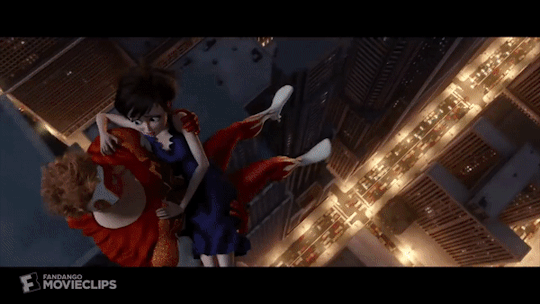
Once he finally understands (more or less) that Roxanne really means it when she says she’s not interested, Hal/Titan reveals himself to be a man-child. He begins by using his abilities for selfish and criminal reasons, essentially stating that he doesn’t feel heroism is worth his time. When he learns that Megamind has been dating Roxanne, (albeit in disguise,) he reacts with violence. This is because Megamind, like Hal himself, is an outsider: unpopular, unwelcome, and considered unattractive by most of the population of Metro City. In Hal’s mind, this revelation highlights the fact that none of these factors were the cause of Roxanne’s rejection, leaving only he himself to blame. (In fact, the movie contrasts Megamind, who, although imperfect, respects Roxanne’s wishes and intelligence, with Hal, who basically views her as an object to be won. Again, you can read more about that in Megamind and Identity.) Hal can’t handle that. He can’t accept it. So instead he turns his rage on the city as a whole. (This is despite the fact that, deep down, Hal knows he is the problem, hence why he rejects his identity as Hal and fully embraces the new one as Titan. That’s illustrated by his final line before abandoning Roxanne on Metro Tower: “It’s Titan, not Hal!”)
Hal abuses his power, and society suffers as a result. Even then, however, Hal/Titan still tries to lay claim to Roxanne. He accuses Megamind of “stealing his girlfriend,” and later tells Roxanne: “Let me guess, after seeing how awesome I am, you’ve come to your senses.” All the way to the end, Hal still can’t quite seem to accept that reality is not following his design.
If the idea of a man who lets power go to his head, objectifies women, won’t take “no” for an answer, and reacts violently when denied what he feels he’s owed sounds familiar, that’s because it is. Humanity has a huge problem with these sorts of behaviors, ranging from sexism and sexual predation to unfeeling abuses of power. The Sarah Everard case in London, and the fact that several officials essentially blamed the victim, asking why Sarah was walking home alone rather than asking why some guy felt he had the right to attack her, is the most recent well-known testament to this, but it’s sadly far from the only one. A.J. White said it best in his YouTube video, The Terror of the Incel Superman, when he expressed that news archives are full of stories about women being murdered by the sort of overgrown boys who can’t accept their refusals. And although men of that sort do not have the ability to fly or shoot lasers out of their eyes, some of them do rise to social and political power. They are Hals.
That is exactly what makes this character so especially scary. Unlike more farcical supervillains, he is based upon something that truly exists. Preternatural abilities aside, Hal is terrifying because he is very real. Let’s just hope our world will see more Megaminds willing to stand up to them.
#BeMegamindNotHal
#Megamind#Megamind movie#villain#antagonist#Hal#Titan#bad guy#assessment#analysis#film#movie#Roxanne Ritchi#Be a Megamind Not a Hal#Metro City#Defender of Metro City#hero Megamind#Roxanne#Hal is a Creep#Incel#Be Megamind Not Hal
339 notes
·
View notes
Text
Lawrence After Arabia (SPOILER ALERT)
Today thanks to the generosity and hospitality of @aivelin @steblynkaagain and @willdudedoo I watched the new “Lawrence After Arabia” movie and boy oh boy do I have thoughts, vibes and general WTFery (in no particular order) for you. Buckle up, lords, ladies and supreme rulers of the universe!
1. The soundtrack is... questionable. But we knew that already because it got released, complete with music video, so much earlier.
2. The CGI was... not good. We also knew that because we saw a snippet of it in the music video. But I was not expecting to see the entire screen turn green (like solid green) halfway through the movie. I really understand that the movie was crowdfunded but dammit, if I were a benefactor and saw this I would be severely disappointed. Why I personally refused to donate to this movie is a separate matter; please feel free to DM me if you want details.
3. The acting wasn’t the best. It sometimes felt a bit like a school play.
4. The movie tried too hard to be educational, especially in the beginning when the church custodian tells the little boy about Lawrence, during the public inquiry, during the scene when the secret agents read Lawrence’s file out loud and in the end after the funeral.
5. The movie was actually filmed on location in Clouds Hill, on the grounds and inside the cottage itself. The National Trust (the organisation currently looking after the property) initially denied Mark Griffin (the producer) permission to film on location. He then took to the media (both traditional and social) and ranted about how the National Trust denied his biopic but allowed a “Jane Austen and zombies” movie to be filmed on one of their locations until the Trust gave in.
6. There was a shitload of really random details from Lawrence’s life. Some felt like they were shoehorned in to make the film more educational.
7. I was astounded by the sheer amount of very “in your face” references to “Lawrence of Arabia” (1962), from “nothing is written” to numerous visual references (goggles hanging on the bush, shadow in robes) to literally naming a character William Potter to literally using the quote “the trick, William Potter, is not minding that it hurts”.
8. So many conspiracy theories! From the black car theory to Feisal possibly being poisoned. In fact the entire film is built around the premise that Lawrence was taken out by two secret service agents in a black car.
9. I really wanted to like Tom Barber Duffy as Lawrence but his performance was just... IDK, bland? There wasn’t much feeling there.
10. My notes here literally say: “did he just kiss Florence Hardy on the cheek?!” and that’s exactly what happened. We will revisit the Florence Hardy situation later.
11. I want the keffiyeh and the leather motorcycle gauntlets.
12. There’s a flashback to Ned’s childhood where he is seen receiving punishment from his mother. Sarah Lawrence displays a tactic I’ve seen among numerous Christian fundamentalists: she tells Ned she loves him and gives him a hug, then quickly pushes him away and proceeds to administer punishment, complete with the “I do this because I love you” messages.
13. Tom Barber Duffy’s visible piercings sparked joy in me. Thank you @aivelin for the screenshot.

14. I was quite excited to see Laurent C. Lucas as Feisal simply because of the resemblance but, damn, he was disappointing and his attempt at a Hejazi accent wasn’t great.
15. Lawrence gets called a “bloody sadomasochistic little bastard” by the head of the secret service. So many opportunities for an intelligent short joke were missed in this movie.
16. “Feisal gives him status of son”. I thought that was Hussein? Am I confusing them? Can someone please help?
17. “If someone isn’t going to annihilate this little shit then I will”. Again, so many short joke opportunities...
18. SO MUCH talk about Ned and Oswald Mosley. I felt that at one point it was suggested that Ned may have sympathised with Mosley but I may be mistaken.
19. I have a weird feeling that Mark Griffin (the producer) was inspired by Matthew Eden’s infamous “The Murder of Lawrence of Arabia”.
20. Cally the dog is a very good boy and so far my favorite character. Cally’s performance was the best and is the only thing about this movie that deserves an award.
21. OMFG NED JUST FULL ON HUGGED FLORENCE HARDY
22. Is Mark trying to make Ned straight?!
23. What the fuck is going on with Ned and Florence Hardy and why does it look like Mark is shipping them?! During the 2 hour feature Ned kisses Florence on the cheek, Florence cups Ned’s face in her hands and kisses his cheek while he turns his head like he’s trying to get a kiss on the lips and then stops himself, Ned and Florence hug, Ned helps Florence down a fence/wall type thing and they have one of those moments where they stand a little too close, still holding onto each other and looking into each other’s eyes, then they hold hands while they walk to the village.
24. Ned pulls a gun on a journalist and almost shoots him. I’m sure this is a reference to that one time Lawrence punched a journalist for asking invasive questions.
25. Is Laurent C. Lucas in brownface make up?!
26. Why TF is Ned bathing in a basin if he has a whole-ass bathtub on the property?! Filming restrictions probably.
27. The secret service agents called Ned “a queer”. No context was provided as to why they would say that.
28. It would appear that the two secret service agents “were roommates” and “there was only one bed”. That is the actual setup of their room and they are filmed sitting on the one bed.
29. At this point my notes say that the soundtrack composer may have been inspired by the BBC News theme tune.
30. The accident is just a major WTF moment.
31. The blood pouring down Ned’s face is just... a lot.
32. Why was there a beep like when someone flatlines on a medical show?!
33. OMFG THAT DICK JUST WENT IN THERE AND INJECTED NED WITH SOMETHING
34. I liked Ned racing the train and the plane on his motorcycle. It was a fun touch.
35. Y’ALL LEAVE POOR MR BROUGH OUT OF YOUR SCHEMES, YOU SECRET SERVICE DIPSHITS
36. The dipshit blackmailed Mr Brough with a picture and I really want to know what was in that picture. Did I miss something?
37. Mark is really going to ride the whole black car thing to the death.
38. The inappropriately happy and upbeat version of “Jesu, Lover of My Soul” was used as the background for Ned’s funeral procession. It was supposed to be a march.
39. Mark Griffin has inserted himself into the movie as a secret agent and a voice-over guy.
40. Deraa was mentioned exactly twice, once as “an allegation” and referred to only as torture. No further context was provided.
41. Dahoum is referenced numerous times but without any context. I feel that Mark struggled to choose between the LGBT theory and his own heteronormative projections on Lawrence and decided to roll with both.
So there you have it. Two hours of my life that I will never get back.
27 notes
·
View notes
Text
Jade. The fate of female character in Mortal Kombat
It’s been a while since I posted anything on my blog cause I’ve been busy with my life and rapid changes in it. During this time, I’ve watched the new 2021 Mortal Kombat movie as well as the new animation Battle of the realms and also rewatched the Story Mode of MK11 a few times. As you probably can tell, I have a lot to say.
JADE. MILEENA. KITANA. SONYA.
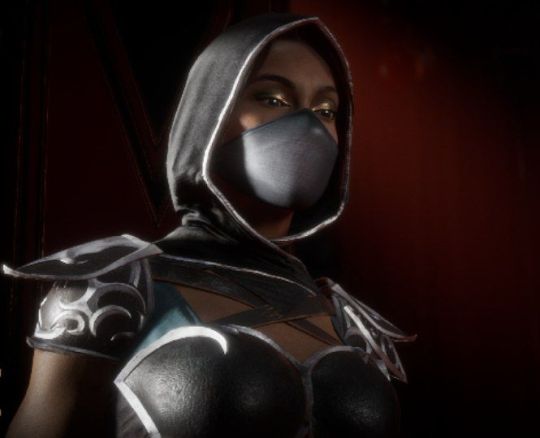
Skip this if you don’t want to read my very important (and long as sh*t) rant about female characters in MK.
DISCLAIMER. This thing is going to sound extremely feminist and women-supremacist or whatever. By saying things that I’m going to say, I by no means think that male characters should be weak or lacking. If anything, it would be nice to have some godforsaken EQUALITY. I’ll explain further later.
Part One: Mortal Kombat (2021)
There’s no Jade in this movie.
The end. That should be the sole reason I dislike it.
However, it might be better this way since the Nitara and Mileena portrayals in this movie are... questionable to say the least. Okay, y’all been robbed. If MY JADE would be brought into this movie to BE THERE for like 4 minutes of screen time only to get absolutely brutal FATALITY I. would. be. pissed.
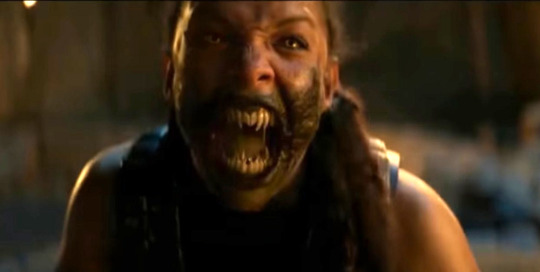
More than I already am and that means something.
Sure, there’s a possibility that she’s going to be present in some of the upcoming movies because this one is definitely not the only one they’re going to make. But do I want that? Yes. And no.
Mortal Kombat movies (and Mortal Kombat in general) have a problem with women portrayal in general. The target audience for them are MEN, potentially heterosexual men, who want nothing more than bloody gorey fighting scenes with occasional sex scene here and there. To achieve that, they need a female lead, an attractive, kinda kick-assish but not too much, to not overshadow the absolutely badass men characters. Girls tend to be “independent” (because God forbid they’d want to express interest in the male leads before the time is right), sarcastic, laid back and sometimes even bitchy. Because, you see, they are fighters. And they are Sonya Blade. They need NO MAN. They just need plot armor, bigger than America itself. And if they’re not Sonya Blade, they are... non existent. They are there, but they are never really there. Here, let me walk on screen for a couple seconds. Let me sit beside Very Important Male Character (aka Shang Tsung) for a couple of seconds, looking absolutely gorgeous. Let me have a fight scene in which I make choices so f*cking stupid there’s no potential explanation to it. I exist in this movie to make people that love me (this character) to come into theatres in hopes to see some good action and interesting plot.
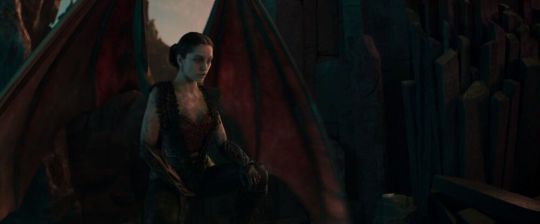
Now, I wasn’t born yesterday, I know how the world works. It’S bEeN LiKe ThAt FoReVeR, gEt OvEr here iT. Yeah, it’s been like that forever and the result is a mediocre movie that pleases neither the casual viewer, nor the actual Mortal Kombat fan. I don’t know, there might be guys who just saw Kung Lao’s fatality on Nitara, thought to themselves “Neat” and went on with their lives. But I exited the cinema with a sour taste in my mouth, feeling like I’ve watched one of the “fighting genre” films based on video games that had nothing worth remembering. Well, besides Kano. He was my favourite part of this movie and I normally can’t stand the guy :’D
Would it really help if they changed the way the women were portrayed? I mean - is that the ACTUAL problem of the movie? No, women being the eye candy and barely something else (if they’re not Sonya Blade) are not the only problem it suffers from. It’s that MK has been going the same route, retelling the same goddamn story for the millionth time. It’s always THE SAME. The only thing changing is who’s gonna get brutally killed. But - of course - out of the “disposable” character pool. It’s never Sonya (because you need our female lead or else there would be no female characters in the story), who ya know could be killed by Mileena but magically WASN’T. Because Mileena FOR SOME REASON was like: Ya know what? Naaah. Even though Sonya’s from Earthrealm and is actively trying to stop you. If anything, kill her because she annoys you. BUT NAH. It’s never Liu Kang because he’s the Chosen One. But killing Kung Lao is fine, he can die so Liu can awaken or smth. It’s not the main character because how else can you portray THE MAGIC OF LOVE AND FRIENDSHIP? Ya, that’s what I thought, don’t even think about it.
You have an amazing universe, filled to the brim with SO. MUCH. POTENTIAL. Let go of the same boring plot line and show us Kombat from another perspective. Change something. F*ck, go all feminist route and make a story center around Mileena dominating the world. Try with different versions of the same story, making it center around different character each time.
SURE, YOU’LL PROBABLY LOSE SOME VIEWERS BUT TIMES ARE CHANGING, AND MOST OF US ARE TIRED TO PAY FOR THE SAME STORY OVER AND OVER AGAIN.
Part Two: Mortal Kombat Legends: Battle of the Realms
Jesus f*cking Christ.

To say this film was rushed is an understatement. While I was watching it, I was like: TF? Everything happens all at once, we have Kuai Liang-Scorpion story line, we have Outworld’s attack, the tournament, not to mention the final fight that should be whole another movie. I felt like no story line was properly laid out, some of the characters died before I got to even know them and the battles were... disappointing. I believe they needed to push this movie out so they squished in everything they had and just went with it.
But, again, this movie just repeats the same things as its live action version. Let me lay it down for you:
Kung Lao dies (because yes)
Sonya Blade lives (because yes)
Jade is just there (more of it later)
disposable characters are disposed of
Liu Kang is badass and always wins
You watch it and feel like you’ve already seen it before. Sure, gore is fine, human Raiden is precious and need to be protected at all costs and adrenaline is pumping (I guess).
BUT NOW.
You know what’s coming.

JADE.
JADE.
My f*cking piece of sunshine, the gorgeous goddess of beauty and kombat, the woman who owns my heart.
She’s there for like not even a minute.
Words can’t describe how f*cking PISSED I am by this portrayal. These motherfrickers put her in EVERY SINGLE POSSIBLE SNIPPET OF THIS MOVIE. HER BATTLE WAS IN THE TRAILER, ONE OF THE SNEAK PEEKS WAS A SCENE OF HER AND KITANA.

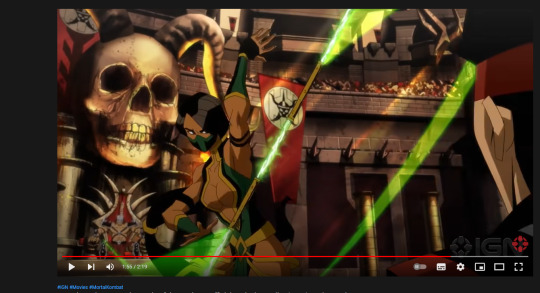

TURNS OUT EVERYTHING I SAW BEFORE THE MOVIE WAS RELEASED... WAS EVERYTHING I WAS ABOUT TO SEE OF HER!!!!
THEY MADE ME HYPED UP FOR NOTHING!!!!!!
I know I’m not the only one riding this trolley. Li Mei was there just to be killed. Kung Lao had a f*cking single dialogue line and then BAM, fatality, buh-bye. But I was watching everything of this movie, being so enormously happy that I will finally see Jade in the movies, FINALLY! Only for her to be present in a single scene, get her ass kicked by Liu Kang (what’s new) and then she’s never seen again, even when the whole f*cking world is breaking apart.
Again. She’s just there. Ladies and gentlemen, one of the best Shao Kahn’s assassins, gets her ass kicked in fourty seconds. They NEVER let her speak ffs. She just spews some general villanous sh*t and proceeds to step on Johnny. Then, she just goes Observer mode as Kitana “betrays” Shao Kahn, gets tied to the column and then the world is ending.
WHERE THE F*CK IS SHE?!
If you hype me up for her every chance you get, at least GIVE ME what you’re advertising. This is a scam. This is criminal offense. And homophobic. She is more than a revealing outfit and Liu Kang’s punching bag. I’m SO. F*CKING. TIRED. OF THIS. SH*T.
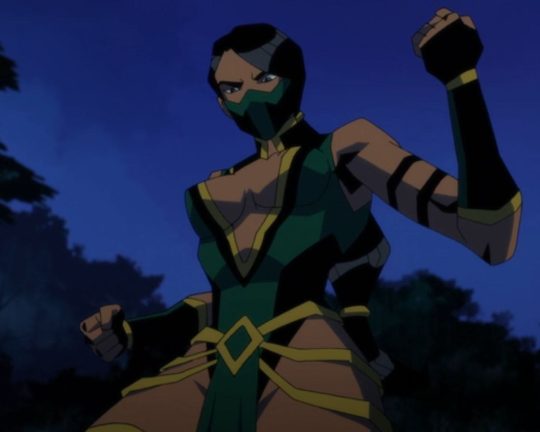
Kitana. The rebellious princess of Outworld... turned damsel in distress in this movie. Her role is so effing bad it hurts me to my core. You see her as a general being so badass and independent... oh right, we need Liu Kang to save her because he needs to maintain his hero look. And we need two kissing scenes. How do we get there? Oh, right, let him save her, because you know - that’s what makes wahmen kiss you.
ARE YOU NUTS?!
The movie started just fine, with Kitana being in charge with her right hand, Jade. Then, obviously, they water her down and soon she is a princess in a tower (in this case, princess on a column) that needs her buffy sexy man to save her. Oh, and she can’t resist him - you know, every normal girl’s reaction to getting untied is to kiss a guy you’ve known for like a few hours but seen before and you’ve talked like three dialogue lines in total. Sure.
Kitana just gets the unfortunate role of a female main character. She’s Liu’s love interest and that makes her take the role of a strong (but surface level, only) woman who still needs her hero to free her. Classic damsel in distress story, with Kitana being the princess, Liu being the Prince charming and Shao Kahn as the dragon (lul). Of course, they try to cover this up by making Kitana a general, letting her win a few fights but it won’t matter in the end. Some say that women want to believe in fairy tales but the more I see fighting games’ lore, the more I say it’s the men who want to believe them.
Is it necessarily bad? No. But it’s boring as fuk.
I would like to ask the directors to stop being so afraid of upsetting the target audience. Target audience can change and sometimes it comes out better than originally planned. My Little Pony was designed as a child’s cartoon but it was the creepy men who made it reach the top. Morally? Questionable at best. But business is booming, right? And that’s what they care for, right?
All I’m trying to say is these days women and gays are the future.
Thank you for today, more to come. I’m going to rant about the Story Mode.
#Mortal Kombat#mk jade#kitana#nitara#mileena#battle of the realms#female#commentary#article#mortal kombat movie
28 notes
·
View notes
Text
Inscryption after-game thoughts: If you're into ARGS and strategy games please go check it out before I now proceed to spoil everything. I can't see any game this year actually topping this for me this was such an experience dihdjwanbs
Did... Did I become heavily attached to these card game characters x jdknsvchsk yes oh god it hurts. I fucking hate that they all die even tho plot wise it seems that they were legitimate threats that had to be taken out. But still.
Do you have any idea how close to crying I was when I got to play that last game with Leshy, and it turns out he genuinely enjoyed playing with me and carried on even without the scales? And then shook my hand before being deleted??
AND I FELT SO BAD FOR MAGAJDJS WIZARD MOTHERFUCKER. HE WAS NOT WILLING TO DIE IN GRACE, HE WANTED TO LIVE. The man couldn't even get one last handshake. I swear if I was actually able to walk forward in that moment I'm going to be so pissed, because I was so horrified watching him desperately crawling through the void that I forgot which key to press and was just rapidly clicking.
And Stoat. You were a complete bastard and you continued to be a bastard as Po3. But I still love you, you were fun. You little bitch I refused to sacrifice you all throughout the first act and you turn out to be an evil robot bjsnlbavhlahkcschks
Leshy oh god I miss your eyes peering out of the darkness and your grangly hands reaching out as if to rip my neck off. I had fun playing with you too. Your section was good, not me being a complete moron and thinking the card game was neverending and there was a puzzle I had to solve first because I kept dying before getting to the cabin-
I got the film role through complete accident. How do people who didn't do the puzzles proceed?? Oh I'm going to have to watch so many Let's Plays. Oh god Leshy I miss you
I bought Inscryption thinking that the first act was the entire game, but no, there are two entire more acts. The film segments took me by surprise, the entire rpg map took me by surprise, the third acts took me by surprise- all in a "oh god there's more??" way. I chose Po3 to replace so I honestly thought there were 4 entire options for the 3rd act, and was completely flabbergasted at how much content there was. But nope, apparently there's dialogue bits that force you into choosing Po3, but still, that utter confusion was there all the way until the credits and I googled shit.
Thank you for having easy binary codes so that I could feel smart. Not thank you for making me search and find so many codes that I do not have remotely enough skill to solve. dkdjjssk. I wonder if those coordinates still have anything hidden there? Someone should go check. Where are they anyways?
For health reasons I should go to sleep soon or else I'll be in pain for the rest of the night, but motherfucker how am I supposed to sleep after that?? I have so many questions!!
Also what was that thing that I found on Reddit about someone finding an image of Po3 uploading itself? Huh?? Is there going to be more, please let there be more.
I managed to solve some stuff by myself but not nearly enough if there being an entire Discord for it proclaiming itself as an ARG infobook is any indication. Should I dig around in the game files? I'm really not good with code so I don't wanna fuck anything up. Wait, did the game actually delete itself why didn't I check-
Ok I'm launching it again the shortcut is still here. Opening onto Kamwerks and what the fuck
It's all the acts and film, and what I can only assume is dates?? Luke started playing on the 10/10 and finished on the 10/17. OH FUCK LUKE I COMPLETELY FORGOT IS HE OKAY, OBVIOUSLY NOT HE GOT FUCKING SHOT-
WHY THE FUCK DID AMANDA NEED THE DISC SO BAD? She fucking shot a man so I assume the company might be running under evil purposes. But how did she get through the side gate? Is she a lock pick? Idk the way it was framed makes me assume that she got in supernaturally.
Okay fuck it I'm going to click on the first act see what happens
It seems to actually be the beginning of the game again..huh
Small thing I really love how there isn't a new game option. It's something you notice but don't actually question until you start the game 'for real'. Just djdjsjsjsj little foreshadowings like that are always so cool to realize.
Not me continuing to play-
Hmm, Luke's sister comes up a lot. She died at some point and Luke began his cards channel to deal with his grief, but other than that does his sister actually have anything to do with it? During the film section where he frantically smashes the disc, I obviously couldn't read the flashbys fast enough but I swear I saw something about his sister. It would make the most sense as he is very very distressed afterwards.
Watch me trying to theorize and then get immediately debunked as I look at the video later.
Okay I'm getting sucked into the game again. Maybe I add more stuff later as I carry on searching.
Nope bodily pains are increasing I actually should go to bed. Maybe I'll just research in bed, that sounds good okay
Alright it's the next day now and I went to sleep at 4am if that gives you any indication of how invested I am in this.
And yeah I just read a document on all the codes and holy fuck I would not have been able to decipher them myself.
So... What the fuck is the Kaminski website that let people order 'replacement cards' about. Huh?? I'm so happy that there's apparently going to be more to all this but holy fuck
Alright it's the next next day and I'm here again because it's a SIN that I haven't mentioned our Scrybe of Death yet. Grimora is just such a nice lady, so pleasant a d understanding. Leshy kills you around 74 times, Po3 is a self-absorbed dickhead and Magnificus indefinitely tortures his students, but Grimora is just,, ohoohoo let me revive these ghosts and listen to their stories. ALSO FUCK YOU GAME FOR GETTING ME SO HYPED FOR THAT PIRATE BATTLE AND THEN IMMEDIATELY DELETING HER. I don't think there's a singular person whose heart didn't audibly break at that part. Please the two seconds of song we got sounds like such a fucking bop. If we got to actually choose the Scrybes, I think her section would've been my favourite atmosphere-wise after Leshy's.
Also speaking of torturing his wizard students- LONELY WIZARD. OH MY FUCK..I ADORE YOU. YOU POOR THING OH GOD HOW LONG WERE YOU IN THERE?? I SWEAR I TRIED COMING BACK FOR YOU I REALLY TRIED. How did they actually get out?? Like, good for you buddy you're such a great dancer but how?
The most hnnnngggg moment of the game for me was probably in Act 3 where they told me that I could do whatever I wanted, sacrifice them on the board or whatever, just as long as I never give them back to Magnificus. At this point I'm starting to question my own memory on if that actually happened because Lonely Wizard oh gods I'm so sorry that happened to you you're just a little scrungle who wants to sing and dance why-
7 notes
·
View notes
Text
Just What I Need - T. Holland
NOTE: This is my first tom imagine however I have written a few things for Peter and others so just let me know what you think of this! Any feedback is appreciated :)
IT IS ALSO IMPORTANT TO NOTE THAT IT IS DOMESTIC VIOLENCE AWARENESS MONTH! And while I did not cover that specific topic in this imagine, I still wanted to draw awareness to any specific form of harrasment, inside or outside of the door. This imagine features content about this that may be triggering to some readers but is in no way trying to romanticize the subject. There is no form of love that excuses abusive behavior. ALWAYS REMEMBER TO SPEAK UP! <333
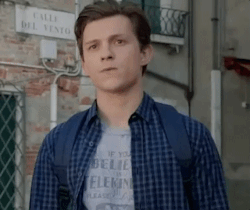
One attribute of yours Tom would come to find both a blessing and a curse after months of venturing further into your relationship is your obstinance. Nobody liked to be told they were in the wrong, but you ensured to steer clear of this whenever possible. Even the smallest things you would find yourself defensive over; toothpaste on the brush first, then rinse; toilet paper folded over, cereal before the milk. Normally, Tom would save the petty arguments and follow suit of your routine, because you being headstrong would leave him the loser of the argument one way or another.
Not that he minded it, though. Tom appreciated someone who would challenge him more than worship him like a god, as some people he has come across do. Being introduced to you felt refreshing, like a dawn of a new day that was not familiar enough to him. He immediately wanted to follow you when you announced your departure to him after your first conversation. He was fortunate enough to receive your number before you left and did not let the opportunity to reach out to you pass him by.
Your hard-headed ways enamored him, nonetheless. He would find the two of you having silly debates often—no aggression present—and seem to plunge deeper in the trench of your being. The sparkle in your eye acted as a beacon when it was first noticed by Tom. It happened to be in the middle of your nonchalant discussion on which water tasted the best.
“Aren’t they all the same?” He piped up, never breaking his longing gaze. Your eyes could only widen at his claim, lips parting in an insulted manner. At first, all you could muster was a scoff, placing your hand against your chest.
“They definitely do not all taste the same.” You remark.
Tom thought back to that conversation, gripping the preferred brand of water you enjoyed in one hand while a miscellaneous bottle of the same drink occupied his other one. He handed you yours and took notice of your furrowed brows when you studied the top of the bottle. You have been drinking this same brand long enough to know a sip had been swigged from it, even if the amount lacking was minuscule.
“So, I tried both...” Tom announced before you could ask, “and I still stand by what I said. I don’t taste a difference.” He eyes you closely when you bring the bottle to your lips to take a sip, humming through it while you do so.
“Well,” you screwed the cap securely to the bottle and moved your free hand to pinch his chin between both of your fingers, “your tongue must be broken then.” You removed your grip from his chin, but Tom was refusing to let you wander too far from him. His arm ached as a belt on your middle and he pulled you even closer than before to his frame, your shirts just an inch from contact.
“If I recall, this is is the same tongue that had you screaming my name last ni—” His response was interrupted as one of the crew members waltzed over to the two of you from across the set. However, your boyfriend said just enough to make your insides twirl and dizzy themselves. Though you wanted to reminisce in the previous night’s activities and make the suggestion to Tom to relive them in his trailer—it wouldn’t be the first occasion—the main purpose of today was to tour the set for his latest film.
“Hey, mate.” Tom greets with a smile and looks down at you. “Y/N, this is Stephen. He’s the fight choreographer. Stephen, this is my girlfriend, Y/N.” He gestures between the two of you, and Stephen was the first to offer his hand for you to shake. You stuck your empty one out towards him.
“How long have you been doing this?” You ask in enthrallment. Yet another trait of yours that captured Tom’s heart was, ironically, your inclusion of everybody. Even if a person held different viewpoints on which toppings were allowed to be on pizza, or which level bread should be toasted, she was always intrigued by the part they played in their life. Each set Tom strung her along to explore would leave him smiling when he caught you sparking up a conversation with the cameramen, the music editors, the propmakers, or anybody alike. You even shared a few words with the catering team once, jokingly questioning how they manage not to engorge themselves on the items they bring to each set. “I know I would. You have will power.” He recalls you saying through a string of laughs.
“About four years now.” It was not a common attribute of yours to admire another person so openly. Even before your relationship with Tom, you attempted to keep the conversation between you casual, so as not to chase him off. But there was something about the niche occupation that kept you on your toes. An idea comes to mind before you can even think it over, and soon you ask the man:
“So, is it mostly just fighting you work with? Or is there some self-defense moves in your choreography too?” Tom looks over at you in curiosity from the explicit question. His grip tightened around your waist, but you hardly noticed.
“Well, it usually depends on the scene and character. But usually, there is an equal amount of both when it comes to a take where the characters might face a lot of “close calls” with each other.” You nod in understanding, now fiddling with the water bottle in your hold.
“Do you…do you think you could teach me some stuff? I mean like, self-defense moves I could use in an emergency.” Tom furrows his brows at your proposition, pondering if there was ever a moment when you felt unsafe that he was unbeknownst to. Stephen quickly agreed, saying they could have a couple of quick lessons throughout the day while they began shooting. Before any additional words could transpire between the two of you, Tom proposed to take you to his trailer.
When you entered the considerable space, Tom’s arm fell from your waist in exchange for his chestnut tendrils. The repeated pull and run of his fingers were telling enough that something serious was looming over his thoughts.
“Tom…what is it?” You ask, taking the bottle of water from his hold and setting it with yours on a nearby table. His now free hand tangles itself in his locks alongside the other, looking as if they could just pull the woe overcoming his mind.
“Ha-have I kept you safe?” He finally mumbles out You blinked for a few moments, absorbing his words but not understanding them.
“Huh?” You ask, slightly tilting your head.
“I mean…I’ve kept you safe, have-haven’t I? Did I ever get you hurt, or…”
“What, Tom no…” you shook your head furiously and reached up to pull both of his frantic hands from his hair. It was beginning to part in all different directions from the ministrations he had previously given to it, allowing several strands to fall about in front of his face. You delivered a comforting squeeze to his hands, which accepted the warm embrace and nimble fingers interlocking with his. “Of-of course I feel safe around you.”
“That wasn’t what I was asking…” He murmurs, lips turning down further. “Was there ever a time you got hurt and I didn’t help?”
“No…” you reply, beginning to shake your head.
“Then why do you want self-defense classes so bad?” The desperation causes an increase of volume in his voice. The brown eyes before you were pleading for answers, and you felt your heart begin wrenching as you prepared to spill the story to him.
“It was while you were out of London for filming a couple of months ago. I never told you about it…” you start. Tom never interrupts. He just nods his head, a silent ask for you to proceed. “It was later in the afternoon and I was walking to go pick up dinner when a group of guys started cat-calling me…” your voice grew quieter towards the end of your admission. Refusing to meet Tom’s eyes, you opted for your hands, now turning stiff and clammy as memories of that day began replaying in your head once again. “When I was on my way back, they did it again but started following me while they did it. And I…” two hot, wet blurs swarmed your vision as you prepared for the onslaught of tears to stream down your face. “I threatened to call the police and make a report if they didn’t stop. So, they started calling me names…really, really bad names.” You refused to go into detail or repeat any of what those men had said to you or about you while retreating to Tom’s home. But every comment came to mind while you described the encounter with your boyfriend. “I’m sorry.” He was quick to notice the slight tremble in your voice before you began sobbing. When the tears began racing from your eyelids, they met the cloth of Tom’s shirt instantly as he attempted to mollify your whimpers and blubbers of how the day concluded. “I didn’t want to tell you and worry you because I thought it wasn’t that big of a deal.” You sputtered without any proper cadence in your tone.
“It’s a huge deal, Y/N. Of course, you should have told me. I would have given the report myself.” One of his hands glided through your hair, before placing itself on the back of your warm neck. “They had no right to harass you like that.”
“I just-I didn’t know what to do. They-they were close enough to grab me I didn’t know what would happen if I…if I didn’t say anything.” You peeked your head up, the white around your pupils now a vibrant red as Tom continued consoling you.
“I know, I know…” he assures. “I’m glad you said something too, darling. Imagine having them face your wrath when they don’t have the right water.” He remarks, trying to lighten the mood. He receives a small chuckle in return and takes it with a proud feeling in his chest. Or maybe that was his heart enduring vertigo from your sudden switch in behavior. Because now it was absolutely throbbing against his ribs to track down this group and let them have a taste of a proper fight.
“In case anything like that happened when I was alone…I just wanted to be confident that I could handle it better if it got worse.”
“I understand.” He nods, gazing down into your eyes. “Know that you can call me whenever you don’t feel safe. I would interrupt an entire shoot just to know you crossed the street without scraping your knee, okay?” Slowly, the gleam faded into your eyes once again, absolutely entrancing Tom.
“I love you.” You shakily whisper.
“I love you too.” He replies, wasting no time in planting an abundance of kisses to the crown of your head. You hum.
“Remember what I said earlier about your tongue being broken?” Tom nods, surveying the fond smile as it reinforced the corners of your lips.
“I was wrong.” You admit without hesitation, sending another squeeze to his hand. “It always knows just what I need.”
------------------------------------------------------
taglist; @coconutdawn @swiftmendeshoran
#tom holland#tom holland imagine#tom holland imagines#tom holland fanfic#tom holland fanfiction#tom holland fluff#tom holland smut#tom holland angst#tom holland blurb#tom holland oneshot#tom holland story#tom holland x you#tom holland x reader#tom holland x y/n
203 notes
·
View notes
Text
7AM confessions (t.h oneshot)
Synopsis: You just finished working a graveyard shift at your summer job. Just as you’re about to get into your car to leave to sleep the weekend away, a familiar face appears to confront you on what happened.
Paring: Tom Holland x Gender Neutral!Reader
Word Count: 2.4k+
Warnings: Angsty (?), Swearings??
Once your apple watch displayed 7 AM you knew the long week you had was finally over. The assembly line filled with car parts ready for inspection remain still and untouched as everyone switches off with the next group of shift workers who are already coming onto the floor. Luckly, its Friday, so you get to sleep the weekend away and reset your sleep schedule for your last week of shifts before the fall semester starts. You tidy up your small station and when you think you’ve done enough you turn around to leave and then you see your co-worker/work friend Raj approaching. You both wear matching white hard hats, blue gloves, white jackets, dark blue work pants, and brown steal toed boots.
“Hey, how was this morning,” Raj stops a few feet away and raises his hand to fist bump and you happily reciprocate before sliding your hands into your jacket pockets.
“It wasn’t a bad night, Lauren didn’t come in tonight cause she was sick with a stomach bug. Oh I did finally registered for my university courses during my break, and I got so lucky with my extra circulars.The moment I went to register there was only one spot left for the ones I wanted.”
Raj just nods and glances around the work station, inspecting to see you cleaned it to his standard. You notice his wandering eyes but you aren’t bothered by it. You’ve been in that position where you have to work a long eight hours on your feet and the person before you at your assigned station leaves it a mess and you’re stuck cleaning it for the first hour of your shift. So after he finishes inspecting he meets your eyes and nods in approval.
“Oh shit really? I should probably do that sooner rather than later. I’ve been going to university for three years and I almost always forget every time to register on time,” He replies.
“Don’t you have your final research seminar and reading seminar this year? I thought certain classes had a small capacity?”
“Oh. Well guess what I’m doing during my lunch break,”
You lightly laugh at him as the sound of a warning buzzer echoing through the factory floor goes off. You look around and see that most, if not all of your night shift people are already off the floor and you take this as your cue to leave.
“Anyway, talk to you later Raj,” he gives you small smile in response and steps around you to get started. You make your way off the floor and to your designated locker, providing some of the people from dayshift a warm smile as you walk past them.
You walk through a pair of white double doors which leads into a a bright baby blue hallway which eventually guides you to where the designated bathrooms are with the lockers. When you get to the end of the hall you turn left and head into the female washroom where the you’re met with an empty room. Usually, when everyone’s shift ends they’re rushing to get out (and you’re no exception). You would normally find yourself squeezing by people and dodging elbows trying to get to your locker but today is different. Staying behind for an extra few minutes to talk actually lets you take your time for once. By taking your time it also means the parking lot won’t be backed up as usual and you can drive home without any major delay to sleep your weekend away. That’s the only thing you have to look foreward to, your bed because there is no one at home, no roomates, no pets, no boyfriends, no nothing. The place you were at two months ago was totally different from where you are now. You lived abroad in London with your then boyfriend for six months until you broke it off because you were lost.
You had to get out because your identity slowly became tightly intertwined with the person you were with. Everything revolved around them and their job and you were going no where in life. Your dreams were pushed to the back of your mind as you stayed in fancy hotel suites, alone waiting for your ex-boyfriend to come back from an exhausted day on set to only desperately try to keep his eyes open when you two watched a movie or went out for a night on the town.
He really did try his best to make your time with him exciting even if he was burn out from working all day. He made small dates in your hotel room feel magical. He had your hotel room decorated in fairy lights and planned a romantic dinner looking over the city you two stayed in. He made love to you in the early hours of the morning to the organy rays of the morning sun. Or another time, when he wasn’t allowed to leave the hotel at all, he took you to the hotel roof to slow dance under the stars to music playing from that headphones you two shared. You’d pay a million dollars to experience these small moments over and over again.
Over a weekend back in London by yourself while Tom had to catch a flight last minute to do film re-shoots in LA, you decided to have a self-care night. After lighting some candles, ordering take-out, dimming the lights, and scrolling through Netflix to finally find a good-feel show, you finally sit comfortably on the couch and relax. You found a generic rom-com from the 2000’s that looked mildly interesting and even if the plot wasn’t any good you could still get a good laugh about it.
As the movie progresses and the main character struggles to choose between a boy and her dream job you find your mind slowly loosing focus with what is happening on the screen and reflecting it back into your own life. After a few seconds pondering you realize something, had no idea what you wanted to do. You were in your early twenties, you were doing school part-time online with a program you liked but you spent most of your time with Tom. Traveling to country to country to join him while he filmed, staying in hotel rooms waiting for him, sometime visiting set when you were allowed too, it was truly an exciting and calming lifestyle.
Even though you believed you finally found the guy that you could spend the rest of your life with, a second family you got along with, a place you could see yourself settling down in, you didn’t have anything for yourself. When you thought you of trying to return to in-class schooling with a larger course load and renting a place for the semester and trying to sustain a long-distant relationship with someone in the limelight, it just stressed you out. You knew it wouldn’t be easy and just seeing how deflated Tom looked when he returned to you after working, you knew the relationship would push him to his limits.
Even after initiate moments you realized how tired and over worked he was. The look in his eyes when he had to leave for work the next morning couldn’t go unnoticed. You felt your heart squeezing itself and your breathing became heavier. You would never want to cause Tom any pain on your behalf, and you can’t continue to drag your feet with your education because you felt like you . So, you did what you did best, shut someone out and leave. You made up lie about how this relationship wasn’t working on your end, broke it off and flew back to the town where you had been attending school online. Scrambling enough money together to buy a used car and a small studio apartment and apply to as many jobs as you could. You got lucky, that when you were applying that a car factory needed more summer students and they were paying their workers a decent living wage and you just jumped on it. The job helped you get settled but it also helped ignore the small amount of regret you felt. It is too late to turn around now and now you must live with your choices.
You shake yourself out of a daze you didn’t realize clouded your mind, and it seems your feet have carried you to the front of your small grey locker. It looks like what all typical high school lockers look except half the size. You raise your hand to the lock to do one full twist to the right, one full twist to the left, and half a twist to the right again and my the lock pops off with a light pull.
You reach in to collect your phone, black spring jacket, dark blue water bottle, then you reach into your jacket pocket to fish out your car keys. You hum in satisfaction when you feel the cool metal of your keys in your pocket. You drape your jacket over your arm as you shut the locker quietly and slide the lock over the hook and push it shut. You proceed to continue to follow the baby blue hallways until you’ve reached the double glass doors of the exit. You push open the glass door and is met with a cool morning breeze also paired with a peach colored sky.
You make your way across the concrete of the parking lot, following the line of different coloured cars parked next to each other, eyes wandering at the different licence plates, soaking up the calmness of the morning sun until you stop dead in your tracks. You look up to see someone leaning on the hood of your car. This person is dressed in some blue jeans, a black hoodie, dark red hat, and it seems they’re just casually looking down and scrolling through their phone unaware of your presence a couple feet away. You think for a minute before speaking, should you just walk back inside and get someone to confront this guy or should you just do it yourself? I mean it is your car in a private parking lot, someone will hear you scream right? After a few seconds go by you just say fuck as the longer you stand here the less time you get to spend sleeping.
“Ah hem, excuse me you’re leaning on my car. Can you please get off,”
You keep your distance and tightly grip your waterbottle. Just so you have a head start if you need run back into the factory or even defend yourself. Their fingers stop scrolling, but their gaze is still facing downwards, hood and hat hiding their features.
“Uh hello, you need to get out of this parking lot its a private. Ill call security if you don’t move, ”
You shallow nervously as the figure stays still, unresponsive. When it seems like this figure is just going to continue to ignore you they stand up abruptly causing you to jump.
“Hi Y/N,’ An english accent comes out from the hood and your expression changes from fear to dread in seconds. Heart still pumping fast in your chest and you feel yourself getting even more nervous.
“What are you doing here, Tom”, You cross your arms the best you can and start staring at your feet to avoid eye contact.
“Can’t I come visit my girlfriend after she finishes work,” Tom questions as his foots steps get louder as they get closer.
“I am not your girlfriend remember. Besides the point, how do you even know where to find me. I haven’t talked to you in two months.”
‘You left without a much of explanation. You said when I came home from LA that this was over because you couldn’t handle this relationship, it stressed you out to much. I thought everything was going good mutually good in all aspects of the relationship, but I guess I was wrong. After months of trying to unravel what I could have possible done wrong, I just had to find you and get the truth of why you left,”
He ignores your question as he bends his knees to try and get a look at your face. Your mind almost speeds up, unable to come up with a good enough half-assed response, you mouth blurts out the truth without much thought.
“I love that you’re able to pursue your dreams, and god Tom I wouldn’t want you to do anything to compromise that. But I want to be able to pursue my dreams too Tom. The only way I can do that is if I leave and doing a long-distant relationship hardly ever works out for anybody! I don’t want you wearing yourself out because of me and being long-distance was going to tear you apart,”
You sniffle away the tears building up in your eyes while focusing on the curves on the concrete.
“Darling, why didn’t you just talk to me? I would and do understand if you want to pursue something on your own. I would never want to settle for anything less. “
He reaches out a finger to find a place under your chin to lift your head gently so your eyes will meet. You glossy eyes meet his soft, gentle brown eyes and that alone makes you want to cry. You never meant to cause pain to reach those eyes, you just thought you were doing yourselves a favour.
“Baby, we could’ve done this together you know that. We would’ve never survived our first year together if we didn’t talk stuff out. Trying to make a relationship work with a person I’ve loved since our first date is worth the endless amount of stress life causes. Y/N, my darling, I would do anything to make you happy but also stay in my arms forever,”
His soft tone makes your knees weak and that is when the dam of tears breaks from your eyes and they flow down your cheeks.
“I’m sorry. I-I just thought I was doing the right thing for both of us. I was watching a movie and I started stressing my sell-out and just thinking for myself .I’m sorry I put you through this, I know I can’t turn back time, but please forgive me for causing you any pain because my love for you got me all fucked up, “ You say trying wipe away the salty tears dripping down your face.
“I’m not mad nor am I upset with you. I’m just glad I can have you back in my life again.”
Tom smiles even bright as he pulls lightly on the hand he has a hold of to drag your body over to his. He embraces you into his warmth and your body curls into him and all you can think is there is no place you’d rather be.
“Now, why don’t we go back to your place and catch up on some sleep huh? Then you can give me tour around your new place and make up for lost time,”
He hums into your hair as you pull back from his embrace to look up, wiping your eyes with your sleeve to look at Tom more clearly.
“Yeah, I’d like that”.
#tom holland imagine#tom holland angst#tom holland x reader#tom holland imagines#tom holland drabble#dodson writing#Tom Holland x gender neutral reader#tom holland fanfic#tom holland fanfiction
46 notes
·
View notes
Note
why don't you like endgame or civil war
((hoo buddy, idk what brought this up but salt under the cut!! Like... a lot of salt - specifically regarding Endgame lmao
I’m gonna start off with CACW because it’s a short response lol
I don’t like it simply because I was done with the infighting between the Avengers. The found family crumbs we were given in Endgame was something I really wanted to see, and them just... ripping them apart frustrated me lol
honestly, the movie was... fine? Idk, I found it to be a lil slow for my taste (it felt like it just dragged on when I watched it in theaters), and I just don’t care for it in general ¯\_(ツ)_/¯ Also, ngl, I’m really bummed that Captain America: Serpent Society was a joke announcement because that sounds dope as hell and I really wanted to see that before I realized it’d been a joke dfgjhdsfhj
but, yeah, literally just because CACW is specifically an infighting movie annoys me to no end so I just won’t watch it again dgsfjhsfdhj
now, Endgame?
fuck Endgame
I. have a lot of issues with it, all of which are major grievances throughout the fandom. I’m pissed they killed Natasha and didn’t even bother giving her a fucking funeral because, I quote from Joe Russo, “Well, Tony does not have another movie. Tony is done. And Natasha has another film. And Marvel Universe obviously does not have to move forward linearly anymore. But that character still has more screen time coming.” (see here) and that annoys the hell out of me. She’s getting another movie - great! So you killed one of the few characters doing her fucking best to keep everything together at the compound, the one who was taking charge, give her a big role, and then murk her and... give her nothing but a brief mention at the end. Like... what the fuck? Natasha deserved so much better than what she was given. Tony’s funeral could’ve (and, frankly, should’ve) been a funeral for him, Natasha, and Vision because god forbid we see anyone mourn Vision other than Wanda
(actually this post covers how Endgame fucked over the MCU women perfectly, though Wanda’s not mentioned :c )
plus... Tony’s not done lol - he’s still a massive figure in the films/shows despite RDJ not acting in them, so his character has left shockwaves that aren’t dying any time soon. Natasha... basically disappeared, and I believe she would’ve been dropped completely if it wasn’t for the fact she does have a film coming out soon. Which, frankly, seems awesome and all, but it’s a film that goes back to post-CACW pre-IW and... frankly doesn’t give me any reason to understand why that means she didn’t get a funeral. She’s not coming back in future movies/shows that are in present MCU timeline - her movie is set in the past. She could’ve gotten a decent sendoff
now, Clint’s arc as Ronin rubs me the wrong way. I know it’s a huge thing in the comics, and it’s not him taking a different mantle that I have an issue with. It’s the fact he, a white man, went around murdering people and got off scot-free. Yes, he was targeting genuinely bad people, but... to show that, they specifically singled out Mexican cartels and the yakuza (Japanese mafia, essentially) - so, in other words, the bad guys were people of color! I feel like I don’t need to explain how fucked up that is. And, to clarify, I love Clint! Clint is honestly one of my favorite characters, and the whole thing was just handled... poorly in the film
Tony’s arc genuinely hurts. This is a man who has suffered for years and has tried to make things right, and finally got a chance to settle down. He finally retired from the Avengers, finally settled down, and had a fucking life he could enjoy despite his ghosts, and yet... His arc ends with a message of “tortured soul finally gets rest by dying”. Because, y’know, it’s great seeing yet another long-suffering character only reaching peace through death, because god forbid they let characters heal! He could’ve still caused the second Snap, and he could’ve survived. He could’ve finally been able to step away for good and focus on his family, focus on recovering, and be truly happy. What’s so wrong with letting him stay alive so he can rest and be with his family? What’s so wrong with letting a long-suffering character finally find peace after one last bang?
plus it pisses me off that they’re now using him as a reasoning as to why bad things are still happening. Why is this person the bad guy? Because Tony Stark somehow may or may not have done something that hurt them! Even though most of that really stems from Howard or Obadiah. Tony just ends up getting the blame in their place. He’s just an easy target to use, much like the tesseract seems to be the go-to answer for why things go wrong. But this is a different train of thought
Steve’s ending pisses me off just as much as the next person lmao. You take a character who has acknowledged he no longer belongs in the past (which, funnily enough, was written by the Russos), aaaaaaand have him go back to the past while ignoring two important people in his life that were still right there. He got Bucky and Sam back, and he leaves them. His arc is ruined within a matter of minutes, and it paints a hella bad picture of him in the process. He goes back in time to stay with Peggy (which ultimately destroys her own arc, and the fact she’s a person outside of her relationship (or lack thereof) with him because, y’know, why have her be able to move on and be her own person?), and we’re supposed to believe he’s fine with everything he knows from the future? Fine with knowing Bucky’s trapped with HYDRA and is suffering as the Winter Soldier? Fine with knowing HYDRA has infested SHIELD from day one? Fine with knowing Howard and Maria are going to die? Fine with royally fucking up the timelines? We’re supposed to believe he sat back and did nothing with all of that? They could’ve had him still hand the shield over to Sam - they could’ve let Steve stay an Avenger without the mantle
also the fact the Russos said he didn’t recognize Red Skull when he returned to Vormir to return the soul stone? Like... what the fuck?? Not to mention he literally returns the stone to Vormir, which “soul for a soul”, and they didn’t bring Nat back that way??
and now onto Thor. Thor... holy fuck is this hitting something personal for me. Thor was ridden with guilt - he was furious with himself, hated himself, and blamed himself for failing to stop the Snap. He fell into a massive depression, and... was promptly danced around as laughing stock. Like, “oh! look at Thor! he’s fat and drunk because he’s depressed haha!” - like fuck off. It’s not funny in any form. His suffering was made into a joke and it pisses me off because I suffer from depression. A lot of people suffer from depression. It’s not funny. It’s fucking terrifying at times. I wasted a shit ton of money on a stupid online sim game because it was a distraction - it gave me... god, I wouldn’t even say temporary happiness, but it gave me something to temporarily help, and I still hate myself for doing it. It was a poor decision on my part, and I wish I could change it. And, during that time, I was scared because I couldn’t see myself pulling out of it. I thought I was gonna feel that way forever. I called out of work multiple times because there were days I couldn’t stop crying (something I still feel horrible for doing), I couldn’t get myself to contact any of my friends for months, and it was all because the medication I was on at the time... stopped working. Thankfully, my depression doesn’t work in a way that makes me a danger to myself, so that wasn’t an issue, but it still fucking sucked. And to see a character that I could relate to on such a personal level treated as laughing stock fucking hurt. I’m not sharing this for sympathy - I’m sharing this because it Thor’s arc hit home and it’s literally the main reason why I will not watch Endgame again
this is more of a nitpick than anything else, but... I didn’t really care for Carol in it tbh? Which is unfortunately because Captain Marvel is one of my absolute favorite movies! And I’m well aware she was introduced in Endgame while CM was being drafted, but that in itself is annoying?? Because Carol was originally going to be introduced in AoU, but was cut because it wasn’t going to introduce her character properly. And yet they decide to introduce her character in a clusterfuck of a movie before her movie is in the final stages, and proceed to release her movie first and then give a complete different characterization in her following appearance
honestly I just wanna cover this now to clarify some things regarding Carter and her backstory: the only reason I keep Endgame as is is because it felt easier for me to do so for the purpose of bending canon for specific threads. I wanted to stay as true to the given plots as possible to help with fudging of both the movies and her background, and also because I didn’t want anyone to feel like I was trying to force my own headcanons onto them, y’know?
I’m just gonna plug this here because fuck it lol, but I did start a fix-it fic regarding Endgame that you can read here! I... probably won’t finish it tbh, and I haven’t gone over it in a hot minute so it might be riddled with errors ahah - plus I’m not sure about how I wrote the characters! I get nervous when writing canon characters because I feel like I’ll miss their characterization completely, which is actually why I,,, rarely rp canon characters dgfjhgsfdhj
also the image in the doc was created by @/archervale!!
#ooc#((I think I covered what I wanted and I hope it makes sense dgjhdfh#I'm pretty tired but I'm doing laundry so I figured I'd answer this while I wait#but yeah I don't care for CACW and I honest to god hate Endgame#the potential is there and it just never reached it))#((I'm not even gonna touch the Russos directing style#'hey guys we're gonna film a wedding sIKE IT'S A FUNERAL'#like?? MAJORLY different event fellas#also I'm literally going off what I remember from Endgame so I'm sure there's QUITE a bit I'm missing#but I'm not watching it to make a bigger salt post lol#I don't hate watch things because I would much rather watch something I'd enjoy#tbh I don't understand hate watching at all but that's a different conversation gsdfjhdfhj))#death mention tw#depression tw
12 notes
·
View notes
Text
COMPARE & CONTRAST: Birth Of A Nation vs Gone With The Wind vs The General
TRIGGER WARNING:
Talking about race in American culture and movies, so some readers may want to brace themselves (looking at you, wypipo).
. . .
Confining “classic films” to movies that:
Demonstrate technical expertise, and
Influenced other films and creators
-- we have three (and only three) movies about the American Civil War we can safely put in the classic bin.
Before we go further,
let’s restate the obvious:
A film’s impact in the medium of motion pictures is separate from its impact on the culture as a whole.
Case in point:
Leni Riefenstahl’s The Triumph Of The Will is a perfect textbook example of how to stage massive crowd scenes for maximum visual impact, and how to promote individuals and ideas in purely cinematic terms.
It also contributed mightily to the Nazis’ rise to power, their subsequent wars of conquest, and the deaths directly and indirectly of tens of millions of human beings.
It’s important to know The Triumph Of The Will exists and why it’s important in film and cultural and political history, but you need never subject yourself to its vile hate mongering.
With that in mind,
let us proceed.
. . .
Here are the three bona fide classic movies about the American Civil War:
The Birth Of A Nation
(1915)
Gone With The Wind
(1939)
The General
(1926)
They are all problematic for the same reason:
They embrace the “lost cause” myth of Southern white supremacists.
The Birth Of A Nation is by far the worst offender of the trio, helping to restart the Ku Klux Klan and promulgate jim crow for decades to come.
Director D.W. Griffith was a Southern boy, Kentucky born with a father who served as a colonel in the Confederate army (Kentucky, a border slave state, tried to stay neutral at the beginning of the Civil War, then leaned heavily towards secession, but by 1862 threw its lot in with the Union).
Griffith bought into the lost cause myth heavily, and The Birth Of A Nation explicitly states African-Americans are fit only for slavery, becoming a murderous / rapacious mob once freed, and the Ku Klux Klan were gallant heroes attempting to turn this tide.
Griffith tries to have it both ways, depicting Abraham Lincoln as a thoughtful and compassionate leader who would have treated the South better had he survived (ignoring the fact Andrew Johnson did everything in his power to prevent the Union from holding the South accountable, and that Lincoln’s assassin was a Southerner who killed him in revenge after the war ended).
There can be no denying Griffith’s enormous talents as a film maker (again, separating thematic content from the technical expertise). While the Hollywood publicity machine was quick to claim The Birth Of A Nation was the first feature length film (i.e., 65 minutes or more), the truth is the Australians, the Chinese, the English, the French, the Italians, the Japanese, and the Russians all made feature films long before Griffith, and Griffith wasn’t even the first American to make a feature but was preceded by at least a half a dozen other film makers.
What Griffith was, however, was a master synthesis of all the techniques that preceded him. Griffith made movies better than anyone else of his era, and his best films are still eminently watchable to this day.
That’s what makes The Birth Of A Nation so harmful and destructive: Like the Riefenstahl film, it seduced common audiences into complacency while stirring the worst people to action.
It’s a film whose final cost is not measured in dollars but in innocent blood and tears.
Griffith wasn’t stupid, and while he might have felt personally immune to the criticism of his racist attitudes, he was savvy enough to recognize publicly embracing them would not serve his career well. He followed The Birth Of A Nation with Intolerance, an epic that jumps around in its story lines like a Tarantino film, and in later movies displayed a far gentler albeit still patronizing attitude towards African-Americans.
But the damage was done, the lost cause myth cemented into not just the Southern psyche but white America in general.
Like The Triumph Of The Will, I would never recommend The Birth Of A Nation as a “must see” film to anyone. If you’re a film historian and you want to subject yourself to this cancer, that’s your choice, but if you’re a student of film there’s nothing Griffith did technically or artistically in this movie that he didn’t do better in his later efforts, and other film makers have since emulated his innovations and built upon them.
. . .
For many decades Gone With The Wind was celebrated as the pinnacle of American film making, but once the romantic blinders were removed we see it for what it is: An over long, over blown epic that promulgates what we now recognize as white supremacy, classism, and rape culture.
And while it uses every technical trick in the book, it doesn’t use them as well as Orson Welles did a year later with Citizen Kane.
Gone With The Wind is really two movies: A well made Civil War epic and its lackluster Reconstruction sequel.
They should have ended the movie with “As God is my witness, I’ll never go hungry again!” (Seriously. The only two memorable scenes in the second half other than “I don’t give a damn” both center around Scarlett O’Hara’s dresses.)
Again, let’s emphasize that a technically well made movie does not excuse bad intentions in thematic content.
Gone With The Wind is a rip-roaring bodice-ripping historical novel, admittedly well research and well written by Margaret Mitchell.
She isn’t necessarily writing from a conscious desire to spread the message of white supremacy, but as a Southern gal who grew up in the midst of the lost cause myth, she ends up breathing that message into every line of the book.
The movie version can’t escape that, nor does it try to. There’s a brief scene early on where both Mitchell and the later film makers prefigure the lost cause myth where Rhett Butler explains to the good ol’ boys at the Tara cotillion that they’re about to be brutally decimated by the Union in a war of attrition, but both author and film makers side with the good ol’ boys and support their God given right to throw away their lives and destroy their homes in an attempt to keep enslaving millions of innocent people.
That last part in bold never gets mentioned, does it? As others have observed, Gone With The Wind isn’t antagonistic towards African-Americans, rather it treats them as if they don’t exist other that walking / talking props among the scenery.
In that regard, Gone With The Wind is on par with The Fountainhead or Atlas Shrugged (only with a far superior writing style). The protagonists of all three books are narcissistic sociopaths who will lie / cheat / steal / blow up buildings because the common folk -- the people who actually put in the grunt labor to make things work -- are nothing but slaves there for the elites’ entitlements, and God (or market forces, take your pick) help them if they ever raise their heads or voices -- much less their hands -- in protest.
Oh, but doesn’t it look gorgeous? As those beautiful rich Technicolor gowns and sets and matte paintings. All those balls and dances. All those smoldering looks. All those flames as Atlanta burns…
There’s the true hero of the story: William Tecumseh Sherman. The mofo cut the Confederacy in half, destroying lines of supply and communication, obliterating any rebels who dared to stand up to him, shortening the war by several months, and freeing tens of thousands of enslaved people in the process.
None of which would have been necessary if a few greedy bastards such as the O’Haras had lived Christian enough lives to say, “Y’know, maybe the way we’re treating these people is wrong…”
Gone With The Wind proved insanely popular, on a scale with The Birth Of A Nation a generation earlier, and once again it made it easier for mainstream middle American whites to turn a blind eye to injustices still being perpetuated on African-Americans of that day.
And it kept playing again and again, one of the very few non-Disney movies to enjoy a substantial re-release schedule, popping up about once every seven years in theaters until the arrival of first cable then VHS.
And it’s still popular, still a steady seller in DVD and BluRay.
That’s in no small part to the skill of both Mitchell and the film makers in hiding the most egregiously problematic elements of the story under a think patina of romanticism. It became a cultural touchstone that everyone knew and everyone could reference, from political cartoons to Carol Burnett skits.
But it’s still racist and white supremacist, saying African-Americans exist only to serve whites.
It’s still classist, saying not all whites are worthy of what the upper class hogs for itself.
It’s still about rape culture, saying all Scarlett needed was one good rape by Rhett Butler to set her straight.
Is it a product of its era?
Absolutely.
The same way over the counter heroin at your friendly neighborhood drug store was a product of its era. The same way cocaine laced Coca-Cola was a product of its era.
Just because it wasn’t recognized as a bad idea then means we should still circulate it now.
Compared to The Birth Of A Nation, Gone With The Wind is a far less hate filled work, and one that inspires less immediate harm.
It has inspired harm over several generations by making it easy to overlook the real harm it represents in favor of a romantic antebellum fantasy.
If someone wants to see a film that represents the Hollywood studio system at the height of its creative power, I’d recommend Casablanca or The Wizard Of Oz.
I’d put Gone With The Wind way down on that list, and I’d caution it with caveats, but I would say it represents a good example of the old Hollywood system firing on all eight cylinders.
At least for the first half of the film.
. . .
In most ways, Buster Keaton’s The General is the least problematic of these three films.
In another, it’s as bad as Gone With The Wind.
The good thing about The General is that modern audiences can easily enjoy it.
Buster Keaton chasing after a stolen steam locomotive? What’s not to love?
It’s one of his best comedies and if it’s not the very best, I’d hate to live on the difference.
It certainly lacks the overt racism of The Birth Of A Nation.
In fact, it almost lacks any race at all.
And ironically, that’s what makes it a problem.
In researching this post, I re-watched The General, something I wasn’t willing to do for The Birth Of A Nation or Gone With The Wind.
I re-watched it looking for African-American faces anywhere in the film.
I think I found four.
Two porters lugging a trunk in an early scene at a train station, possibly two small children with their backs turned to the camera at the edge of a crowd about ten minutes later.
That’s it.
In a movie about one of the most crucial events in American history, an event entirely predicated on the issue of the enslavement of millions of African-Americans…that’s it.
Four faces.
Total screen time: Less than a minute.
If critics can justifiably lambast Gone With The Wind for sailing over the bloodied backs of millions of enslaved African-Americans to focus on the luxury liner S.S. Scarlett O’Hara, what can they say about a Civil War movie that almost succeeds in eradicating those enslaved humans from the story?
Paradoxically, this makes The General the safest of these movies to show an unsuspecting audience.
The Civil War is boiled down to the dark uniform army fighting the light uniform army; why they were fighting is never explored in detail.
But the lost cause myth was so prevalent at that point that Keaton and company didn’t need to discuss the causes of the war.
Audiences – even those completely ignorant of U.S. history -- automatically assume the light uniform army are the good guys simply because Buster is on their side.
Buster would never do anything bad, would he?
Of course not!
And so -- =poof!= -- millions of people erased from history.
Top that, Thanos.
To be honest, I don’t know how a modern audience should react to that, in particular an African-American audience.
Disappointment at being culturally short changed again?
Relief at being spared the most egregious stereotyping and white supremacy apologies?
Or just plain enjoy Buster chasing after a stolen locomotive?
The General’s cultural weightlessness helps it become a great film.
It’s a purely cinematic endeavor, with the intertitles used primarily to explain the spies’ and military leaders’ plans and motives, not tell us what Buster is thinking and doing.
For a guy called “the great stone face” Buster could be awfully expressive with his body language, and he needs title cards the least of all the performers in this movie
. . .
So where does that leave us, as a 21st century audience in a 21st century culture?
We can neither deny nor ignore the impact of these three films. Even The Birth Of A Nation, as vile and as hateful as it is, influenced the country and the countries attitudes for a century.
Gone With The Wind feels like something we’ve outgrown, something some audience members can look back on with fondness, but not anything we can fully embrace again.
The General can still make us laugh, and in this case the sin of omission seems far less than the others’ sins of commission.
Learn from the past.
Do better in the future.
© Buzz Dixon
#race relations#movies#art#cinema#morals#ethics#politics#Birth Of A Nation#Gone With The Wind#The General#DW Griffith#Buster Keaton
7 notes
·
View notes
Text
DMC WEEK DAY 2: Monster | Cryptid | Demon ( Dante )
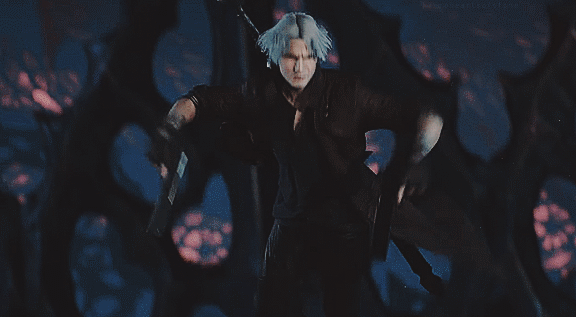
~ My next entry for the DMC WEEK, which is monster, cryptid, and Demon, featuring Dante!
~ Light warnings compared to DMC WEEK DAY 1. However, if you easily get disturbed or squeamish at the mention of blood, or nasty crawlies, then this fic is not for you. Please, proceed with caution. The "explicit language" warning is up but, other than that, this entry is made to be corny and a bit cheesy. Enjoy!
***
"Ten years, Dante! Ten years! And you still suck at Poker?!"
Dante winced and waved his opponent off, unable to withstand Patty's presence in his office.
Yes, the girl has just turned eighteen. Despite that, it didn't stop her from going back to Devil May Cry from time to time to annoy Dante. Well, mostly she would just watch her favorite shows on his little television. Sometimes, she would offer to clean his office for a price like how she used to. However, on rather special occasions where the teenager finds out about Dante's gigs, she would rile him up to no end to make him play Poker with her. And, by Jove, she always wins the game.
The girl was definitely right. Ten years of their unusual friendly relationship and Dante has yet to beat her in that card game. It might be because the girl has become even smarter than ever before due to Lady and Trish's influence, or Dante has just lost his fire with games such as this.
"Now, you owe me - "
"Whatever! Ugh,... " Dante went to his chair and collapsed on it, putting his feet up on the table and snatching the magazine before him.
"You sound like a sore loser." Patty answered as she went towards the little television and turned it to her favorite channel.
"Why don't you just go out with your buddies or boyfriend, huh?" Dante added as he grumpily turned another page of his magazine.
"Oh, jeez, Dante! Who are you? My dad?" Patty laughed as she comfortably settled on the floor. "For your information, I don't have a boyfriend. Don't need one because I can perfectly protect myself!"
"Sure."
"Oh, and now you have to take me out shopping! That's your punishment for losing, Dante."
The man brought his magazine down and threw deadly stares at the teenager who was always invading his personal space. "Is this your revenge for ditching you on that birthday party of yours?"
"Whoa, you can't be serious!" Patty turned away from the screen to raise an eyebrow at the Devil Hunter. "For that one, you'll have to give me a year's worth of your strawberry sundae!"
"I shouldn't have asked." Dante said and clicked his tongue, picking up his magazine once more and putting his focus back to it.
Patty snickered. She just enjoyed annoying Dante like that. The man was never really angry with her, and she honestly thought that he was the better company compared to most people her age, who knew nothing else other than sex and partying. She enjoyed hanging out with the Devil Hunter, and she couldn't imagine her life without her old friend, who always made her smile and laugh.
"Wow. Look at Ripley,... " Patty whispered in awe, her eyes entranced at the horror film being shown on the silver screen. "She's so badass, I wish I could be like her someday." She peeled her eyes off of Ripley and looked at her companion once more. "Hey, Dante!"
"What now?!"
"Take me on a mission some time."
Dante raised an eyebrow at her. "Absolutely not!"
"Aww, come on! I wanna see you become like Ripley!"
"Ripley?"
"Yeah! Wouldn't it be cool if you could say her most popular line from Alien?"
"And what is that line?"
"Get away from her, you bitch!" Patty recited the popular line with the most rugged tone of voice she could muster.
"Haha!" Dante laughed and brought his old magazine down, taking one slice of pizza from the box on his table and gobbling on it. "I have better lines than that!"
With furrowed eyebrows, Patty stood up, went towards Dante and took a slice of pepperoni special for herself. Taking a bite, she asked, "Like what?"
Dante chuckled and answered, "Jackpot!"
"That line again?!"
"That is loads better than Ripley's line! And I bet other cheap rip offs of Alien already had that line, it's gotten too old."
"Really?" Patty answered with much sarcasm.
Before Dante could even answer, the door violently opened, and a few moments later, a very sweaty and nervous - looking Morrison entered the shop.
"You could've at least knocked, Morrison!"
"Hey, what's wrong with Mr. Morrison?" Patty mused as she finished her pizza and went towards the man.
However, before Patty could even come close, Morrison stopped her in her tracks, holding up a trembling arm with his palm up.
"Don't - !" Morrison wheezed, clearly struggling with something. "Go near - !"
"You okay there, Morrison?" Dante, who just got off his chair, asked a moment later. And as a tasteless joke, he added, "Did an alien enter your body, or something - ?”
"It's,... CRAWLING!" All of a sudden, the poor broker yelled in agony as he collapsed on the floor, his hands taking hold of his left leg as if he was in deep, excruciating pain.
"Oh, my God!" Patty mumbled and was about to help the man when Dante stopped her from going closer to Morrison.
"Let me handle this." Dante said, kneeling next to Morrison. "Let me take a look at that, Morrison."
"It's,... CRAWLING! IT'S CRAWLING UNDER MY SKIN! I CAN FEEL IT!" Morrison howled, his sweat almost flooding his face.
"Shh! Shh! Relax,... " The Devil Hunter uttered the little words of encouragement that served as Morrison's only warning before his left pant was completely torn off from him, revealing a golf - ball sized thing underneath the part of the broker's skin where his pulsating purple veins became blaringly visible.
And he was right. The thing really was crawling.
And it was creeping up towards Morrison's upper thigh!
"It's like from Alien!" Patty shrieked in shock, stepping further away from the broker in fear of contact with whatever's inside Morrison.
"Patty, I need a string! Anything to tie Morrison's leg and stop this thing from moving!" Dante commanded like a general barking orders to a private officer.
"You mean a tourniquet?"
"Whatever! JUST MAKE IT QUICK!"
“Right!” Patty obliged as she ran to look for the thing.
"Okay, Morrison, I want you to relax. Breathe,... " Dante spoke as he took hold of the broker's leg, his left hand on his upper thigh, and his right hand near the ugly moving bulge. And he could definitely feel the thing struggling to get to the poor man's upper body. It's rather strong.
"HOW COULD I FUCKING RELAX?! THERE'S A THING IN MY BODY! I COULD FEEL IT CRAWLING - !"
"I know, I know. PATTY!"
"Here!" Patty handed Dante what looked like his telephone cord and he received this without any complain or hesitation, seeing the poor broker twitch and tremble with pain and fear. And with the cord, he proceeded to tie Morrison's upper thigh as tightly as he could, earning him a wide - eyed and terrified look from the broker.
"What are you doing?" Morrison nervously asked as he watched Dante secure the cord tied around his thigh. "WHAT THE HELL ARE YOU DOING?!"
"I'm trying to help you!" Dante howled in answer, trying his best to not get annoyed with Morrison. "Patty, get my knife on my drawer. And my whiskey bottle. Quick!"
The moment Morrison heard the words knife and whiskey, he felt a heavy weight on his chest. He lost his consciousness. However, despite that, the thing still tried to get past the cord tied by Dante.
"Here." Patty handed the knife and Dante wasted no time in pointing the blade at the thing. And the moment it felt the blade on the broker's skin, its movements became much more erratic, as if it knew that it's going to die. And as soon as the blade started cutting through the poor broker's flesh, the man's eyes snapped open and he let out an agonizing scream of pain that pierced through Dante and Patty's eardrums.
"Patty, give him the whiskey!"
"R - right!" The girl nervously answered as she opened the bottle with trembling hands and proceeded to make Morrison drink its contents. The liquor burned a path down his throat, making him a little numb. And yet he still felt it when Dante went on cutting his flesh.
"Morrison, you have to help us here!" Dante howled as his eardrums were, once again, assaulted by the broker's screams and curses of pain. "Do you want this thing out or NOT?!"
The man winced, almost crying in pain. "I DIDN'T SIGN UP FOR THIS!" He, then, snatched the bottle of whiskey from Patty's hands and downed all of its contents in one gulp. Throwing the bottle away, he screamed, "DO IT!"
"Don't cry now, Morrison!" Dante answered with a grin, and with one swift movement, he was able to make a clean and straight cut of his flesh. One painful stab with the blade mere seconds later and the thing was finally out. It landed on the carpet next to Dante's television just in time when the baby alien burst out from one of the characters’ chest.
Its bloody body pink, fleshy, and pulsing, with little hairs protruding from it, and its numerous little arachnid - like feet still moving and twitching, it almost looked like a Nidhogg, but much longer.
And even more disgusting.
And the moment the little alien howled from the man's chest in the screen, the unknown creature stood up, raising its nasty looking little mandibles in the air, and screeched with such unearthly sound, its yellow saliva coming out of its mouth.
"OH, GOD!" Patty let out in disgust at the creature that came out from Morrison's leg, making the broker faint.
"You're not welcome here, little fella!" Dante taunted as he took out his Ebony and Ivory, pointing them at the creature. "I'm afraid to say it's adios!"
Everything happened so fast. The creature launched itself in midair towards Dante, its mouth slicing and opening up the size of an unfurled umbrella, its pair of mandibles growing a few inches, ready to devour the Devil Hunter's head.
But, the man in red was much faster, and much more agile. With a few Ebony and Ivory rounds shot at the creature's mouth, the thing went down, dead and still somehow twitching like a swatted insect.
And the moment the creature stopped twitching, Patty and Dante heard a louder screech coming outside the building. The unknown noise went on for almost a minute, and when it finally stopped, they felt tremors on the ground as if something huge just moved and ran away.
"It's the Alien Queen!" Patty announced, amazed and frightened at the same time.
Dante hid the pair of guns and took out his most powerful weapon, the Rebellion. "Alright, kid, stay here and don't leave Morrison behind!"
"I told you! I'm no longer a kid!" The teen retorted behind Dante's back as the man went out to hunt the Alien Queen.
And, sure enough, the Devil Hunter found the much larger creature outside, towering like an Empusa Queen, looking twice as ugly as her,...
... and looking just as pissed as the Xenomorph alien Ripley has to defeat.
"You, uhh, got a thing for the broker or something?" Dante quipped with a smile, the thrill of a good fight starting to excite every fiber of his being. And with a swish and flair of the Rebellion, he beckoned the monster towards him with his finger. "Hate to say this but,...
... get away from Morrison, you bitch!"
***
The news about Morrison's near death experience at the hands of a new class of Demon they now call, "Xenomorph" ( named after the alien in the movie ), reached the others as soon as daybreak hit. With investigations conducted by Trish, Lady, Nero, V, and Vergil, they found out that the Xenomorph stalks its prey, and using its minions, the smaller versions of itself in the form and size of a small spider, it enters the prey by penetrating the skin, mostly from the lower torso, and staying there for at least a few more hours until the creature inside grows enough for it to be able to travel to the victim's brain. Further investigations also revealed that when the creature takes over the victim's brain, it would be able to control the person, bringing the unfortunate prey towards the Xenomorph's nest against their own free will, ready to be devoured by the Demon Queen, herself. More studies showed that the Xenomorph had other uses for the prey's body aside from her nourishment. It was said that she would also use the body as a "breeding ground", laying her eggs there and waiting for them to hatch. Then, these little Xenomorphs would consume the body from the inside, organs, fluid, and all, little by little, until such time when they are big enough and ready to come out.
But, of course, Dante and the rest prevented Morrison from knowing all this until he was well enough to handle any information of the thing that entered his body and almost killed him that one night.
And Patty? Let's just say she stopped watching sci - fi movies with aliens in it and went back to her old favorites, which were romcoms that Dante found utterly cheesy and corny.
***
@dmcweek
***
40 notes
·
View notes
Text
The ☠ JannaNick ☠ Issue
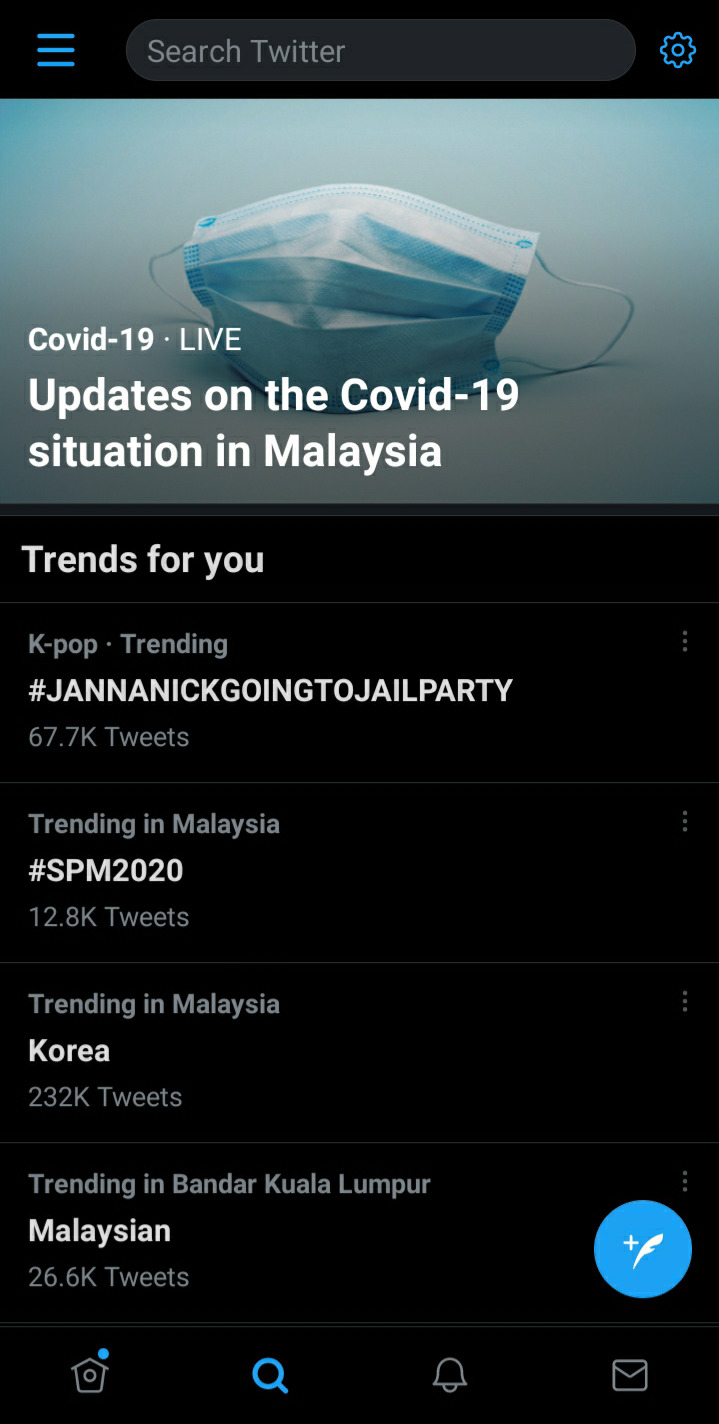
If you're wondering why #JANNANICKGOINGTOJAILPARTY is trending, Janna Nick is a mediocre celebrity in Malaysia who frequently create publicity stunt before she is due to release or is releasing a film she stars in or she is directing. Her acting is nothing considered top-tier, in fact it is painfully plain. However, this is my personal opinion on it. She is under fire for these 4 things:-
laughing at Jonghyun's passing (her story is shared on this tiktok)
she placed a promo on her directed movie, abt Blackpink Lisa and proceeds to reply to a comment Black oink oink (implying pig) see attached screenshot
she posted an 'apology' video that consists more of her promoting her movies she starred in, rather than the actual apology
on her instagram story (which is now private), she wrote "are all kpop fans like this?" – as in provocative
Tbh, this is what Malaysian kpop fans and or Army face everyday. It is very rare people here would openly admit to them liking kpop or BTS bc of how rude the entire community treats us. We are belittled, and often cursed at for our passion. If you have time, do further trend this hashtag, so this Janna Nick person can be held accountable for her words. Below I provide the screenshots of her IG post when it was public.
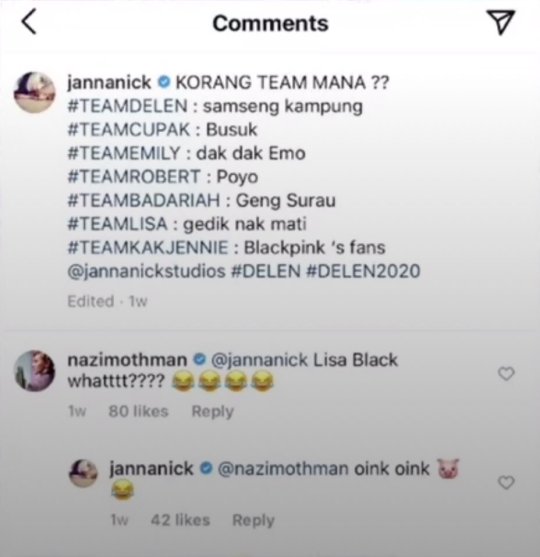
I disagree strongly for her to cackle so loudly about someone's sad passing. And I absolutely disagree her calling Lisa anything less than a human. I disagree her overall action and I think she has gone too far. I wrote this so that more people understood what is happening in Malaysia itself. Now, Janna has filed for a police report for online harassment.
But truly, she was the one who disturbed the peace. Everyone was minding their own busines and she decided to seek attention, to get clout. Hoping that they give her artistry some attention, but I believe it has backfired her. More artist have surfaced, apologizing for even being in her post. I don't think she'll learn how big this industry is from her little perfect world, unless we all show her. So lets go and show her, what her careless words could cost her.
■ FYI, she has ridiculed many people, and I think she just doesn't learn until she gets a good slap.
I am rarely this provocative, especially for kpop scene since I have only been supporting BTS, but I must remember BTS hailed from Kpop too, and kpop fans in general has been ridiculed and I've felt enough. Why other people are able to freely declare their love towards a type of sport, or an anime? Why can't kpop fans and Army do the same in this country? Why the double standard?
- written by a malaysian BTS Army who is fed up with the condescending tone of her nation when it comes to her boys -
5 notes
·
View notes
Text
I just watched Digimon Adventure: Last Evolution Kizuna
I’m writing this while my thoughts are fresh, so I just want to say these may not be my final thoughts on the film. Sometimes a film takes a little while to fully hit me, and this is just my thoughts immediately after watching said film.
Spoilers below, and a lot of text. I had a lot to say, sorry. I also apologize if its a little rambley, that’s kind of just how my brain works. Anyway...
Going into the film, I heard mixed reviews from various sources. From some, I heard the film was bad, from others, that it was good, but from most, that it was just okay. Nothing horrible, nothing great, but an okay film.
I’m not sure where I sit, presently, but perhaps I’ll come to an idea by the end of this review.
The film is very well put together. Unlike Tri, and arguably the last bit of Adventure and a good portion of Adventure 02, Last Evolution felt like a cohesive plot, beginning to end. It knew what it wanted to be, and it did it. There wasn’t a point where I felt confused about what was happening, and unlike Tri, it didn’t throw in random elements that went unexplained from 02 and proceed to leave them unexplained. I think the closest we get is a shot of Sora, alone, with her Digivice turned to stone with little explanation as to what happened, but honestly, I think we can all agree we know what was happening, just putting together the scenes the film showed us earlier of her and Piyomon together. She was hit first, and while the film didn’t hold our hand on her journey, her journey acted as a vehicle to drive us towards the ending of this film, and I appreciate it.
Every emotional scene hits, every action scene is well executed. The animation is fresh and new, but evokes the original style in a way that isn’t exact but certainly close enough. I think that was maybe a good choice, given the theme of the film itself.
In tone, it isn’t just a sad waterworks of a story the entire way through like Tri tried to be, but instead one loaded with emotional weight but enough pep and action to keep it feeling upbeat most of the time.
Overall, I liked watching this movie. I felt compelled to keep watching, and the opening scene of the film is just a love letter to Adventure as a whole. I honestly forgot it was only an hour and a half long as I got engaged with the story, as it never feels slow but every scene has weight and depth to it.
This film seems to care far more about the characters and drive of the story than Tri did, and by that I mean it didn’t try fixing all the flaws of the original, but simply let them rest. I think that might have been intentional, as this movie really felt like a ‘good bye’ to the series. The entire plot was about putting Adventure to rest, after all.
Now for the bad stuff.
This film really missed the chance to introduce Biomerging to the Adventure mythos via Taichi and Yamato, and while it gave that honor to the antagonist of the film, it didn’t seem to bother with the protagonists, probably because people seem to cringe when some fans even mention the concept of humans turning into Digimon.
Tamers gave us the concept of Biomerging to drive home the idea that a tamer and their Digimon partner had a bond beyond just friendship, and while perhaps ham-fisted, was a great visual metaphor. Last Evolution seemed to have a subtle buildup to this same core idea, but when push came to shove, we have Agumon and Gabumon becoming very humanoid versions of their Greymon and Garurumon forms respectively, meanwhile Taichi and Yamato just sit on their shoulders and pantomime their actions. I’m deeply curious if the initial idea was to biomerge them, but they bailed last second, but I digress.
This film also seems to continue the trend of just not caring about 02, but less so. While I will 100% give this film credit for not only including the 02 cast but also giving them a plot within the film, they didn’t really feel connected to the rest of the characters, not even towards Hikari or Takeru, who they spent the entire length of a show with. They just sort of feel like sidekicks to the Adventure cast, and not their own characters. We never even get Imperialdramon, despite Imperialdramon being shown to be at least on par with Omegamon in abilities, if not slightly surpassing them.
And, my biggest complaint, and one that probably isn’t a surprise: the time limit on having a Digimon partner makes little sense when looking at the rest of the mythos. In 02, we are shown the character of Oikawa, who’s entire narrative is a lifelong goal to go to the Digital World like him and his late best friend always dreamed of, and relies on children to aide him because he’s a grown man (if I recall correctly). From that alone, it seems like the ‘adults can’t have Digimon partners’ angle makes sense...except it doesn’t, because in the last bit of the show, Oikawa finally does make it to the Digital World, and what awaits him on the other side? His chosen Digimon partner, who waited this entire time to meet them, having dreamed of the day Oikawa would one day visit the Digital World.
While I suppose the ‘grown ups don’t have Digimon’ bit isn’t necessarily unsupported, it feels like an unnecessary plot device. The only saving grace I think it has, beyond making for an engaging and emotionally impactful film, is that several points of the film suggest this may not be the final say. Gennai makes an off handed comment about the possibility of delaying it, and there’s a constant message of “well see each other again.” While that may be just a hopeful thing to say in the face of sadness, much as one often says such things to a dying loved one, a producer of Last Evolution has stated that the film does, in fact, line up with the established Adventure canon, including the ending of 02, which specifically states that not only do Taichi and Yamato have their Digimon partners, but that everyone gets a Digimon partner.
If this film really is intended to be canon with the finale of 02, and that Agumon and Gabumon will one day return, then I feel this film simply cared more about its narrative of growing up and moving on than anything, and honestly...I don’t think that’s horrible, in retrospect. This film, as mentioned, had a very cohesive plot, and a very strong story it was trying to tell, and it did it well. At no point did I feel anything was done to punish the audience or throw a kink in the hose, if you will.
The worst aspects of Tri (which I keep comparing this film to, sorry), were its insistence to cut away from 02, correct things done wrong in the lore of Adventures past, and tell an ultimately disheartening and sad message of “sometimes bad things happen and it sucks and there’s no good side about it, but we must move on.” Last Evolution has a similar message of “sometimes bad things happen and it sucks,” but it goes on to say “but that doesn’t really matter, given all the good times we had, does it?” It doesn’t make you feel bad for having invested time into people and things you care about.
While Digimon Adventure: Last Evolution Kizuna was not perfect, and not the sendoff I wanted, it was okay. It was a love letter to the series, and it had a great deal of depth to it I’ve not seen in an Adventure story since my childhood, and at no point did it make me wish it hadn’t happened...and honestly I think that’s exactly perfect. That is exactly the message it was trying to convey.
At the end of the day, perhaps Agumon and Gabumon are gone, for now, but just because they left, it doesn’t mean they took their memory with them.
To quote the translated lyrics of Butterfly, by the late Koji Wada, which began each episode of the original Adventure:
“After an endless dream, in this miserable world
That's right, maybe not using common sense isn't so bad after all
Even with these awkward wings, dyed with images that seem to stay
I'm sure we can fly, on my love”
7 notes
·
View notes
Text
Serial Experiments Lain: A Guide to Proper Mindfucking Procedures
(I finished Lain! I originally wrote here “will jot down some thoughts, maybe I can write a full essay sometime later”, reviewing it now this is absolutely a full essay, so scratch that lets commit)
Serial Experiments Lain is a starring member of the pantheon of 90′s “mindfuck” anime, those shows that supposedly blow the mind with esoteric philosophy and trippy visuals. Current-me has frequently sallied against this notion, particularly the idea that any of these shows (or most any show) are that philosophically dense - the nature of television & film is such that they almost never are, which is normally a good thing. But young-me watched Lain around the same time I watched the original Ghost in the Shell film, and I had that halcyon experience for both: intriguing, but also on the border of incomprehensibility. As such I held little opinion of either of them, not trusting my hazy memories, until I saw them again much later. Ghost in the Shell, by the way, is a terrible, painfully boring film, precisely because it tries to be that philosophy-mindfuck concept. Which can work when you are young and stupid, but once you have read literally anything, anything at all, a single op-ed will do, about “AI and Identity” or the like its ideas are trite and shallow while it has sacrificed characterization, plot, and pacing in pursuit of that failed dream.
Lain on the other hand is a brilliant show that succeeds at that concept far better than media like GitS ever could precisely by not even trying to be that. The thematic foundation of Lain is actually quite simple; the openness & inter-connectivity of the internet is not just utilitarian but can offer a way of living that is seemingly brimming with unlimited freedom and emancipatory potential, but that promise is found fundamentally to be a hollow (ahem) shell, with reality being not only inescapable but desirably so. Or something like that? I mean maybe. Lain never spends that much time on answers, because those are boring; instead focusing on the actual experience of the titular Lain herself as she navigates these concepts. All of the content it throws out are lateral moves around this core, details to mull over as opposed to attempts to “go deeper”, which makes it not-that-hard to follow once you understand that is what is happening. There is even a scene where the, let’s say “villain”, tries to go full-philosophy on Lain: who is the real her? What is identity anyway? Plays that whole entire hand, and she replies:
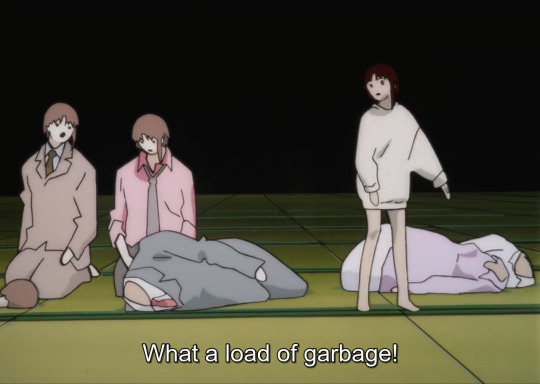
Which, given that those themes are absolutely the themes of GitS, made me laugh out loud and yes is 50% of why I am comparing them. I am certainly not saying that Lain doesn’t have philosophical concepts, it clearly does in spades. Stitching those concepts together into a grand thesis, however, is just not the focus.
What is Lain’s focus is mood, and I have never seen a show use so many varied animation concepts and narrative approaches all towards capturing a singular mood; that of the free-wheeling hacker-for-truth aesthetic of the early internet. It is of course famously filled with glitchy shots of Lain flickering on CRT monitors and horror-shadowy power lines, damn does it have so many shots of power lines. But that is covered ground - instead I want to note how often the narrative approach itself just goes off the walls in service of its goals. Episode 9 is the peak of that approach, where scattered throughout the episode is a fully-fledged documentary that starts with the Roswell incident, which it then admits is fake, nevermind! before pivoting to discourse about Schumann Resonances and the Earth as a decentralized Neural Net and...

Just a screenshot from an anime here folks! Vannevar Bush better have a Danbooru tag
All of this information is “true” by the way, as in real concepts and thinkers and crackpot ideas...until the end, when suddenly its someone from Tachibana Labs adding Schumann Resonance Integration to the 6th Protocol and wait-a-second that’s the show-canon, Tachibana Labs isn't real. As a ~youth~ you might be foolish enough to try to figure out how say ELF bands might be critical to understanding the plot of Lain, which is a classic “philosophy mindfuck” mistake; its all bullshit, the ideas only matter in the most loose way that does not require understanding them. Yet, this is *exactly* what that early hacker internet felt like; crazy ideas being stitched together from low-pixel edited docu-footage repurposed to utopian futures or secret conspiracies, and by sliding this stream-of-consciousness braindump right into the canon of the show it makes Lain feel like a perfect simulacra of that age. To spend any amount of the runtime of an episode on this and to actually pull it off is queering the madness/genius binary in the hottest way.
The reason Lain can pull this off is its other source of strength I alluded too - all of these visual elements are in service of a very human story, that of Lain trying to figure out her place in the world. And this arc hits one of my sweet spots for media, what I have called the “multifaceted arc” in the past, where instead of a show having multiple independent arcs for characters it instead has one seemingly-completed arc that proceeds to be refracted, challenged,and altered over the run of a show. I mentioned in my previous Lain essay how the show was using the visual language of exposed skin to communicate Lain’s digital emancipation, becoming Lain of the Wired. In those early episodes that is what is happening, and this process peaks around the halfway point with a confident, powerful Lain. She spends much of episode 6 looking like some variation of this:
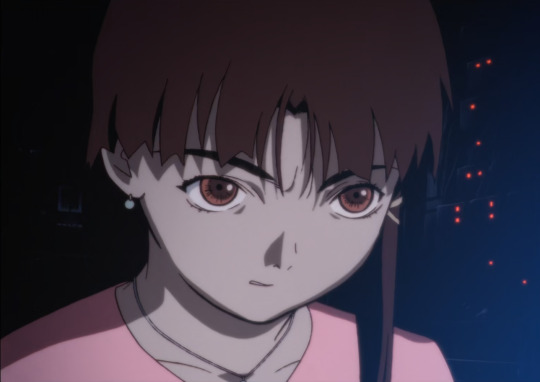
Total badass. That confidence and power then proceeds to be abused, manipulated, revealed as a false identity, and then stripped away over the latter half of the show - being Lain of the Wired turns out to be a curse as much as a blessing, and for the very human reasons of the connections to real people she loses through that process. This emotional core does an amazing job of keeping you grounded - in the same episode as that conspiracy documentary, Lain has her first kiss! (Its a bit of a dud, but still). And by the end of the show she is at the apogee of her digital empowerment, and also riddled with despair, loneliness, and in desperate need of help, looking like this:

Note the withdrawn pose and the positioning of Lain backgrounded and way below her friend in the frame, to imply a state of weakness despite her capabilities. That is some classic visual language by the way: no crazy shot effects, no weird narrative devices, just straightforward emotional communication. Lain spends 50% of its runtime going full avant garde, but never (okay, rarely) lets that overwhelm its arc, and threads the needle to make that arc one of the deeper and more moving arcs I've seen in a show.
Serial Experiments Lain is far from perfect, despite all the praise I just put on it; Episode 6 for example has some dumb midichlorian-style “you are trying to explain something no one needs an explanation for” plot, and half of the crazy visual effects are compensating for the fact that its budget was like 10 dollars. But it peaks far exceed its valleys, and I am exceedingly happy to have watched it; I have always struggled to name my “Number 5″ on my top 5 Anime list with a lot of contenders for the slot, but Lain might have just snagged the title.
(Which would make my top 5 list *entirely* composed of anime from the second half of the 90′s, and not due to nostalgia as I only saw the majority of them in the past few years. Certainly a question worth answering, but for another time...)
#serial experiment lain#executive dysfunction strikes again#but even though this essay is a bit unpolished I still like it#essay
29 notes
·
View notes
Text
Is Dream of The Endless a Disney Princess?
The following is a joke post based on the Disney Princess “check list” from Wreck-it-Ralph 2.
I have put a marker where you can skip my preample / rant:
______________________________________________________
Before I proceed with this check list, let me first say that i feel this list, in Disney’s effort to poke fun of itself in Wreck-it Ralph 2, goes too far in diminishing the characters portrayed within it.
A lot of the tropes tied to this check list are dismissive of the classic stories and seem to have been conceived by those who not only never really read the fairy tales, but also never watched the Disney films that they dismiss out of hand.
For example: Disney’s Snow White wasn’t kissed by some random stranger who kisses corpses in the woods. That prince had met her at the start of the film. And Disney had even published 1930s comics of their interactions where she affectionately nicknamed him “Bucket head.” The prince was merely trying to give her a goodbye kiss, as is still a custom in many places.
Ariel did not give up her voice merely for a prince. The little Mermaid had wanted to be human before she ever saw Eric. She sang “Part of your world” before she ever knew him. She always felt out of place and longed to have a human body. It’s strange how modern audiences have so eagerly latched on to denouncing Ariel for wanting to be human and out-right ignoring that she had wanted it before she even saw Eric.
(Yes, I know the tragedy of the Hans Christian Anderson version. I’m speaking only of the Disney version here.)
Belle did not have Stockholm Syndrome. It’s a stupid joke that some people on the Internet started to take seriously. She has none of the actual symptoms of Stockholm syndrome. and in fact The Beast shows signs of lima syndrome, the literal opposite of Stockholm syndrome . It’s when the captor starts to sympathize and feel for the captive and ultimately releases them for this reason. For The Beast this could be taken as “No longer a douche syndrome” but there are ways in which lima syndrome could be bad. Such as when a certain psychiatrist, Doctor Quinzell released The Joker from Arkham Asylum.
Those complaining about Sleeping Beauty make a big deal about asking consent before kissing someone and yet that was literally the only way to lift the curse. How do you get permission in that situation? Enter her dreams to ask? She had met that prince in the woods earlier and was clearly in love with him.
And finally, poor Cinderella. Victim of years of abuse and yet modern audiences shame her for just wanting one night off to be happy and free and remember. It’s as if an entire generation selectively forgets how difficult it is for many people to escape abusive situations. She had been virtually enslaved since childhood. She was afraid of her abusers and yet somehow modern viewers shame the character for this. Those that complain about Cinderella treat her like she diminishes feminism just for having suffered abuses.
She didn’t wait around for a prince to rescue her. She didn’t expect to be rescued. Nor did she expect to even meet the prince. She hadn’t realized it was the prince she met at the ball until after the fact.
It’s also funny how people fixate on how the prince didn’t seem to know what she looked like. They don’t realize that the implication is he was more attracted to her personality, that they had spent hours dancing and talking at the ball. And it was the personality he was attracted to. Yet somehow the fact that he didn’t focus on her appearance is a shaming point.
And yes, I know that in the French version that Disney was adapting, the ball actually lasted three nights, and each night she fled at midnight and the prince tried to stop her by having his men pour pitch on the stairs. That’s how she managed to lose a perfectly fitted shoe in the fairy tale.
________________________________________________
And now on with the fun...
The Wreck-it-Ralph Disney Princess check list:
1. Do you have Magic Hair?
Hmm... based on the fact that he never seems to need hairspray I’d say yes.

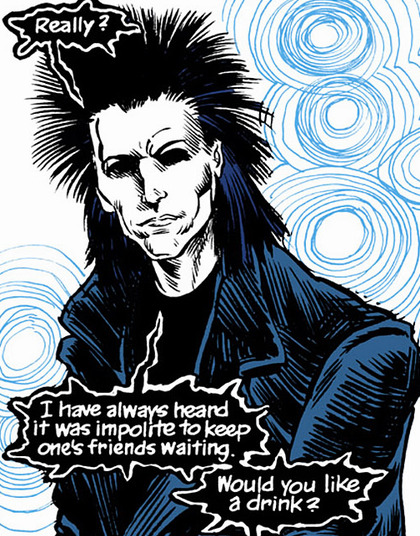
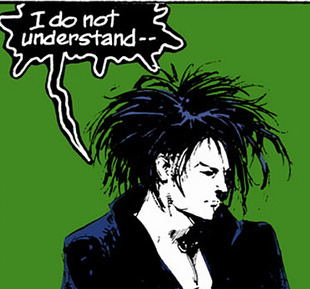
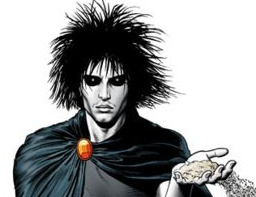
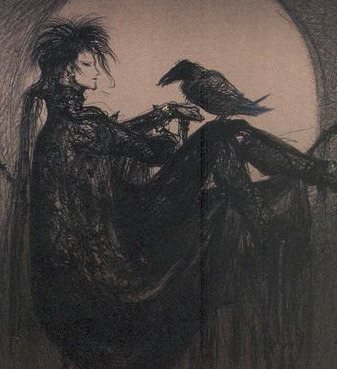
2. Do you have Magic Hands?
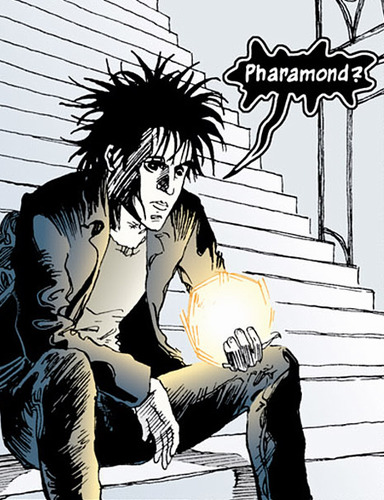
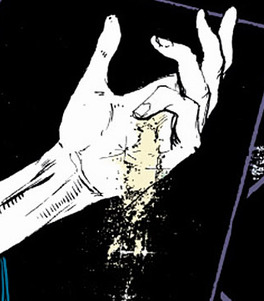
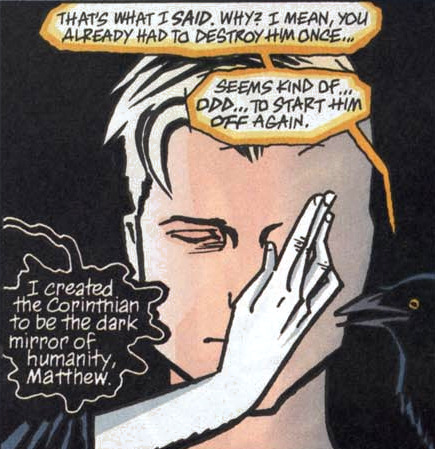
That’s a definite yes..
3. Do Animals Talk to you?
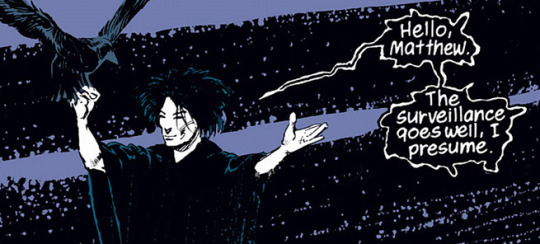
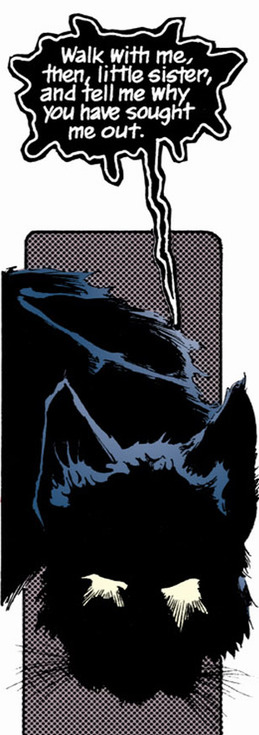
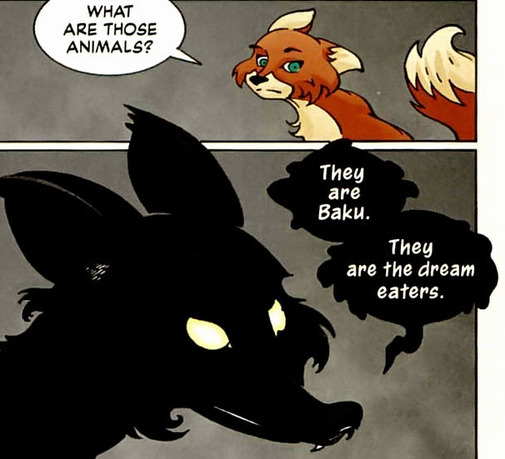
Another absolutely yes.
4. Were you poisoned?
I’m cheating a bit with this one since it happened to Daniel in the current version of The Dreaming.
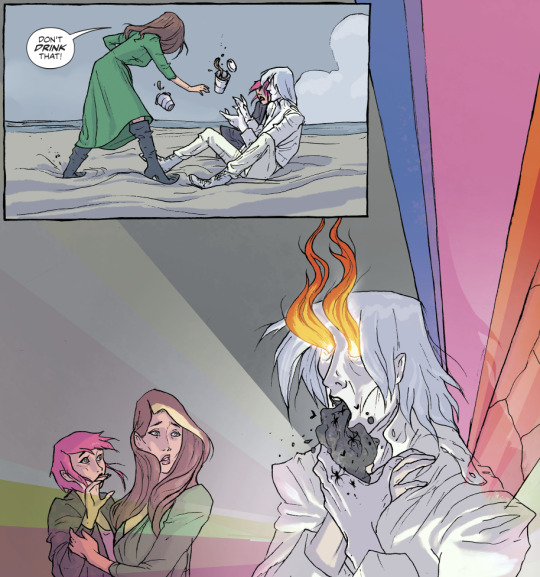
5. Were you cursed?
This is also from the latest version of The Dreaming.
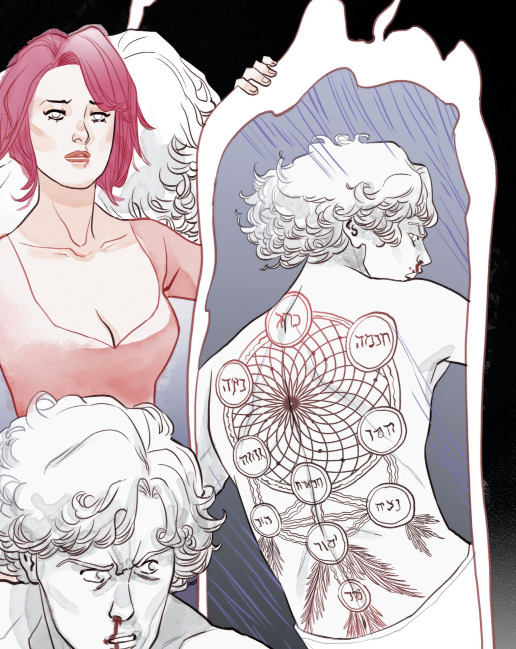
There’s also the fact that terrible things tend to happen when either Daniel or Morpheus fall in love with mortals.
6. Were you kidnapped or enslaved?
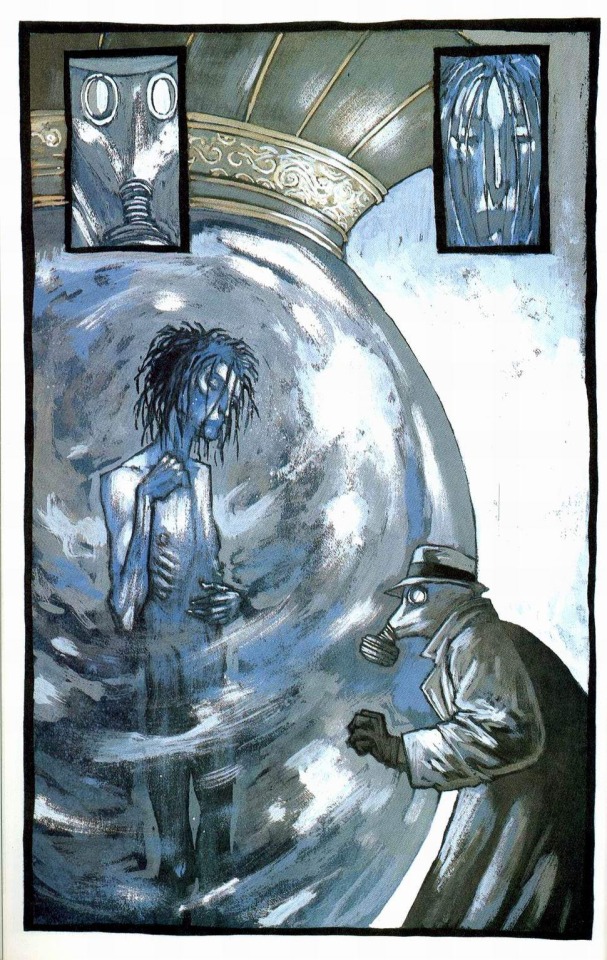

7. Do people assume All your Problems got Solved because a Big Strong Man showed up?
Well, not quite a big strong man but...
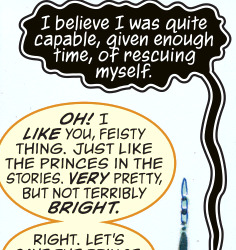
So by this criteria...
Yes. Yes, Dream of The Endless is a Disney Princess. :-P
There you go, @bazpik your question is now answered.
#The Dreaming#The Sandman#Neil Gaiman#Neil Gaiman's The Sandman#Morpheus#Dream of The Endless#Daniel Hall#Disney#Disney Princesses#Princesses
56 notes
·
View notes